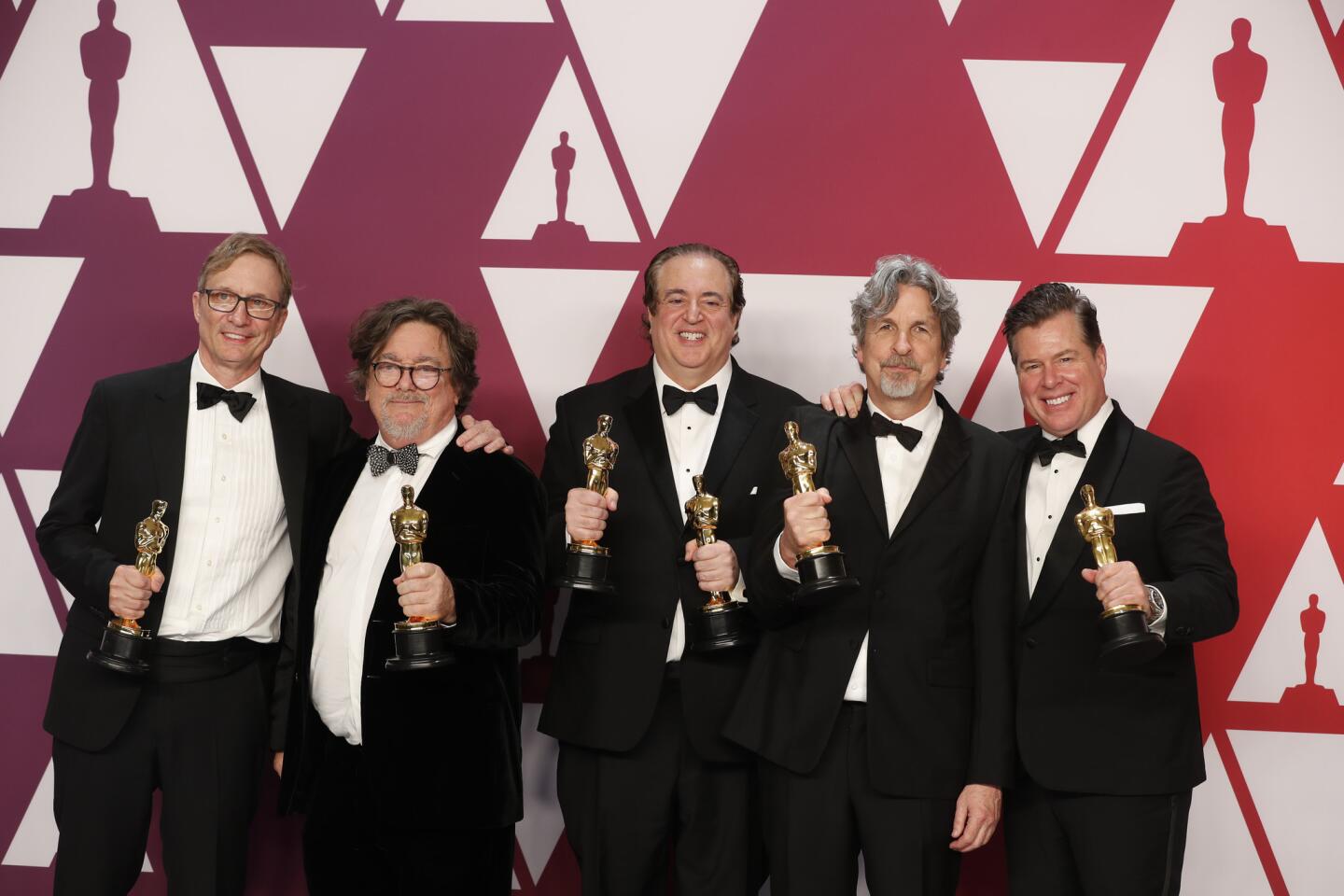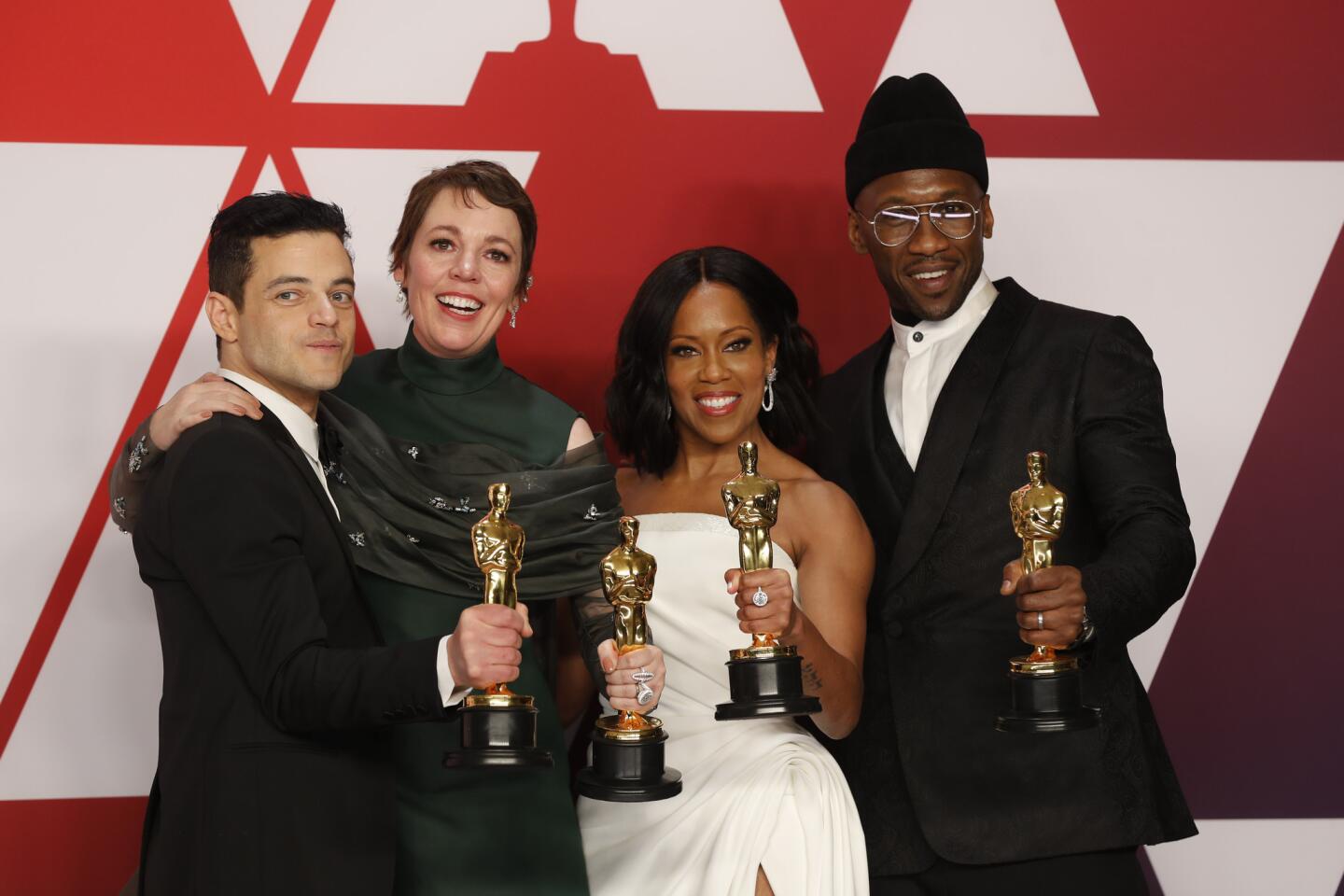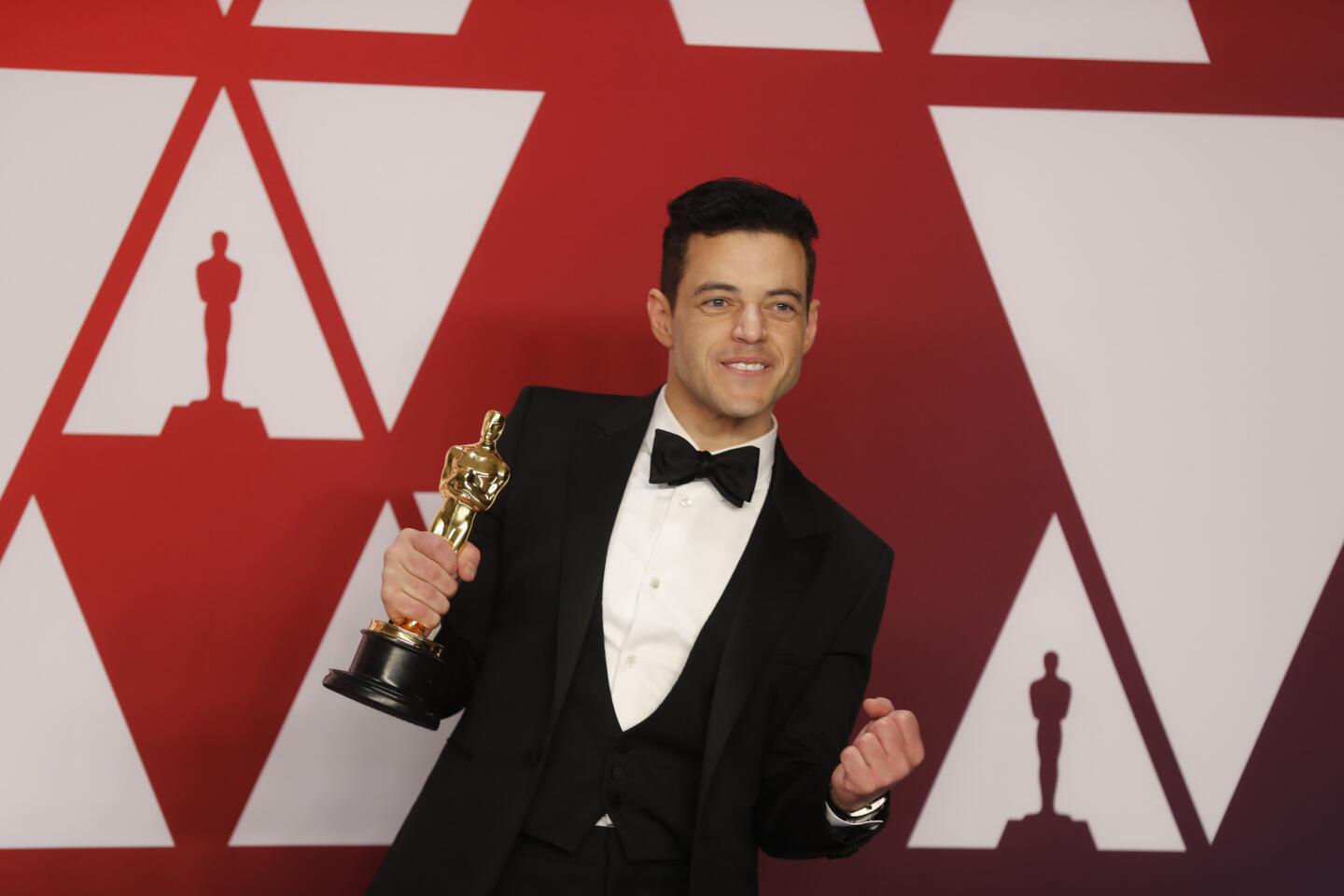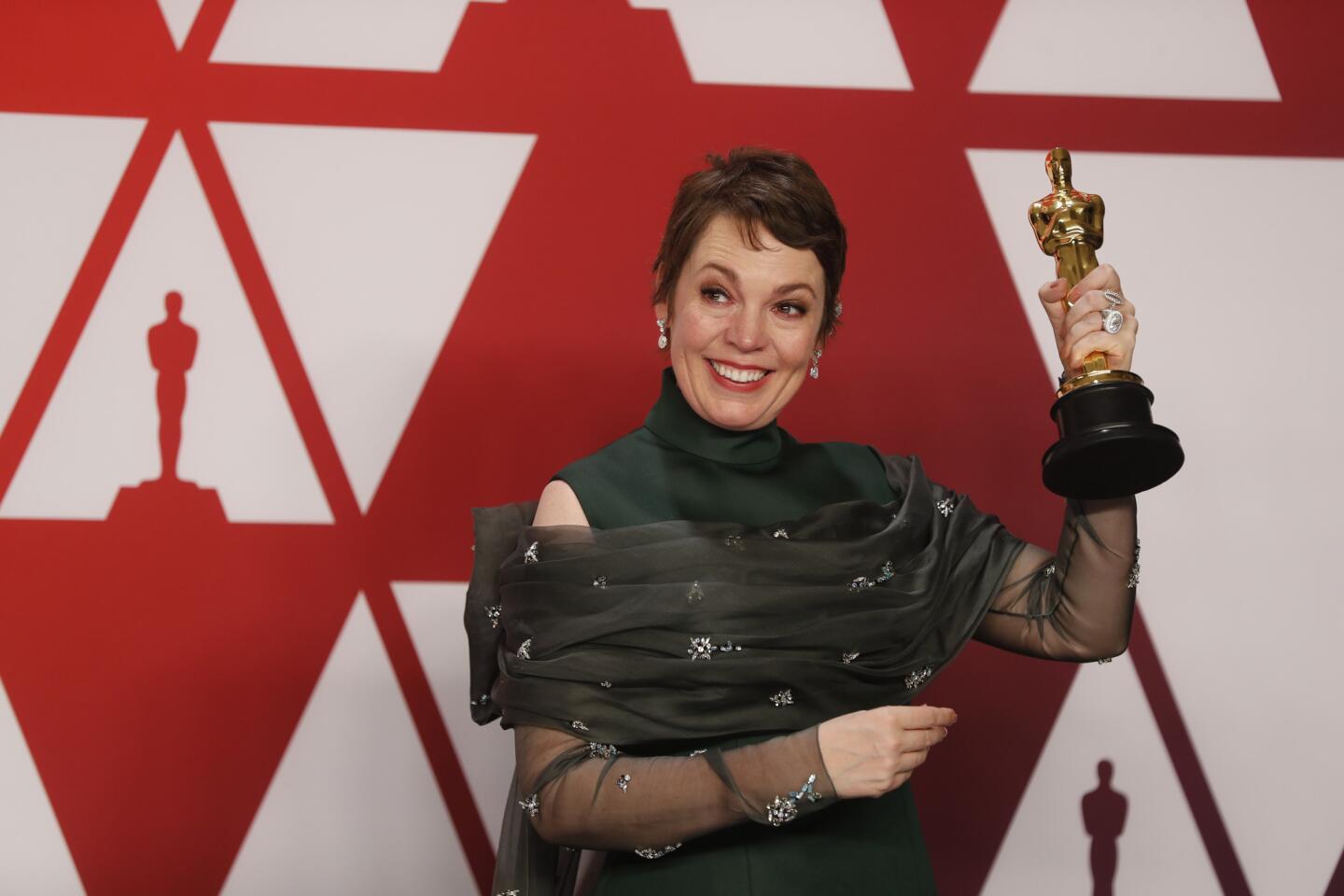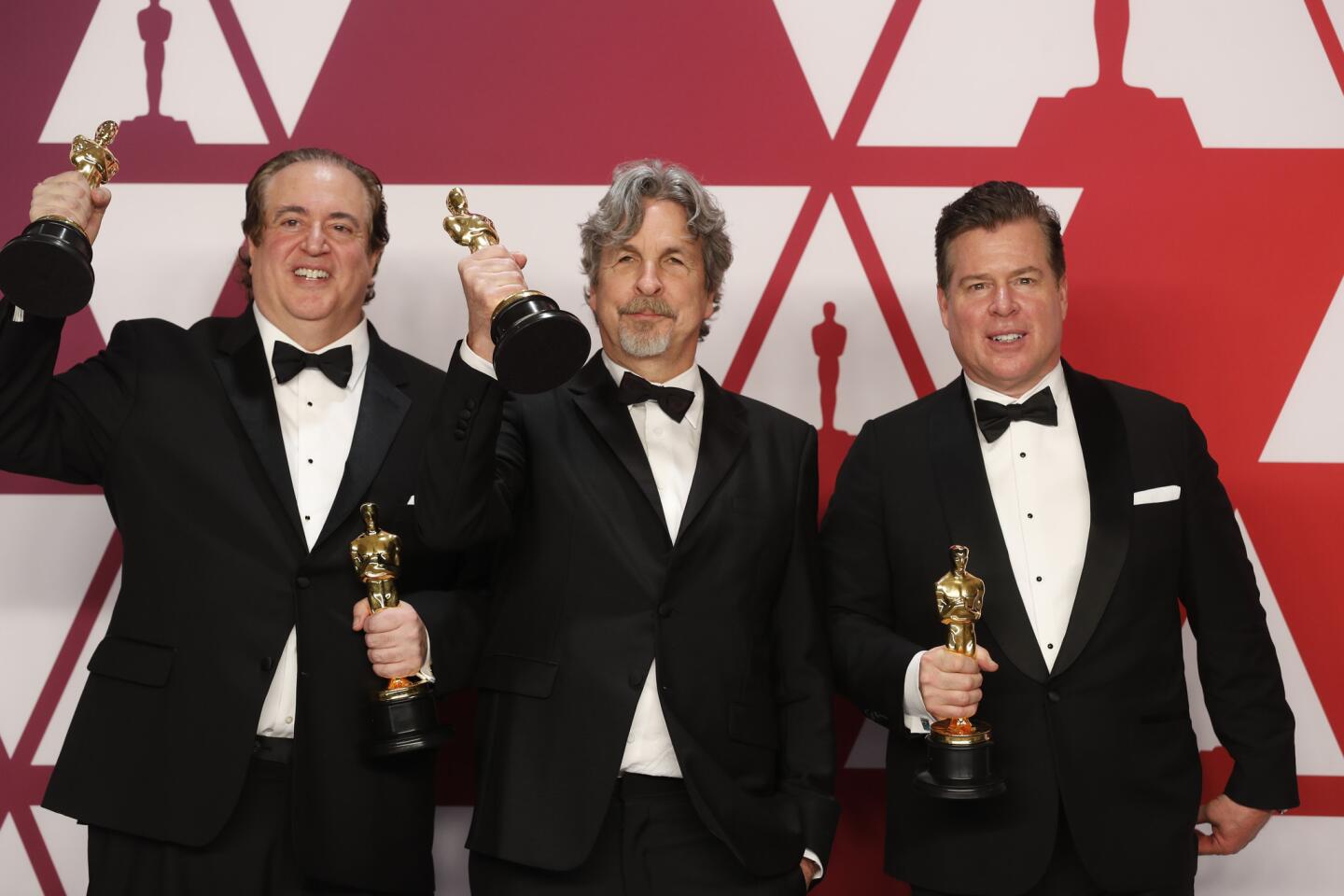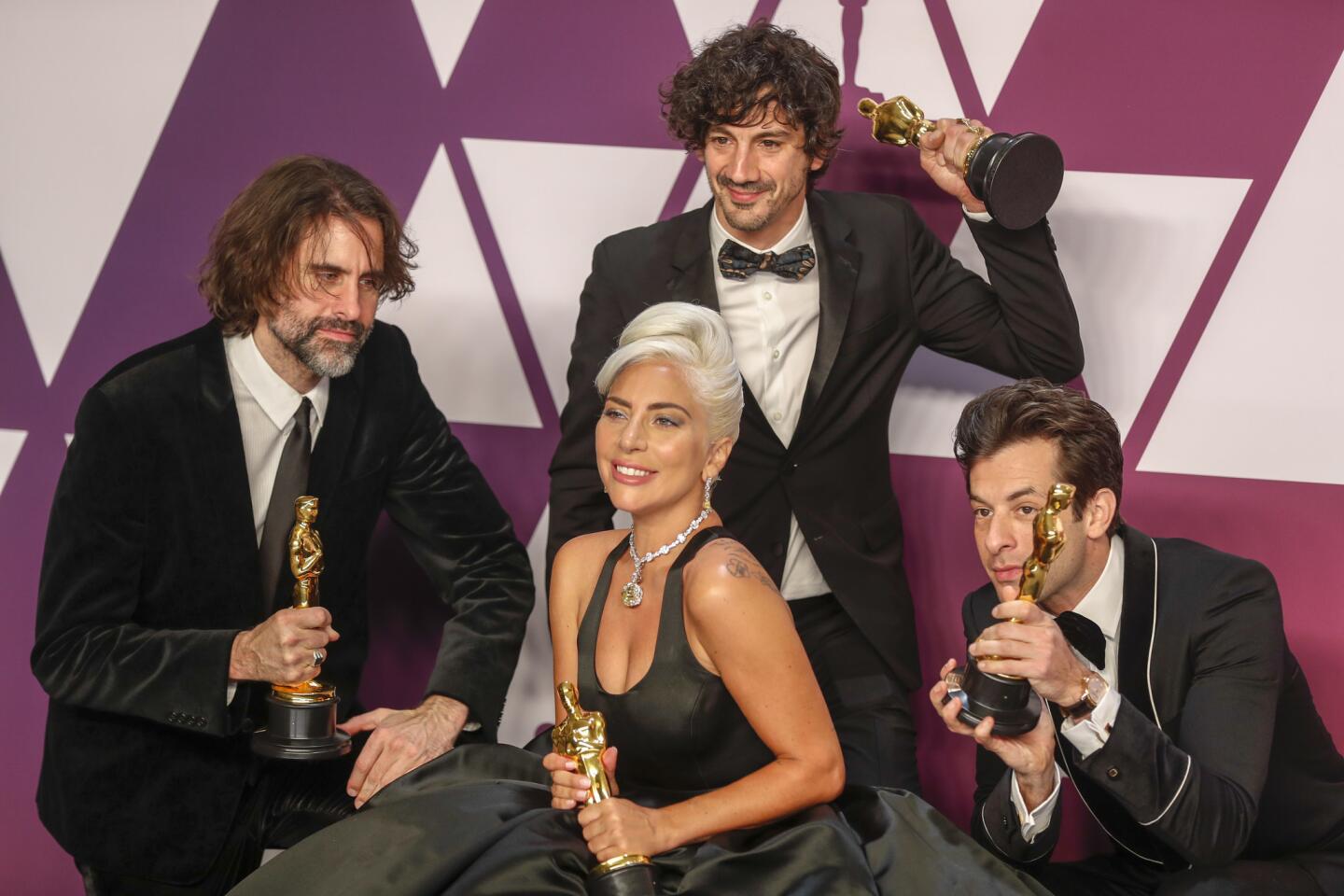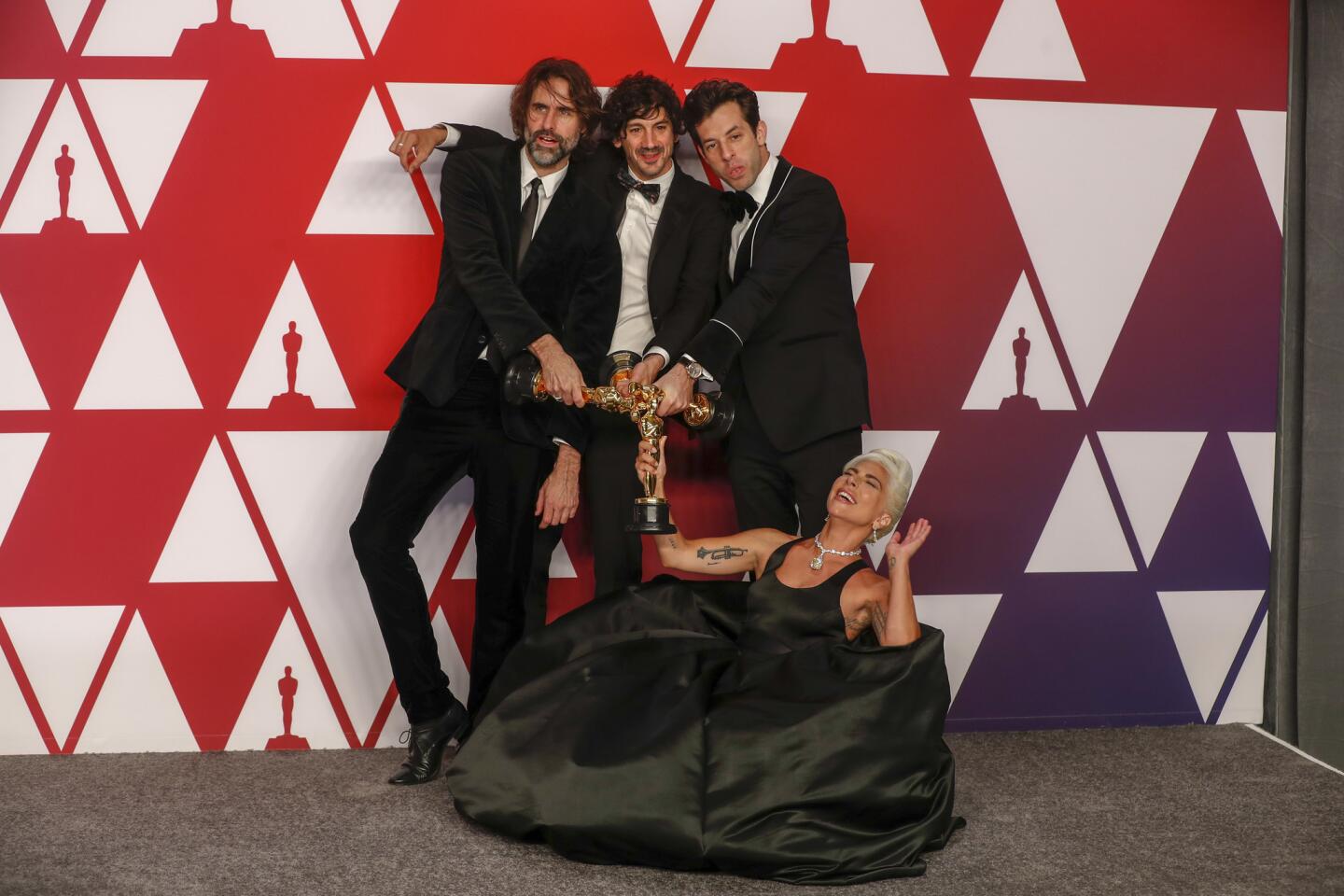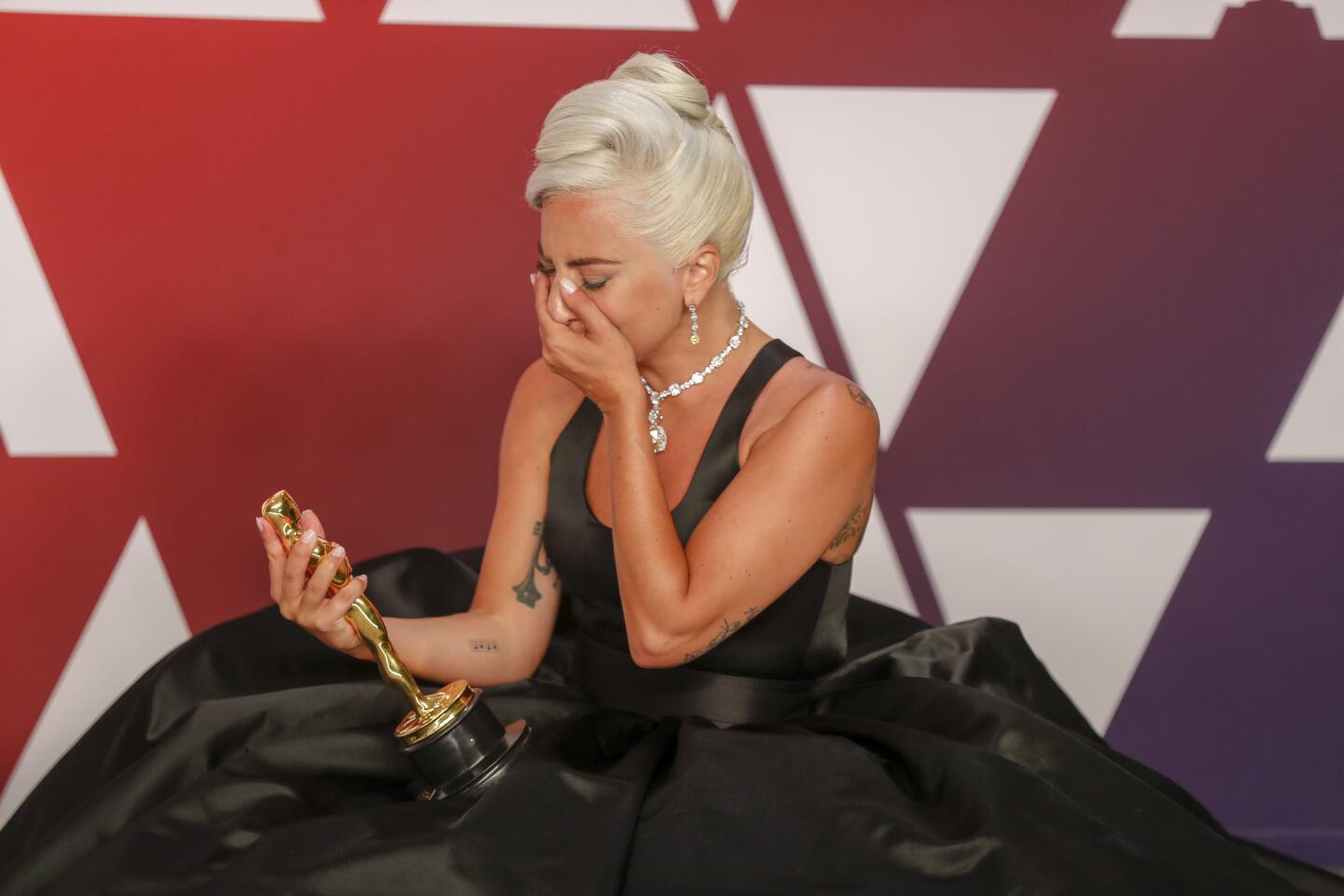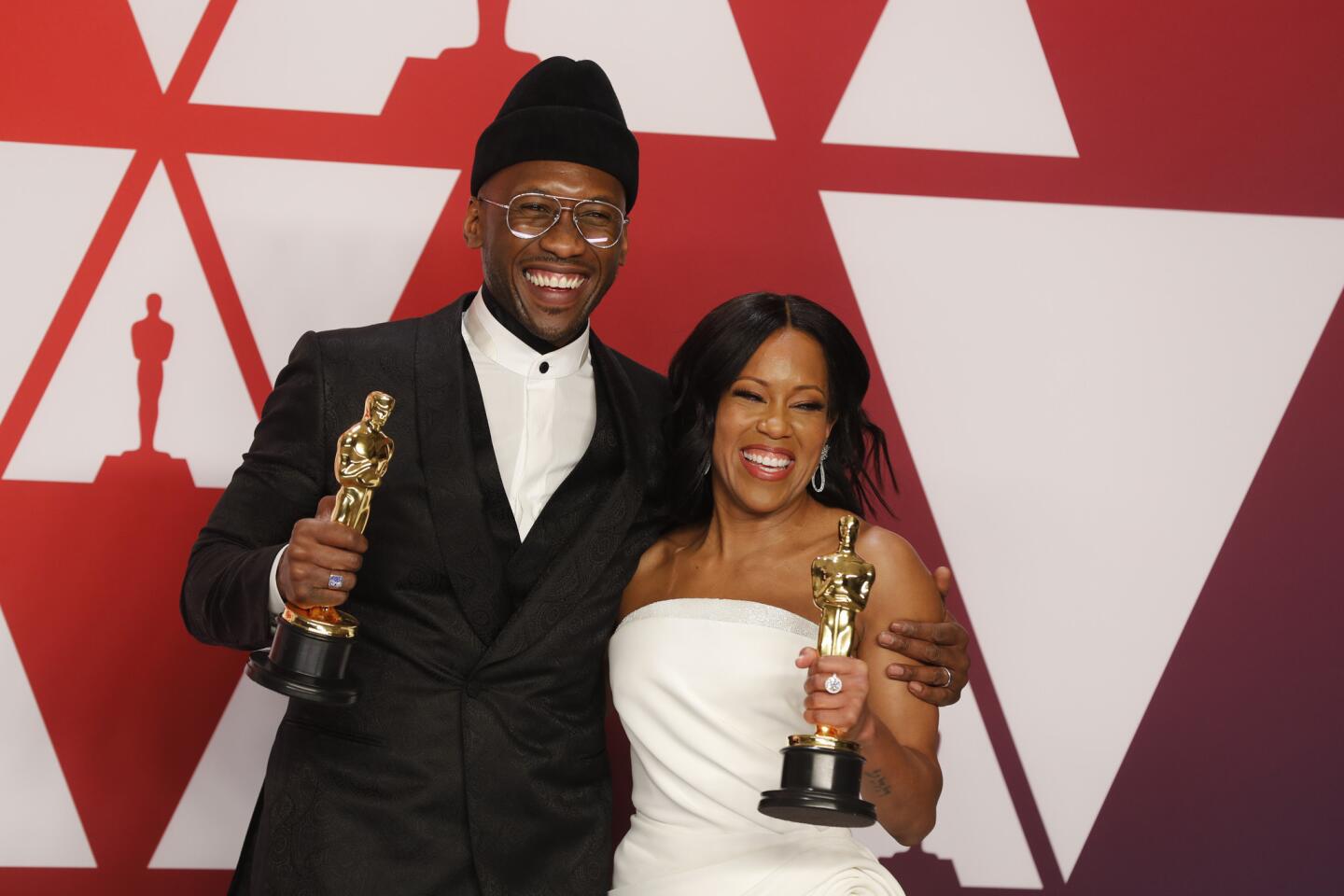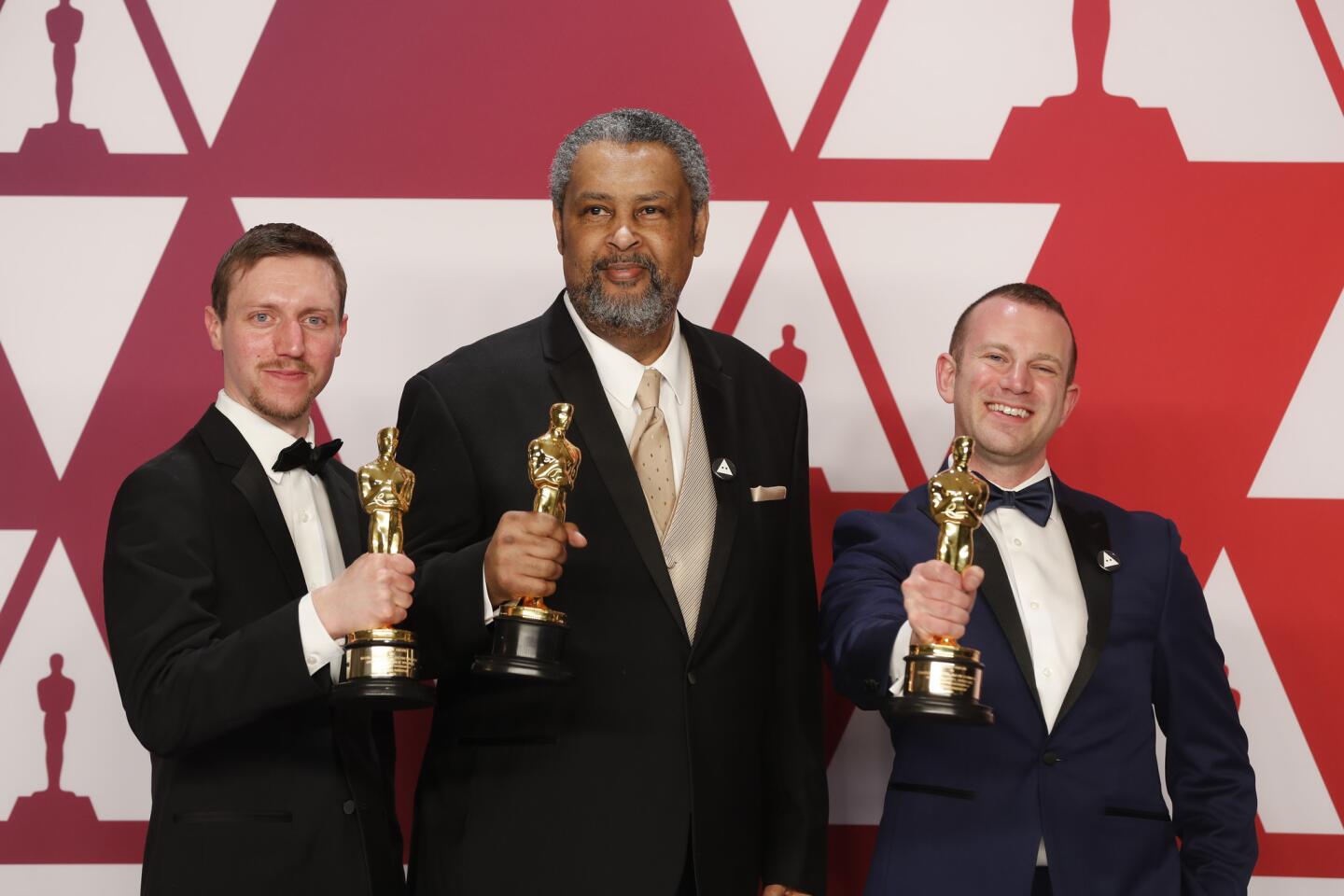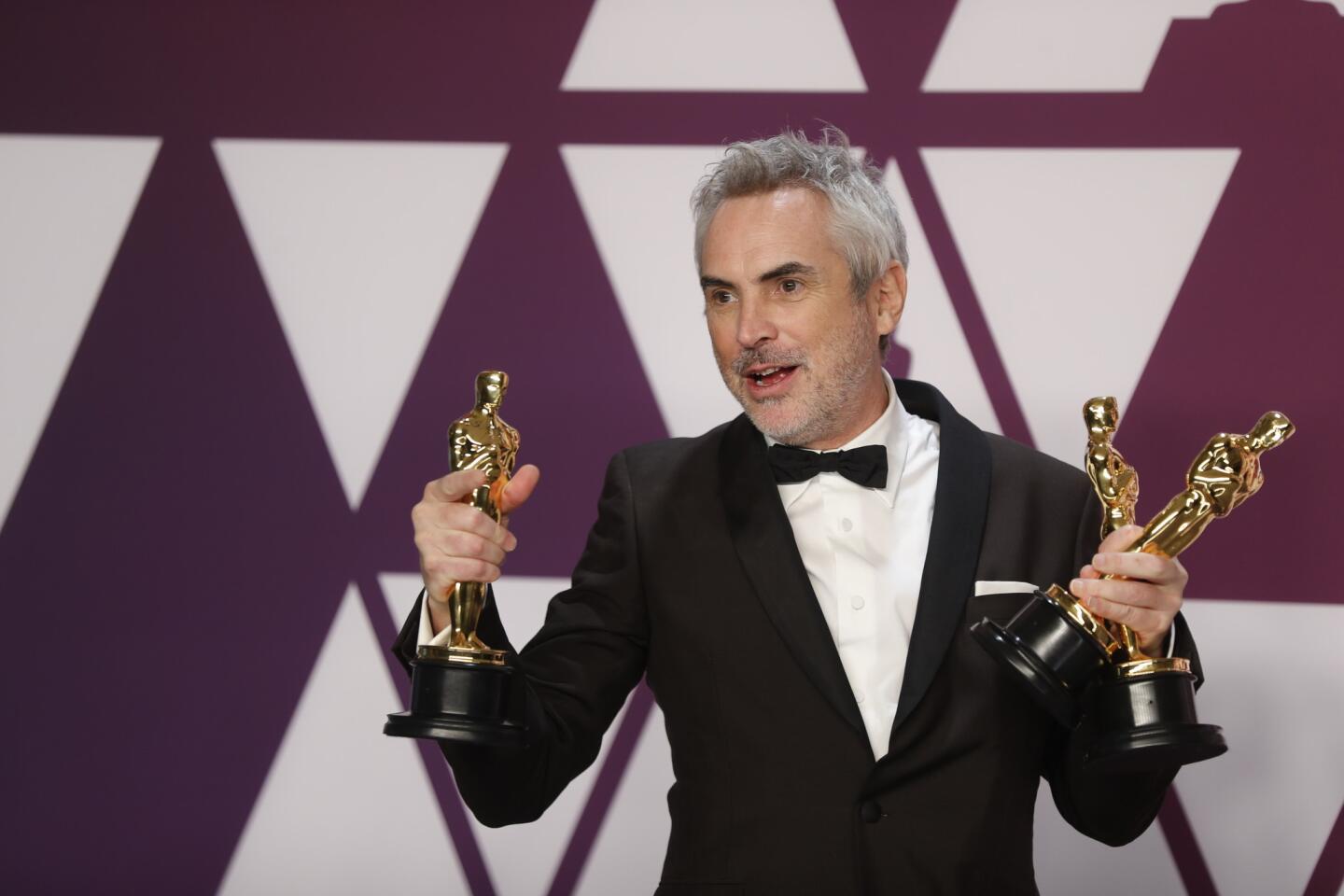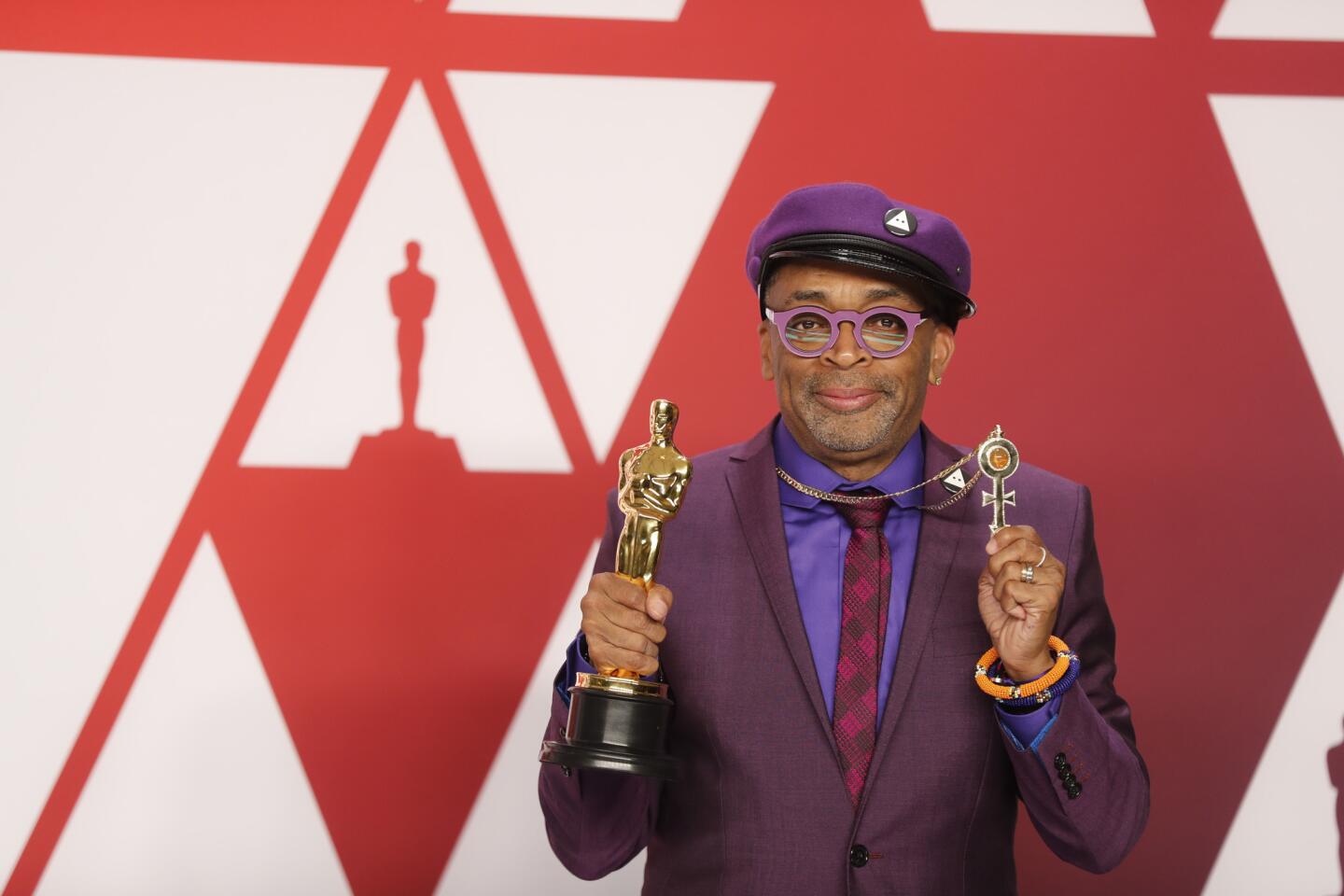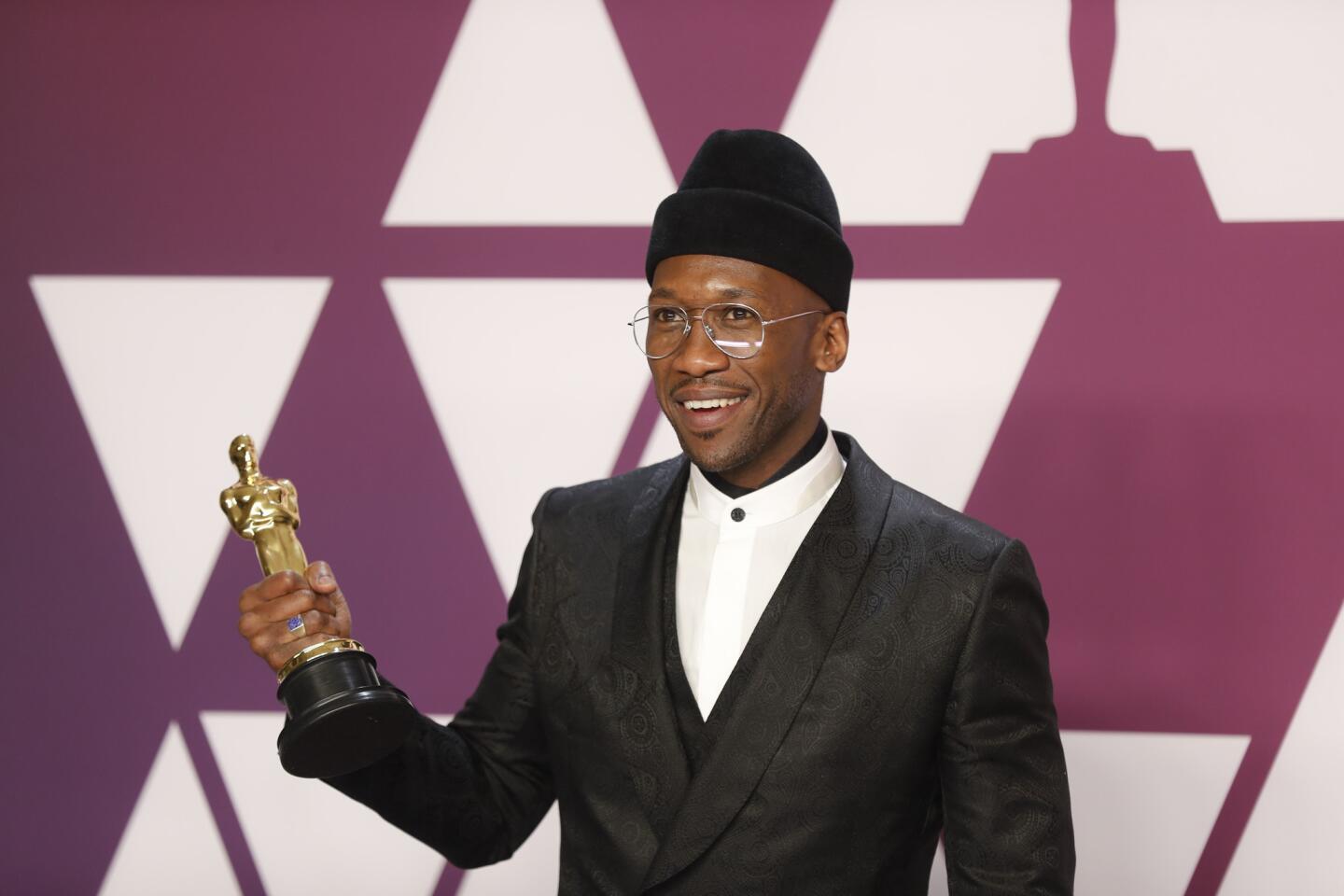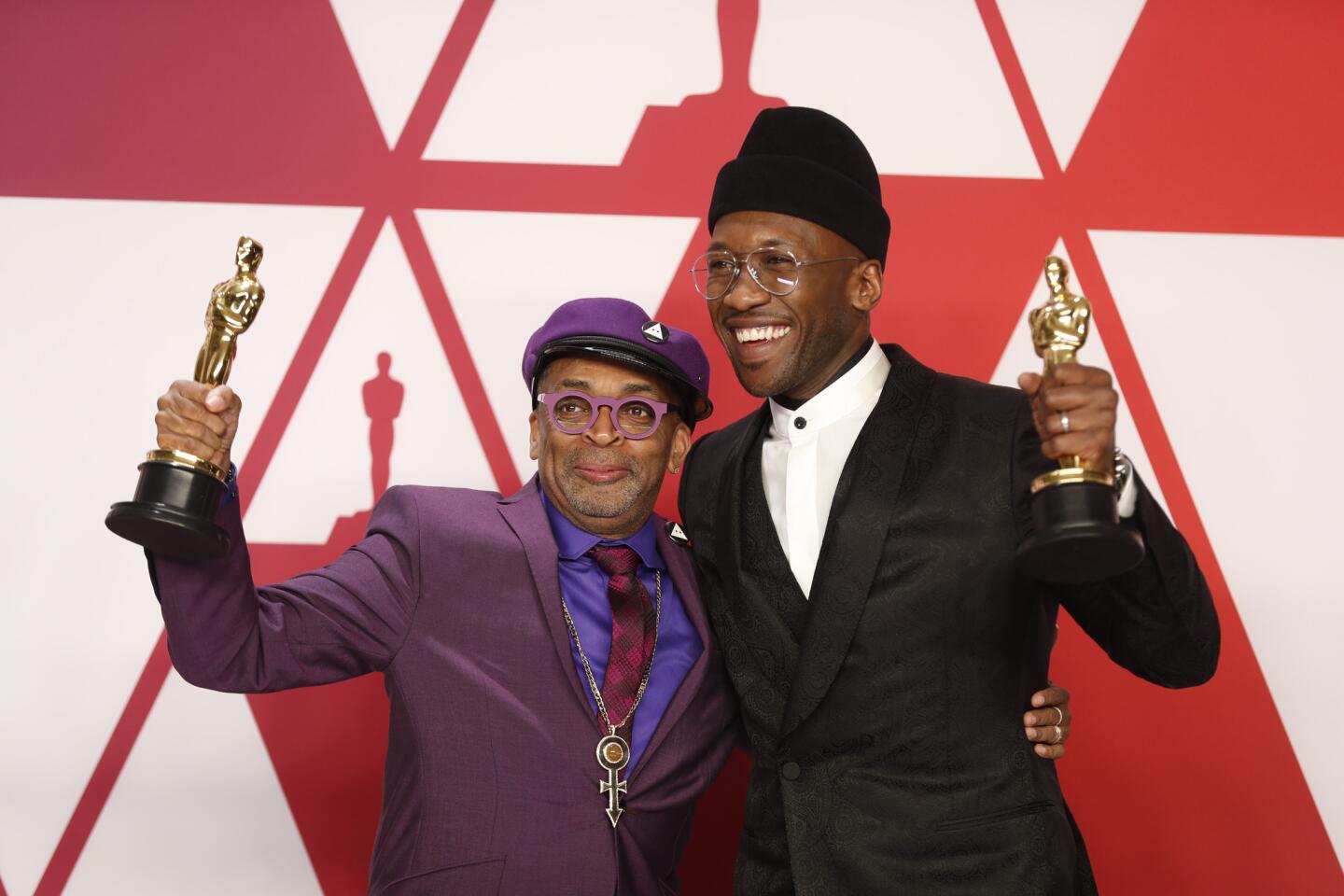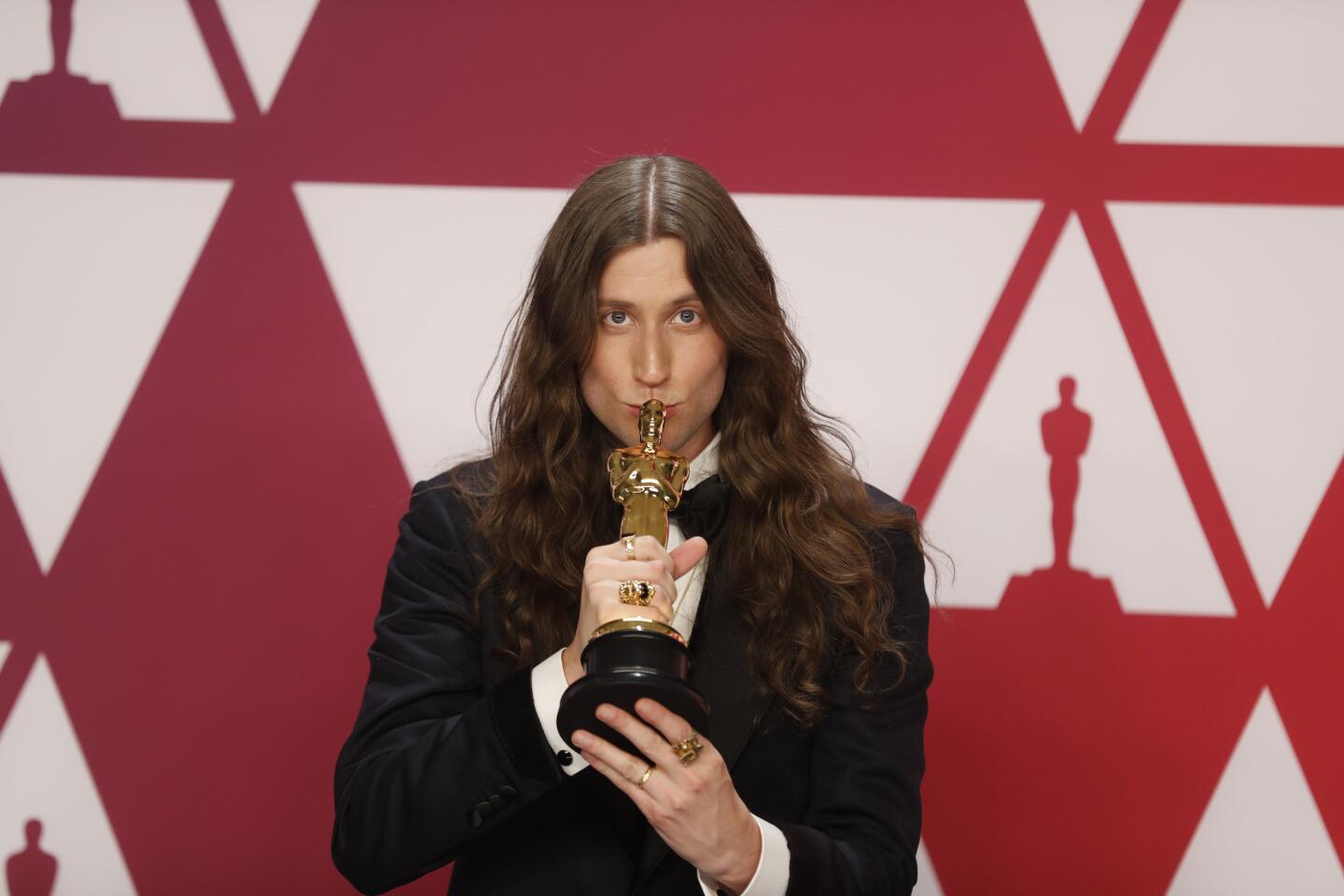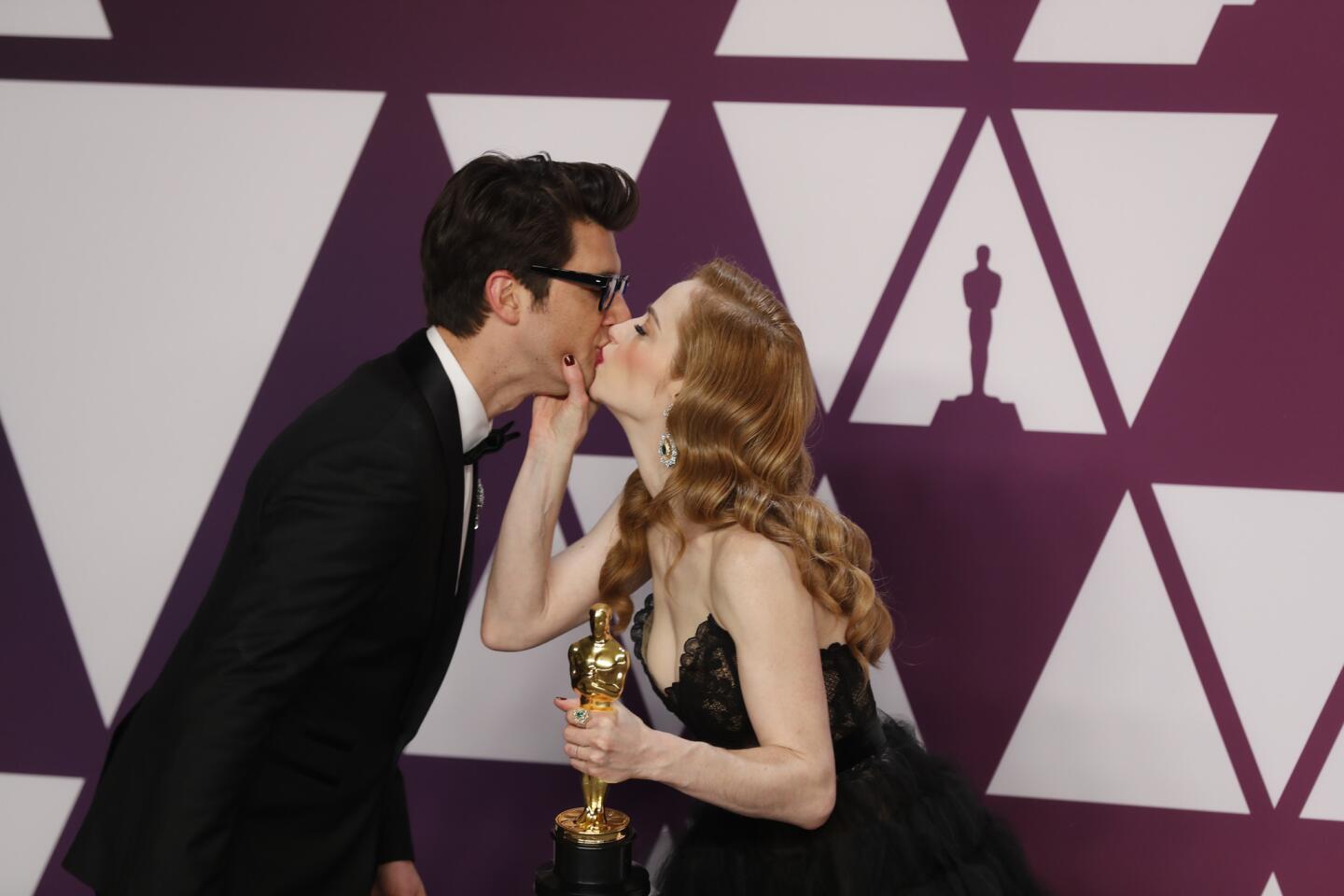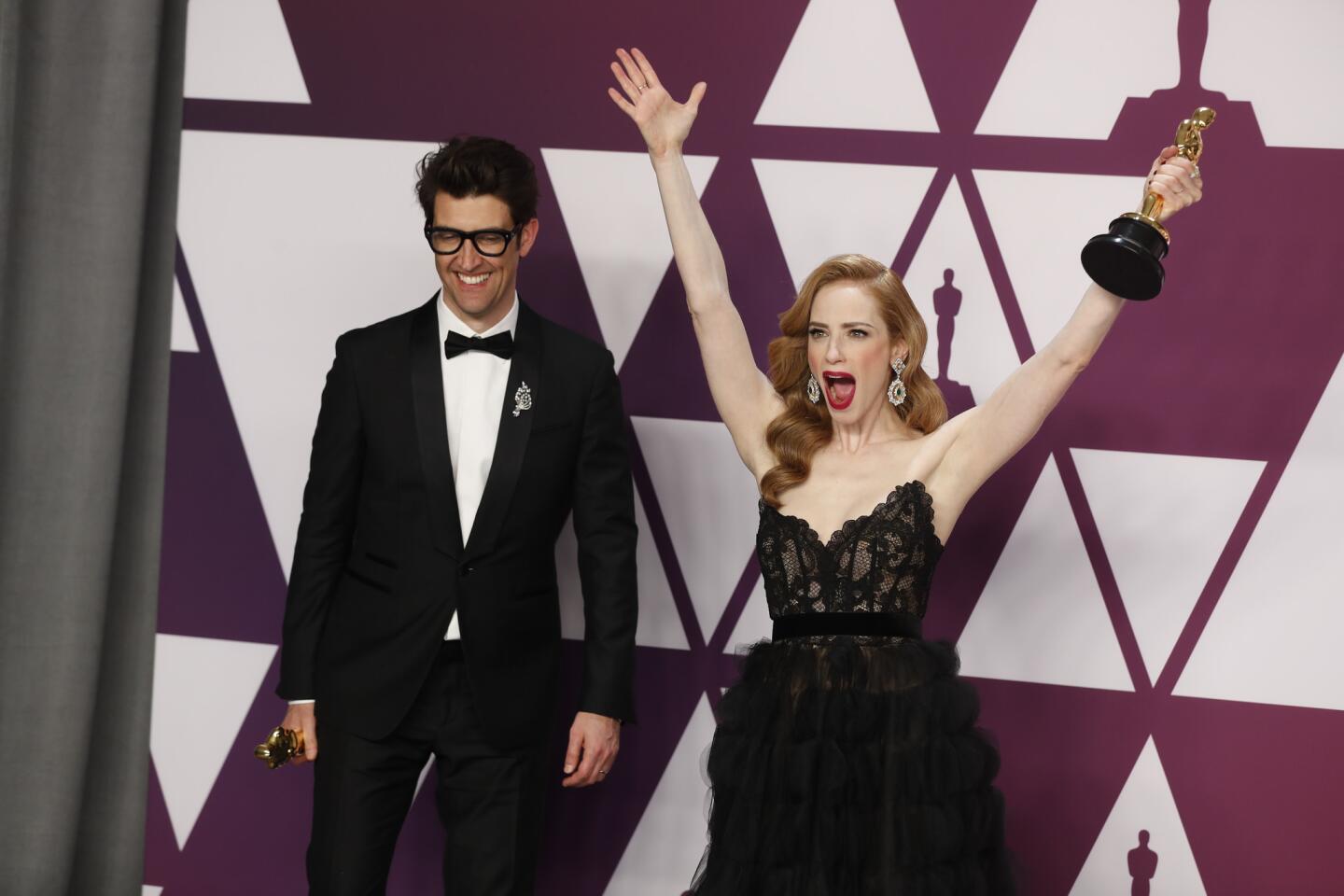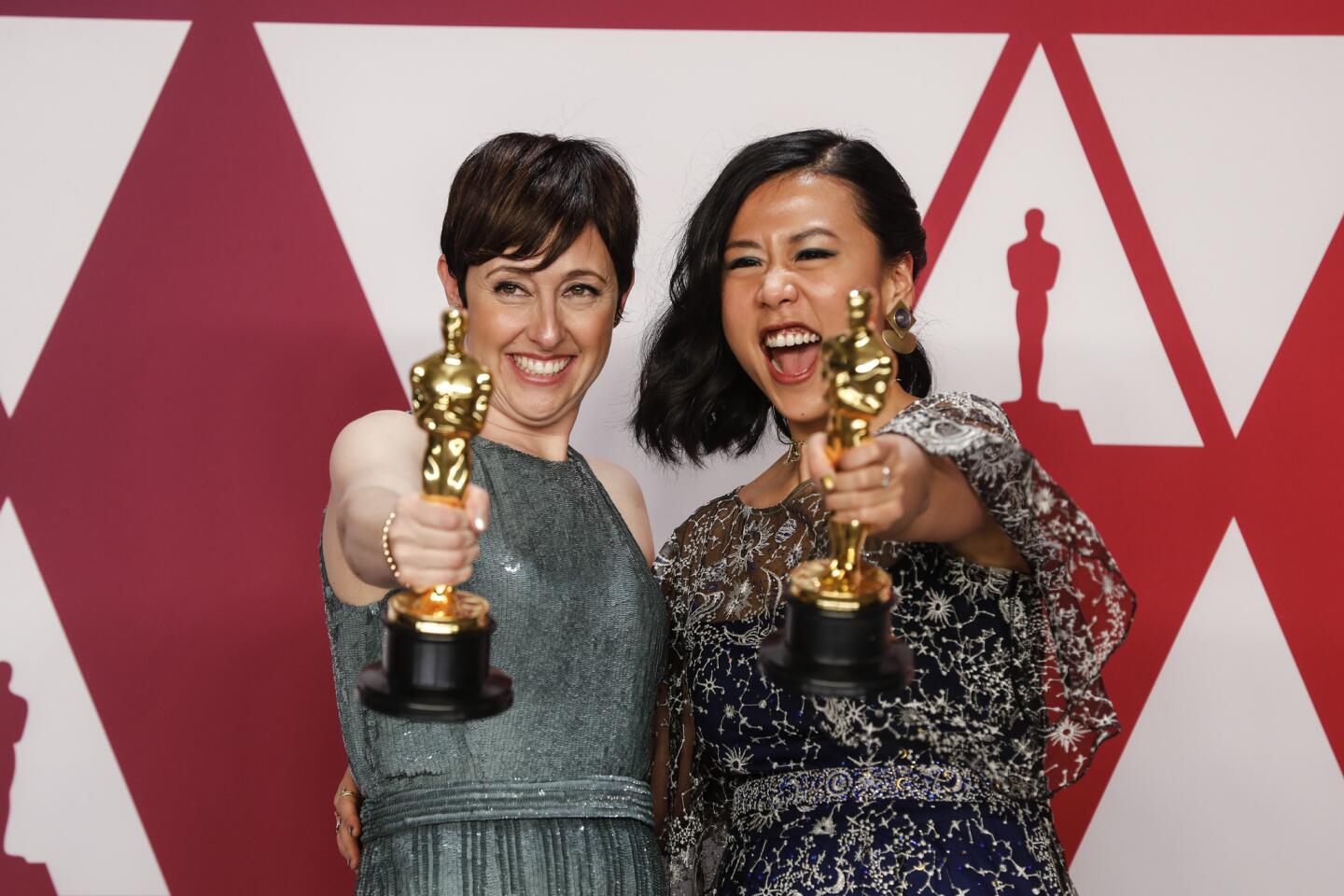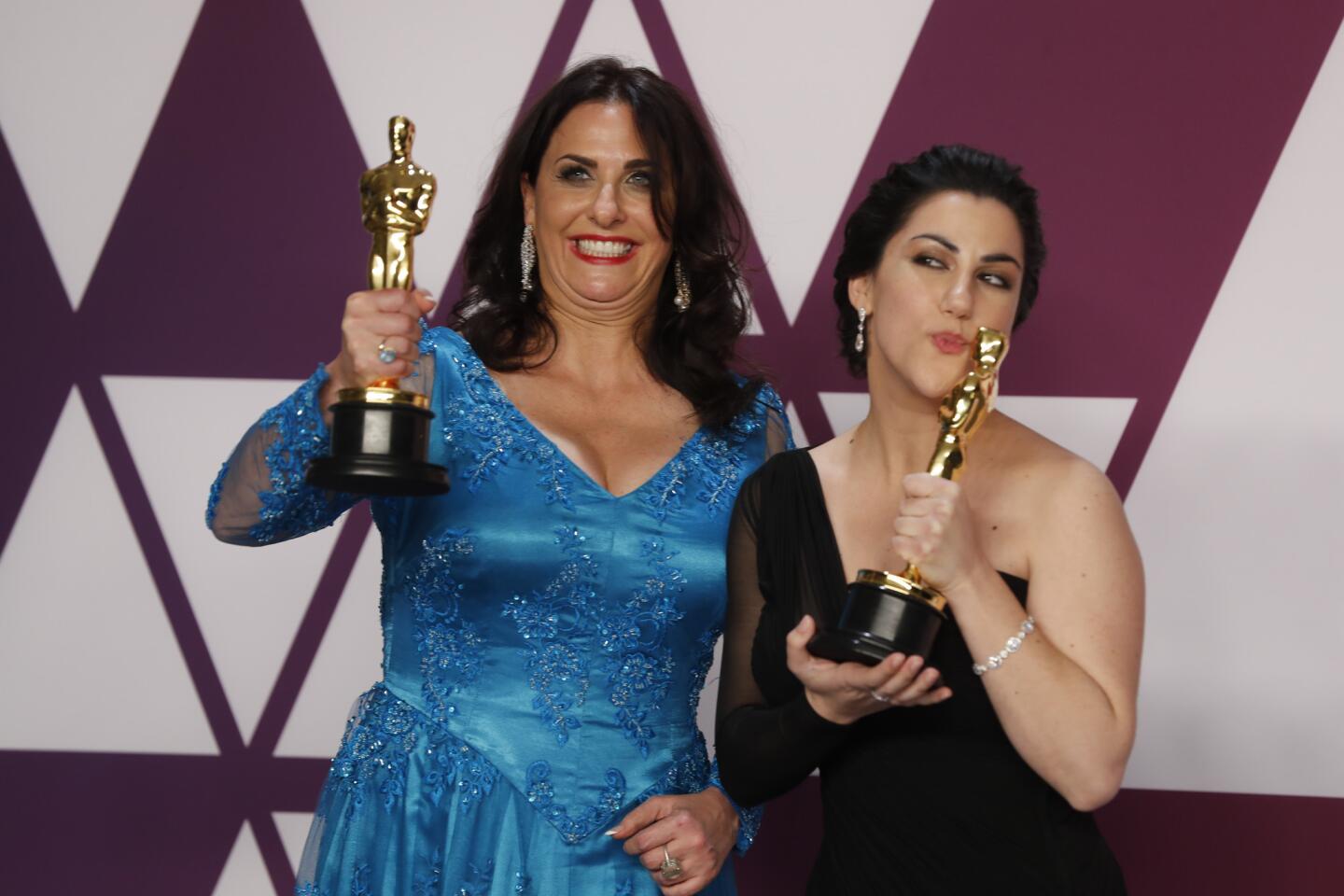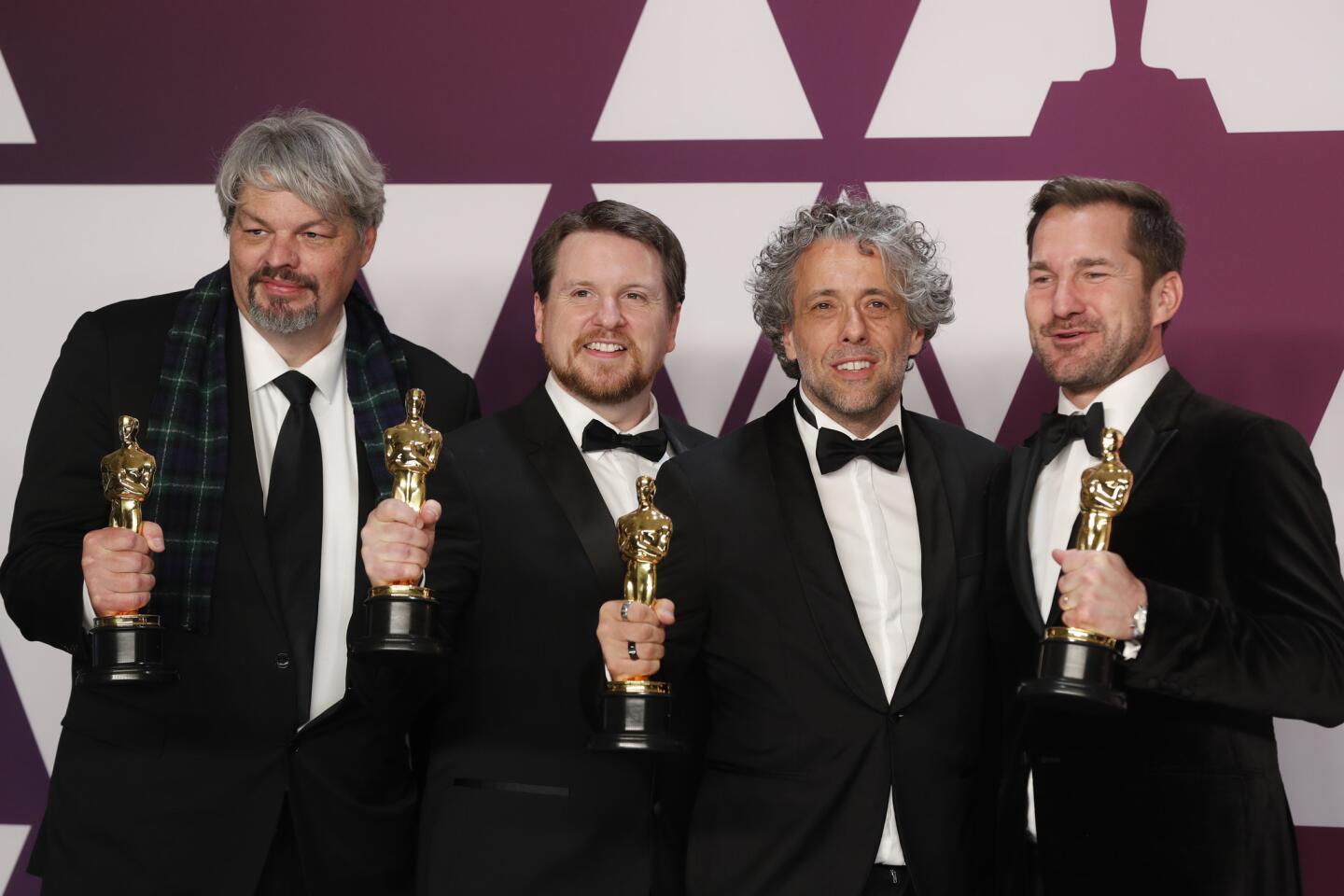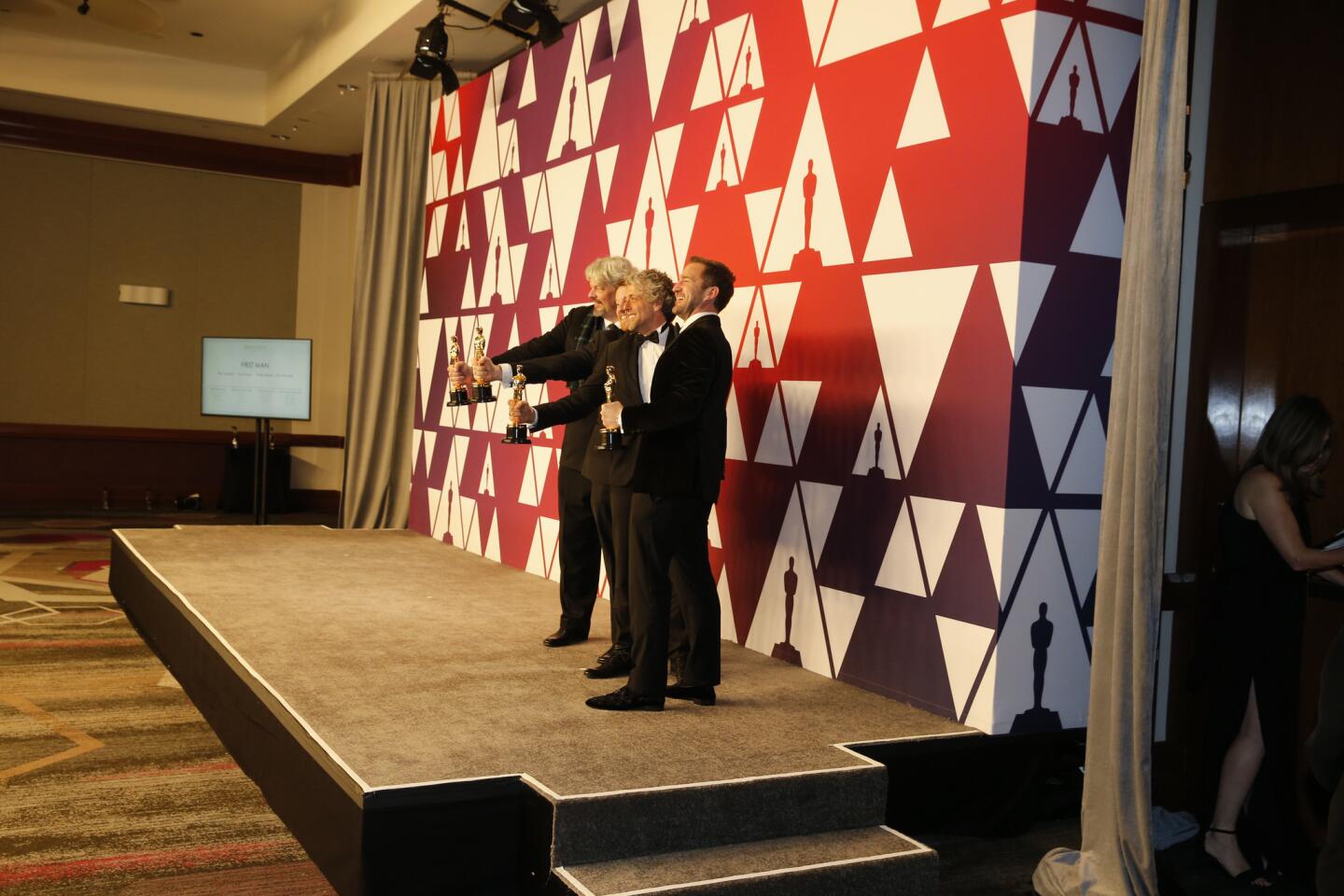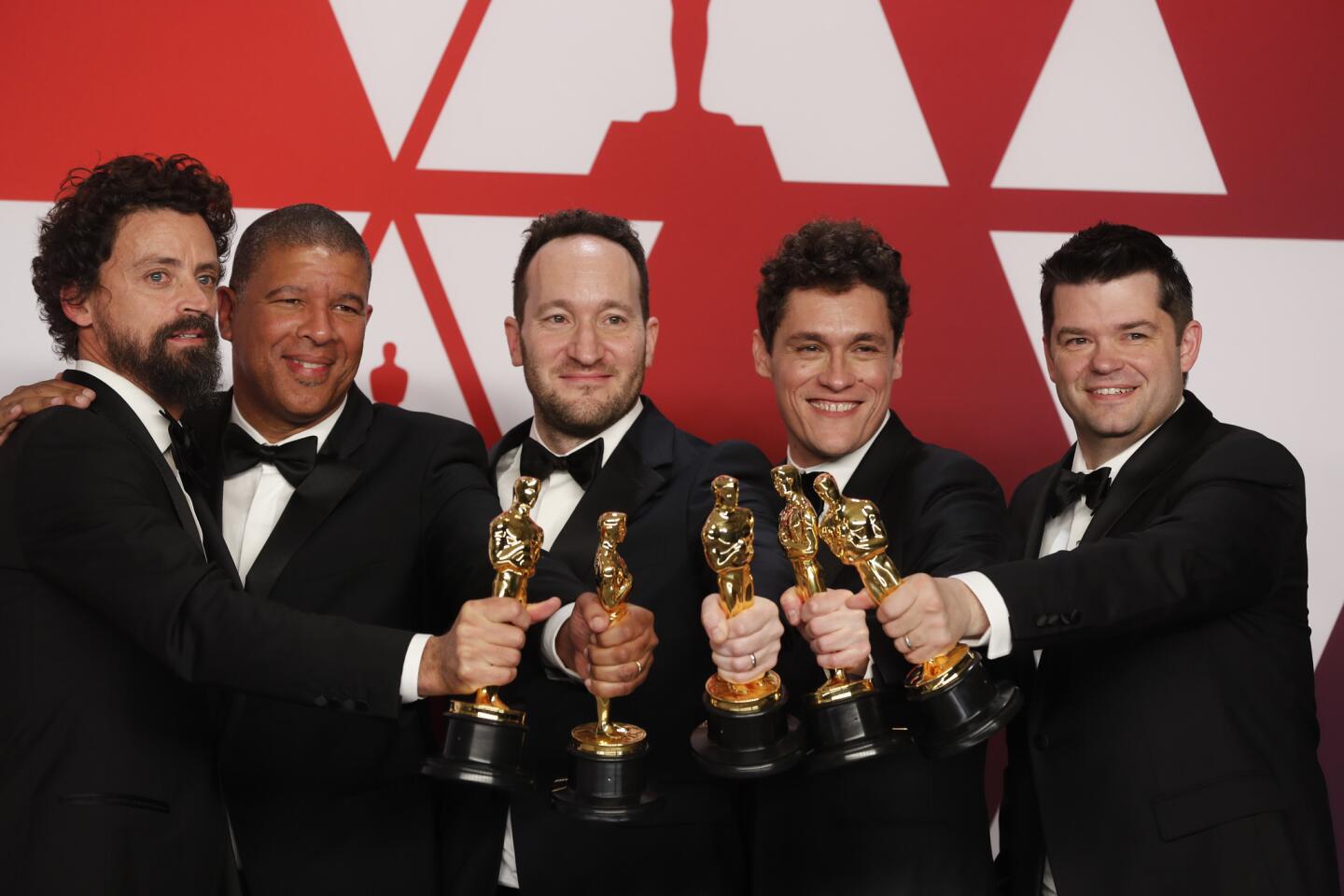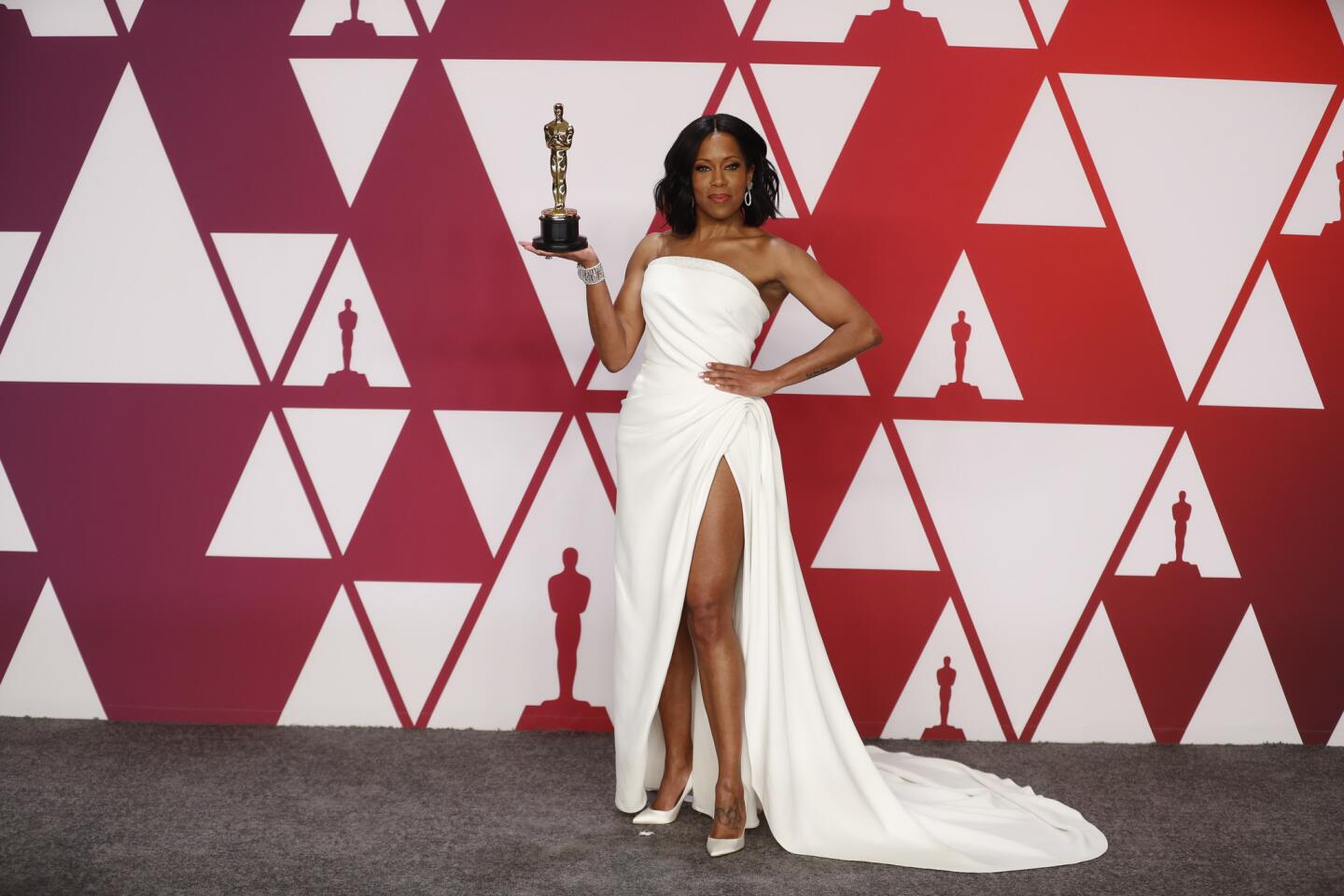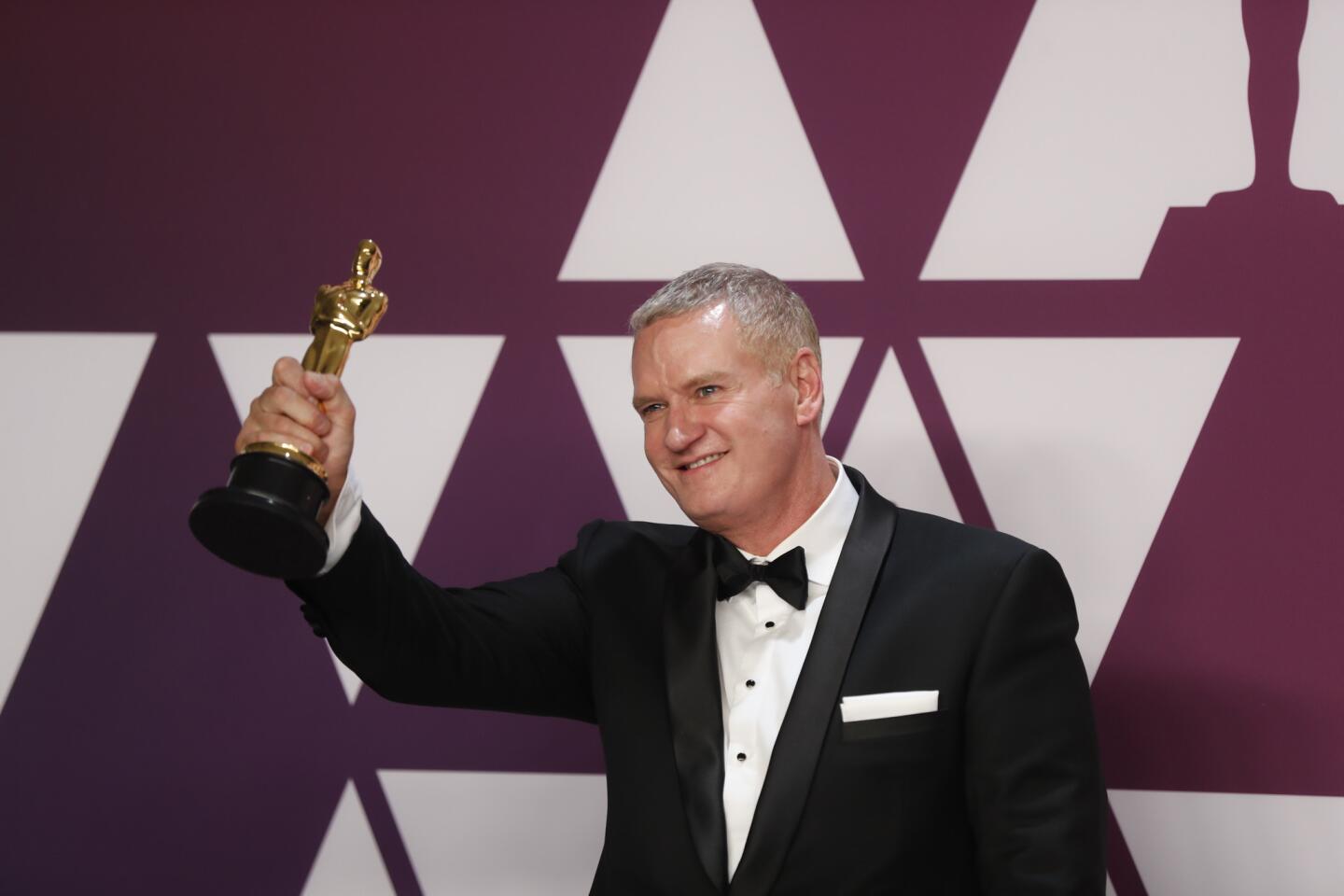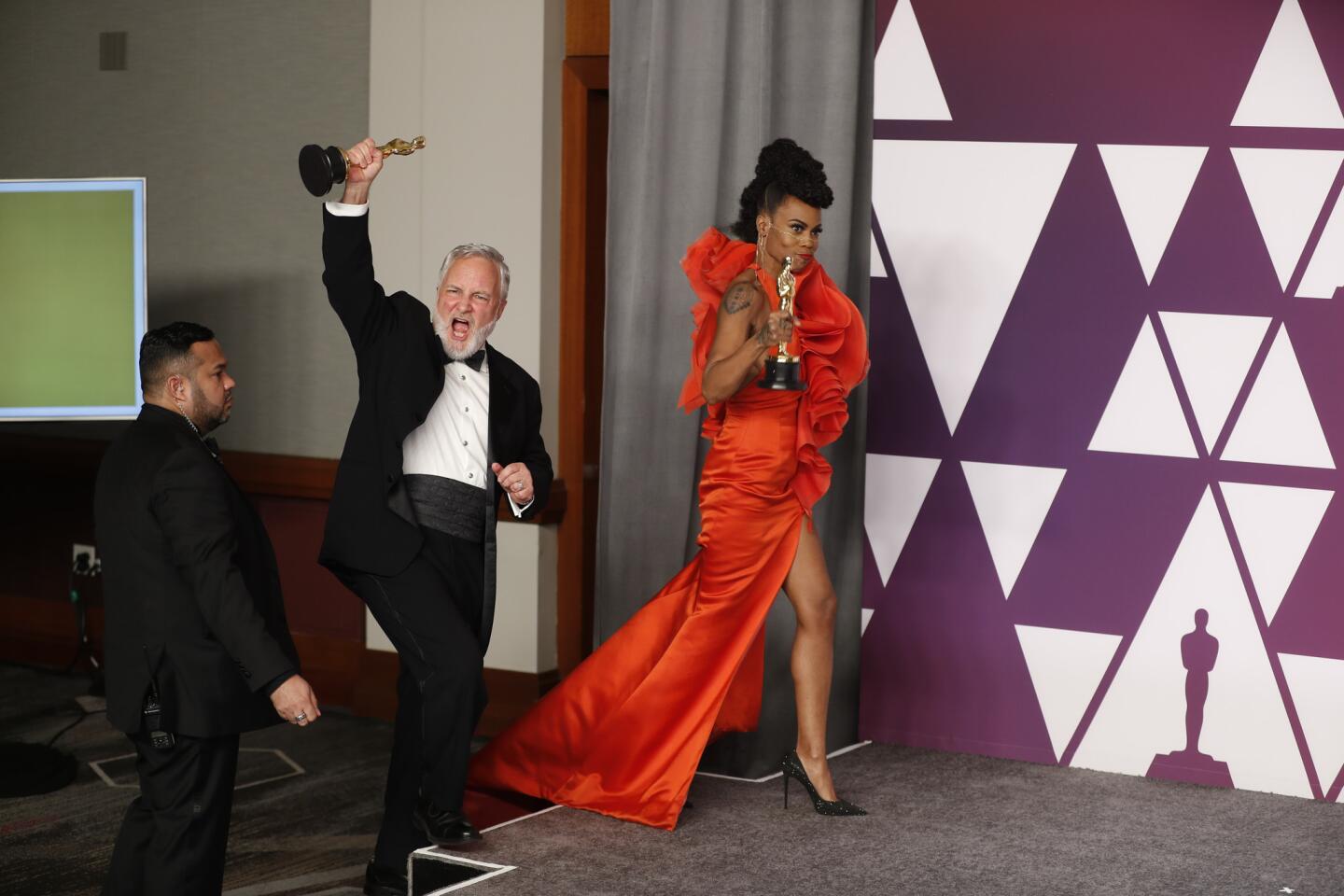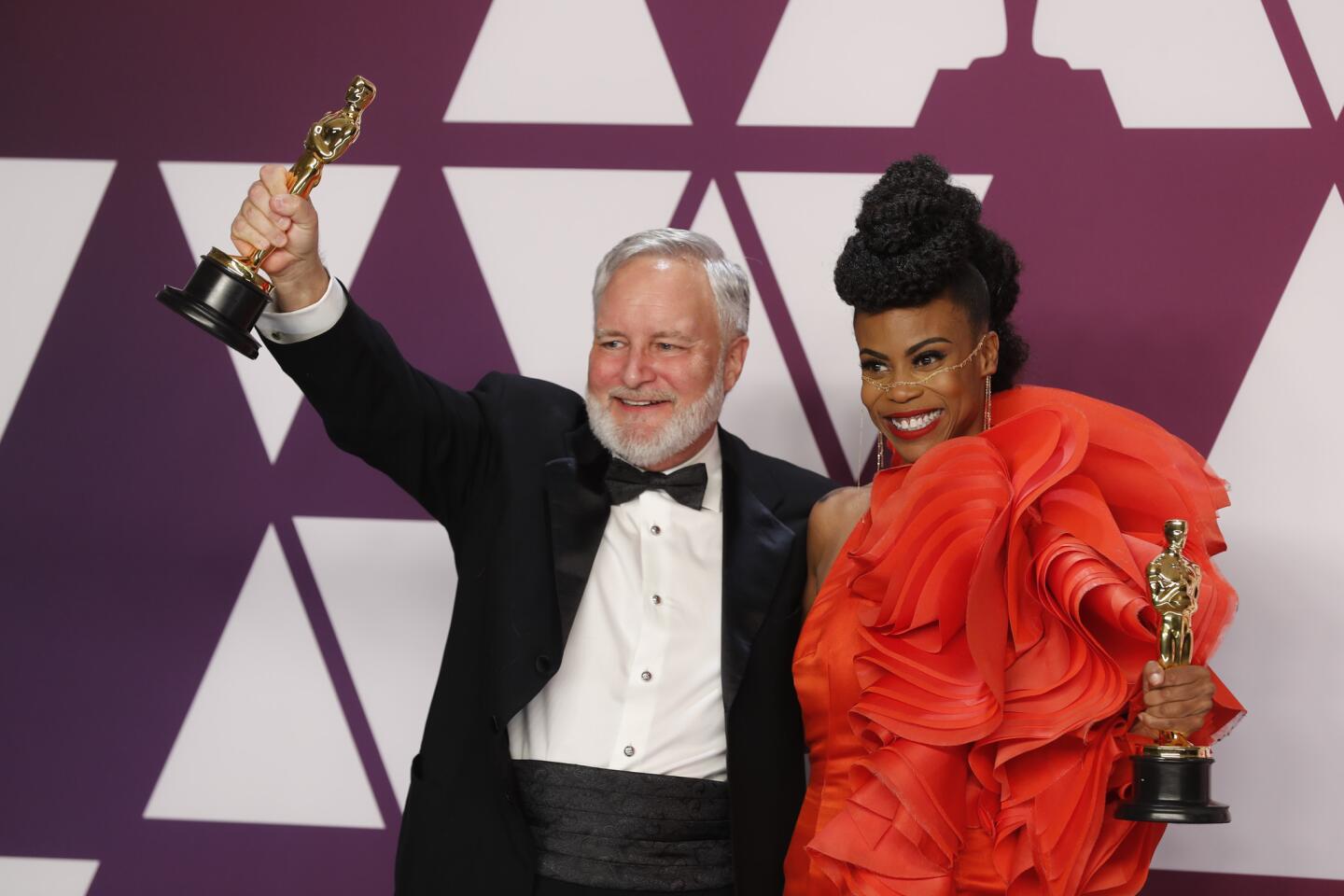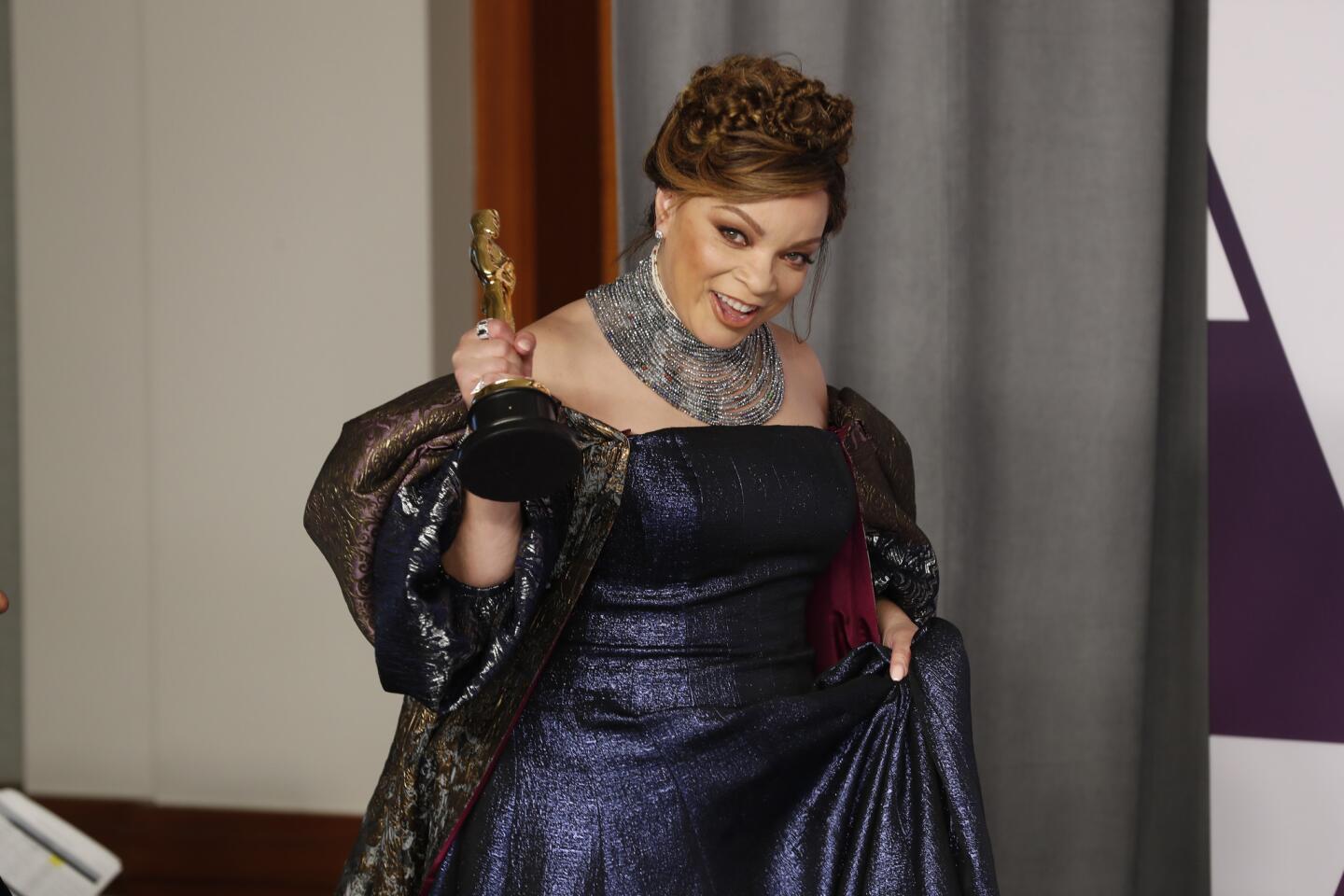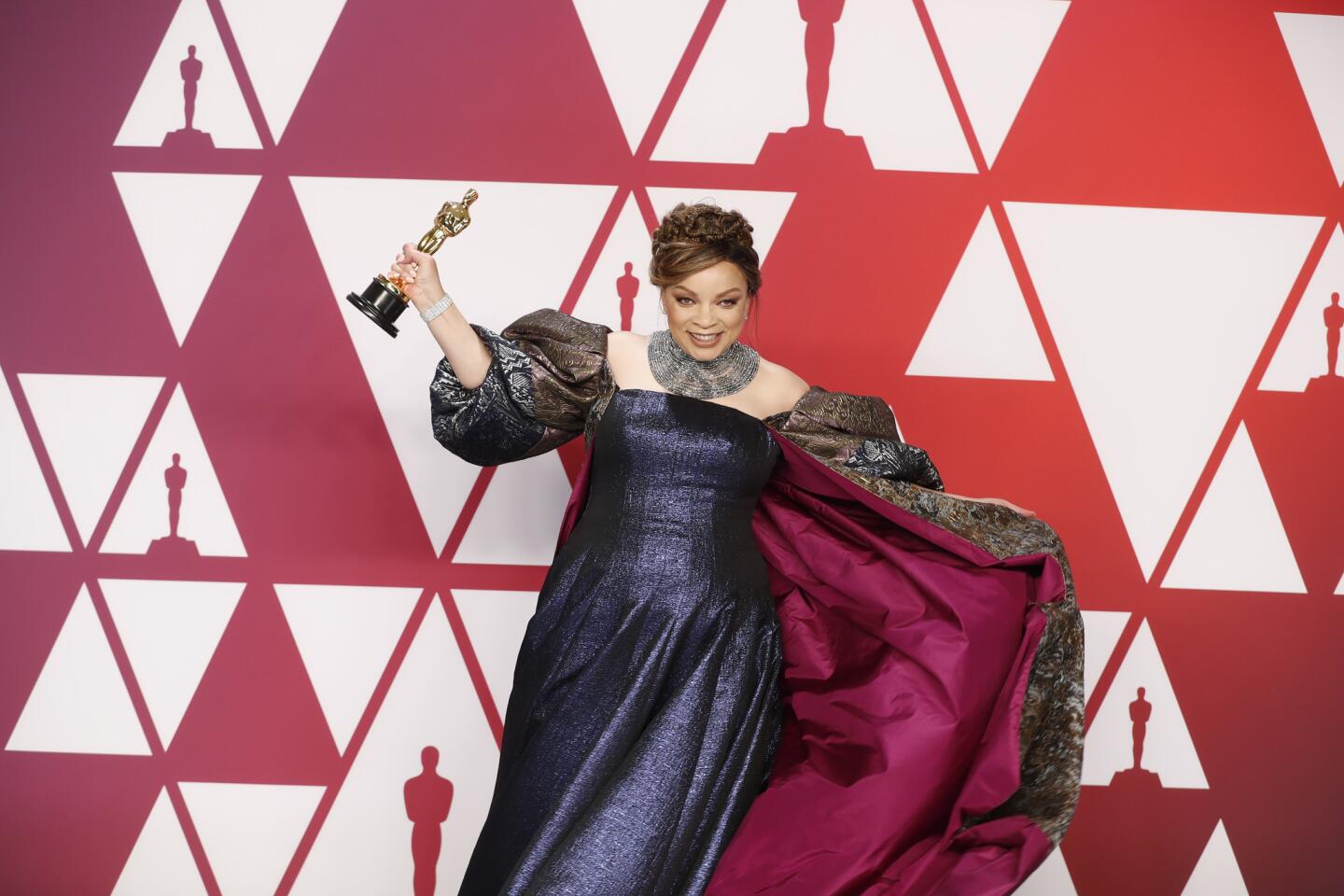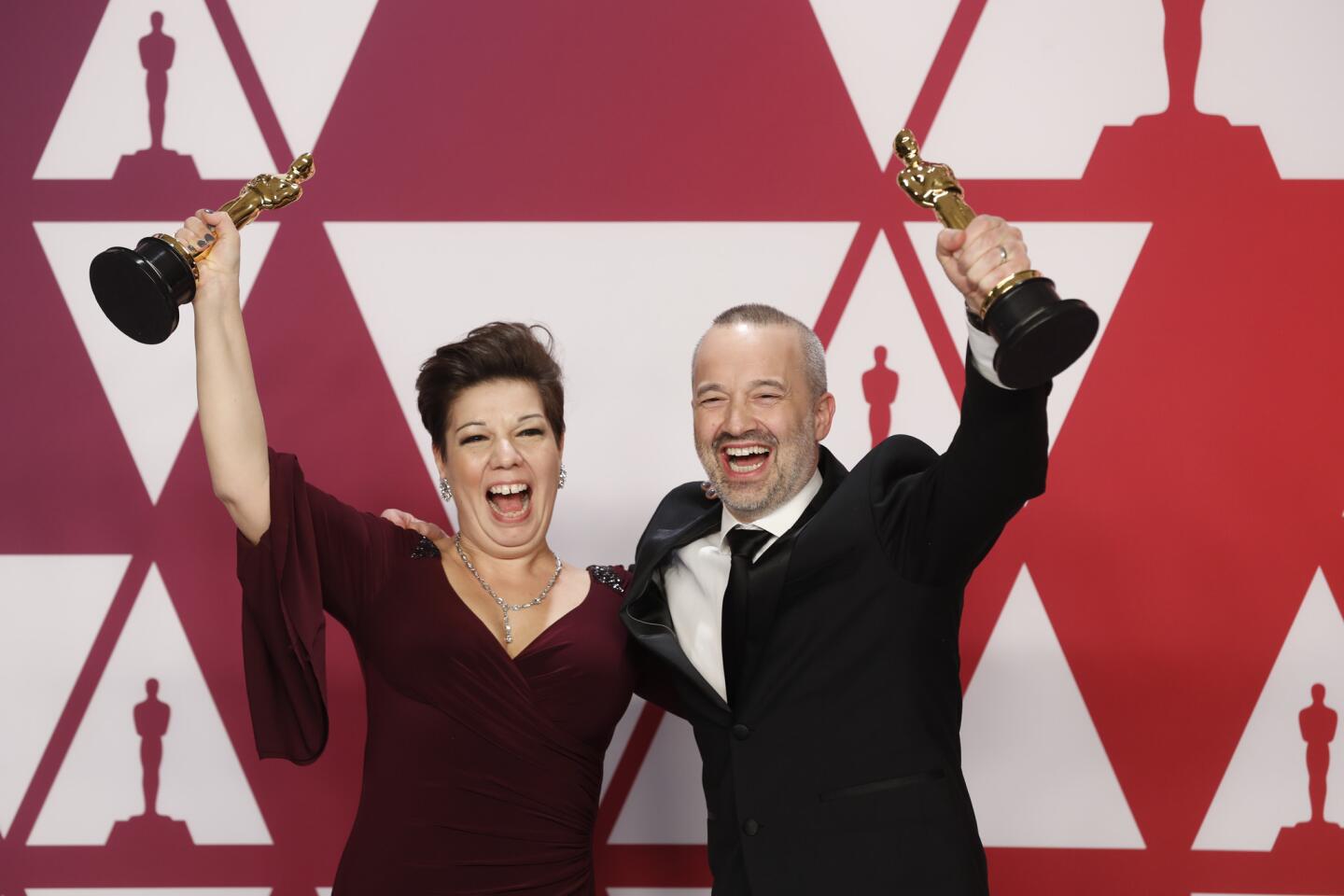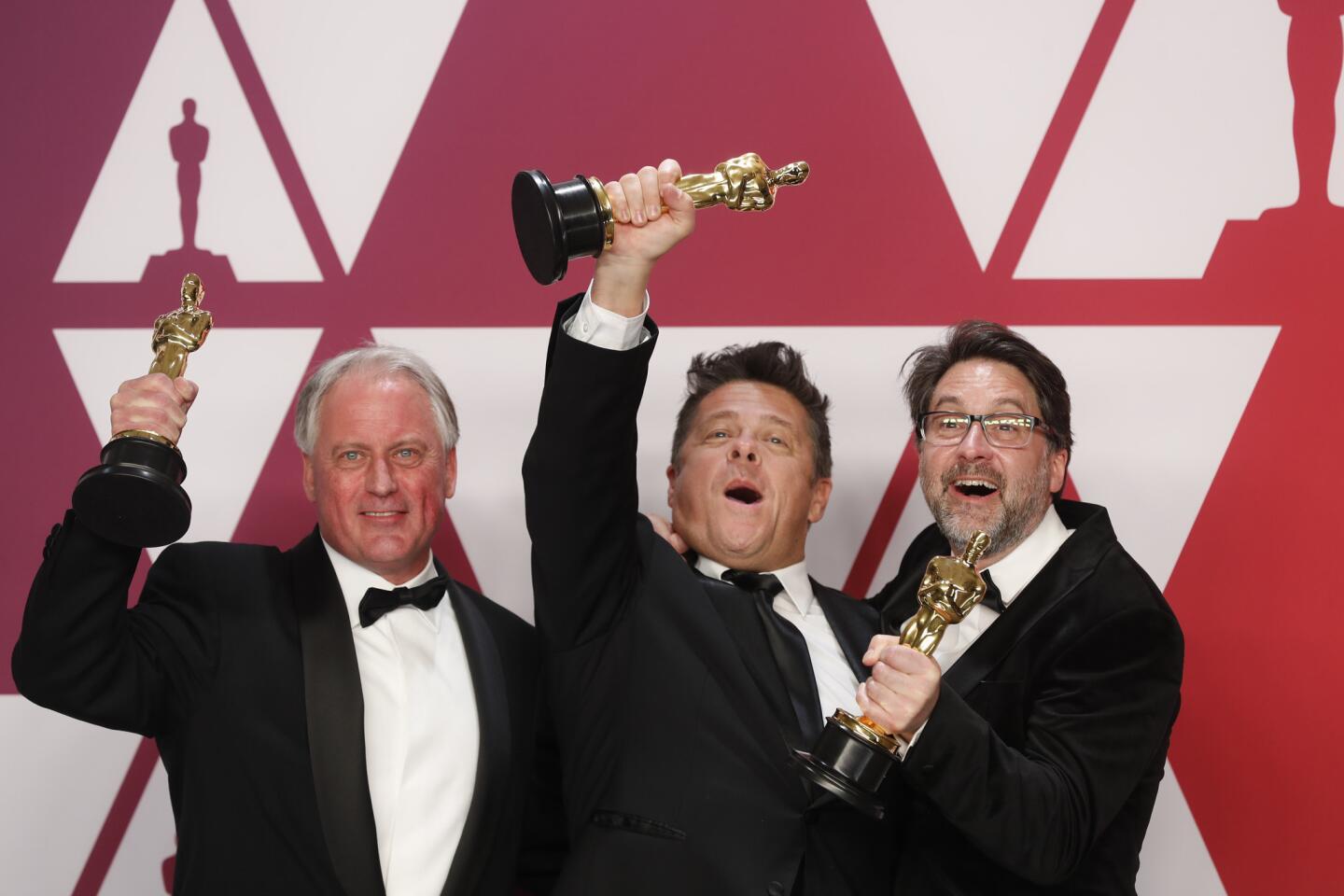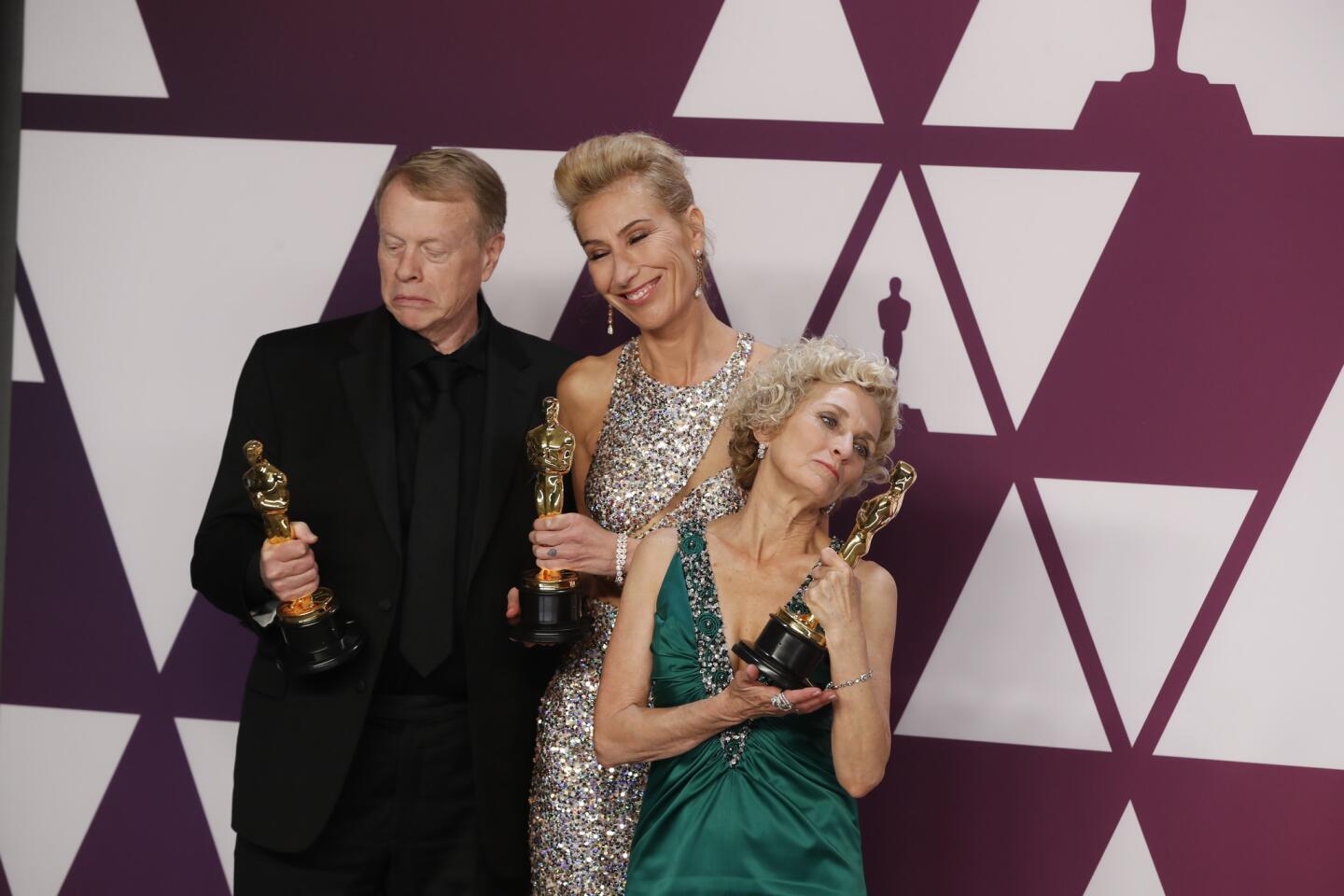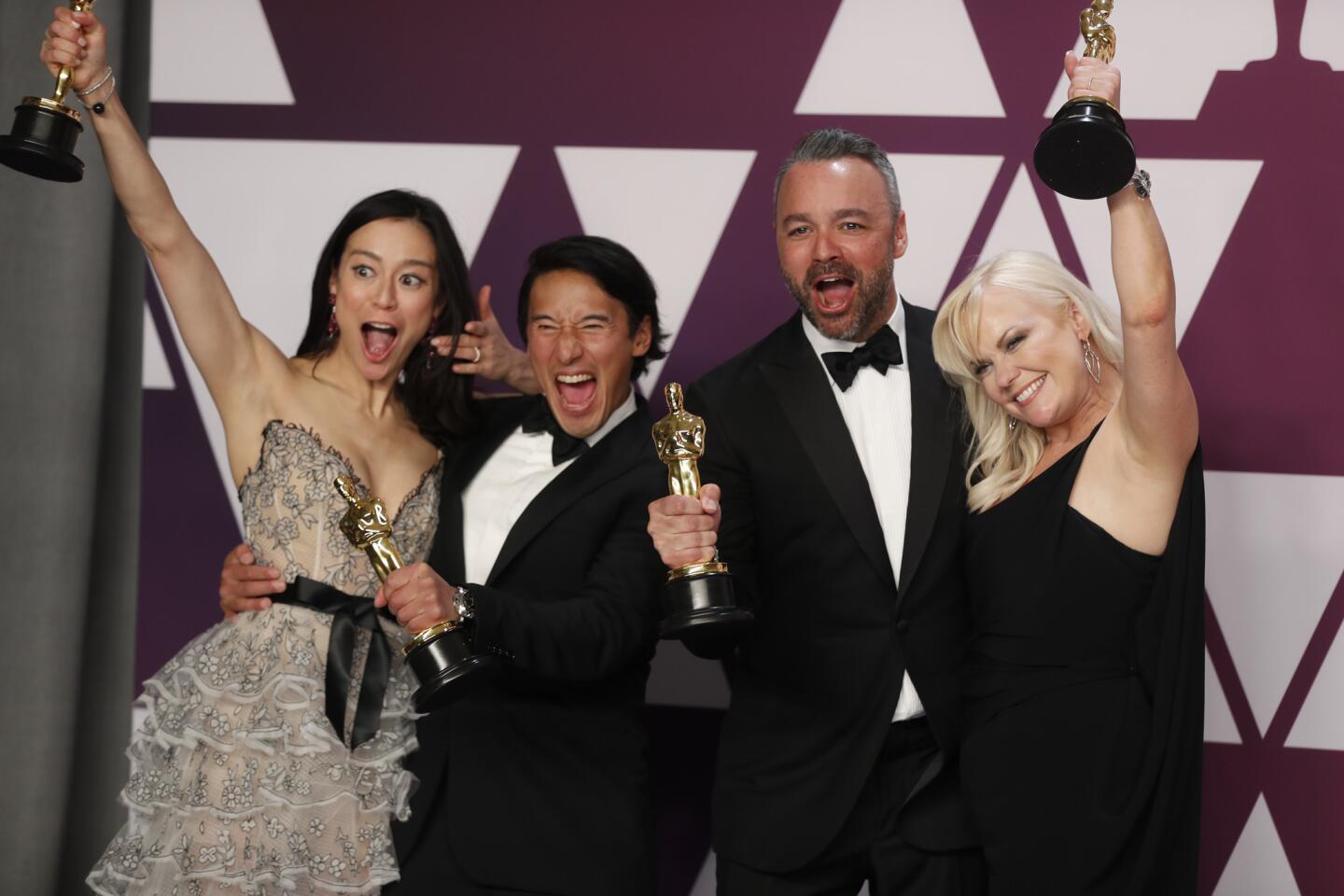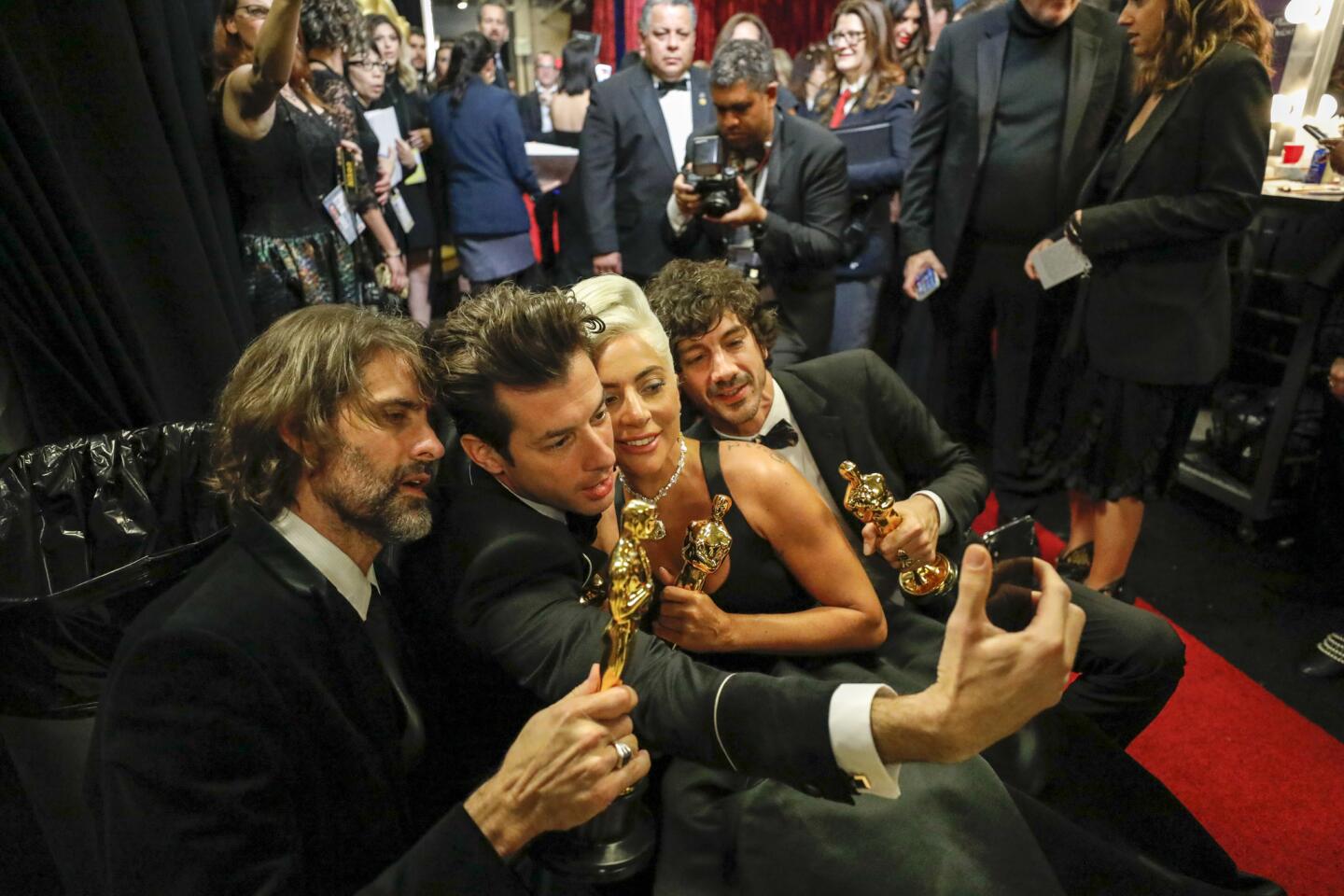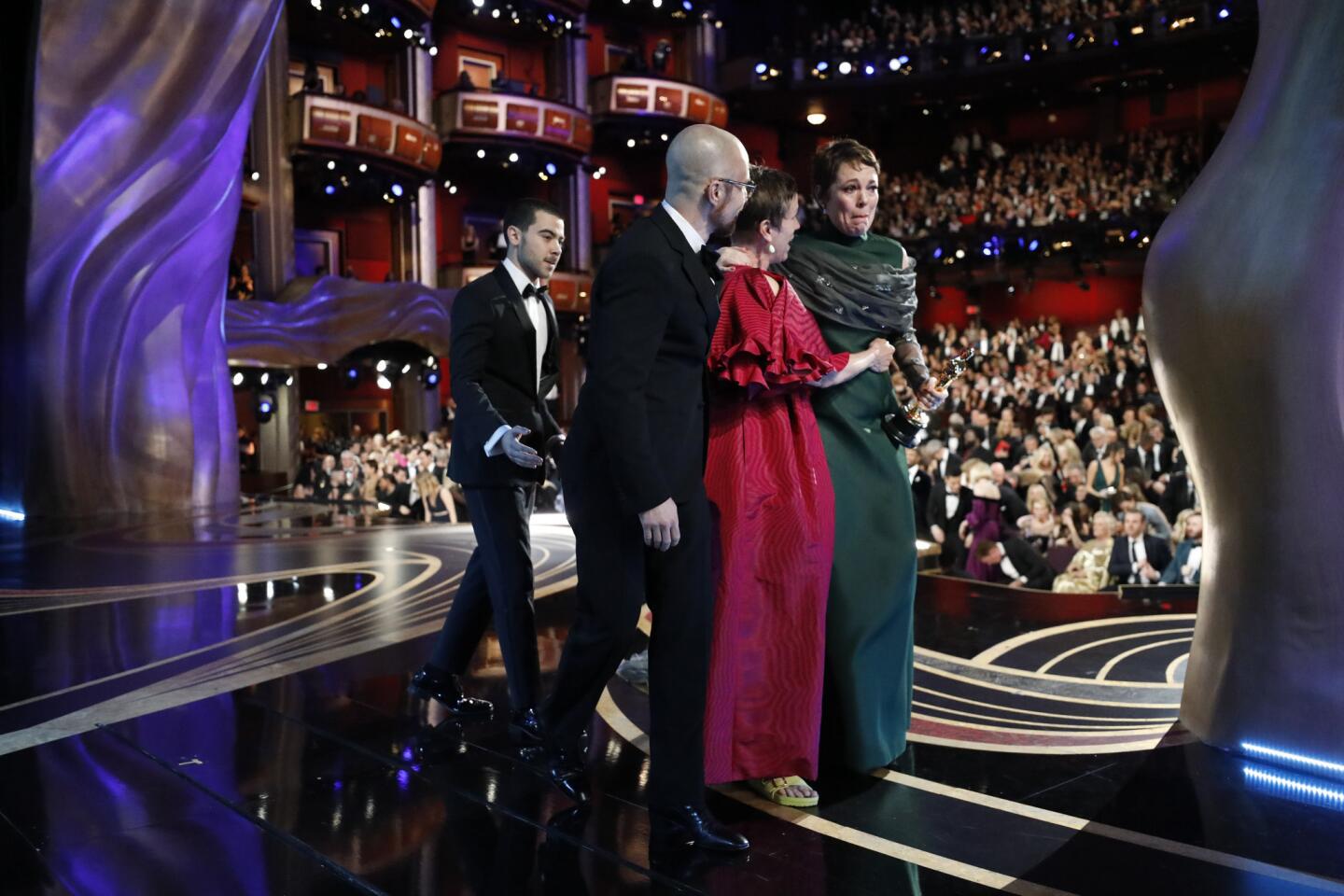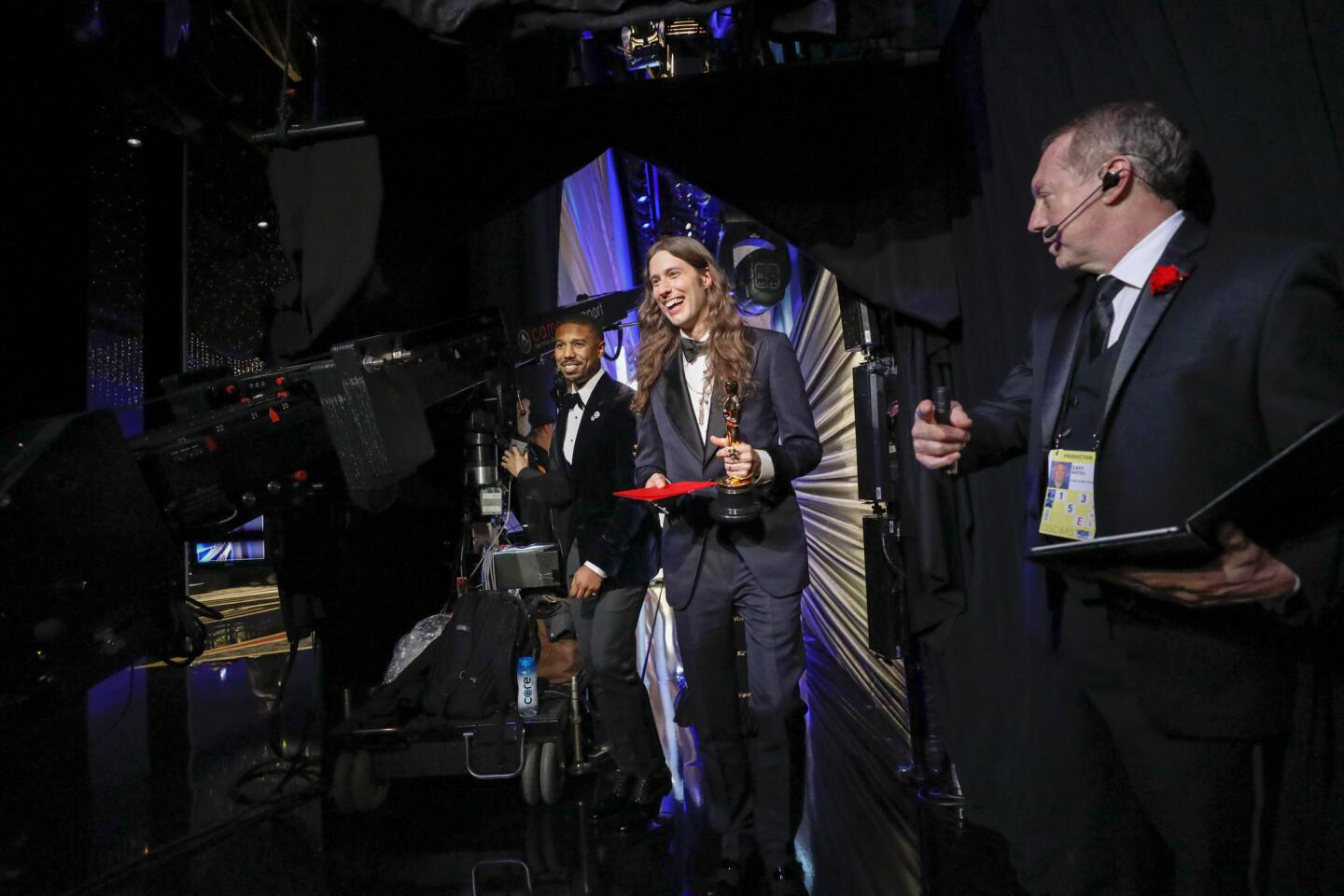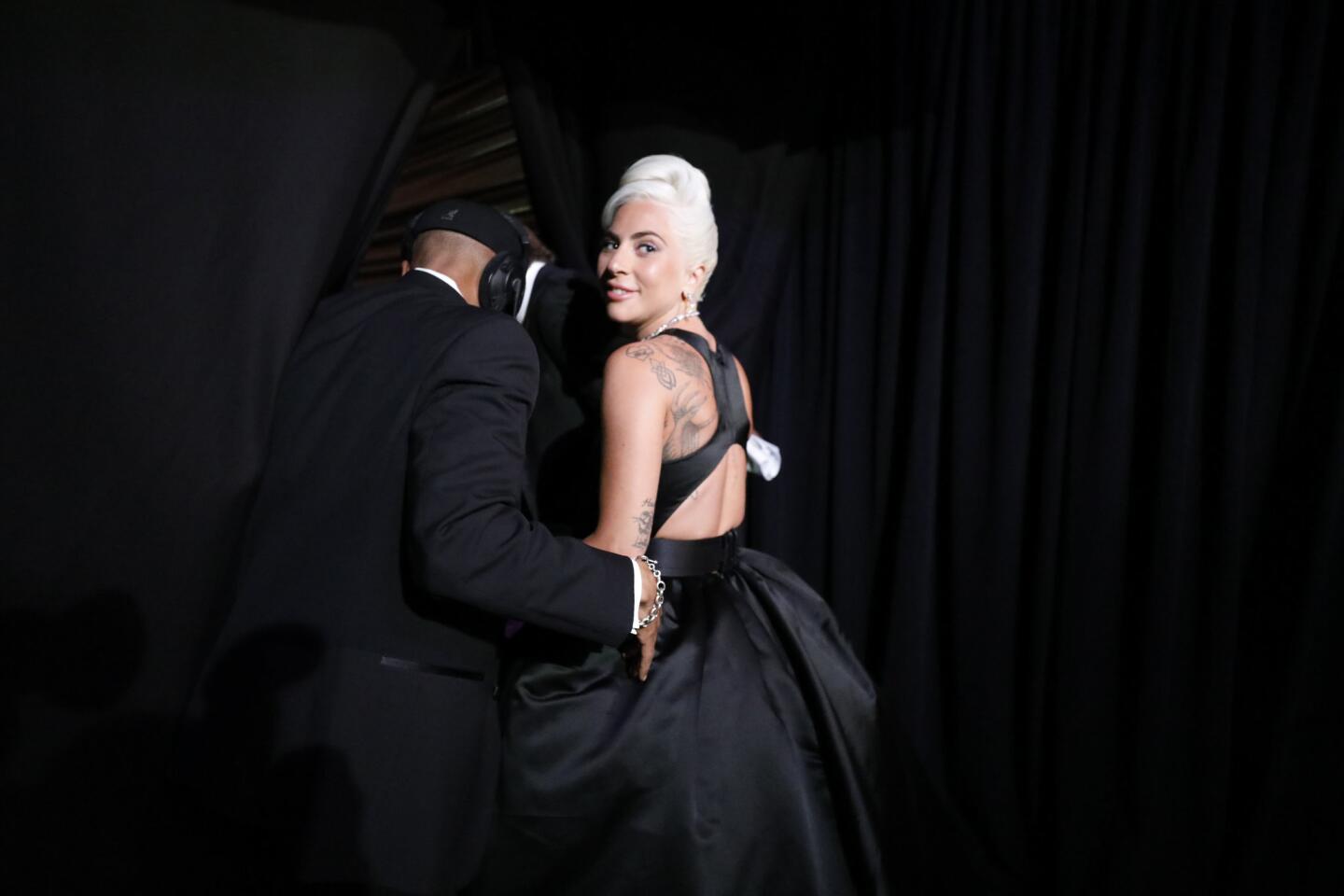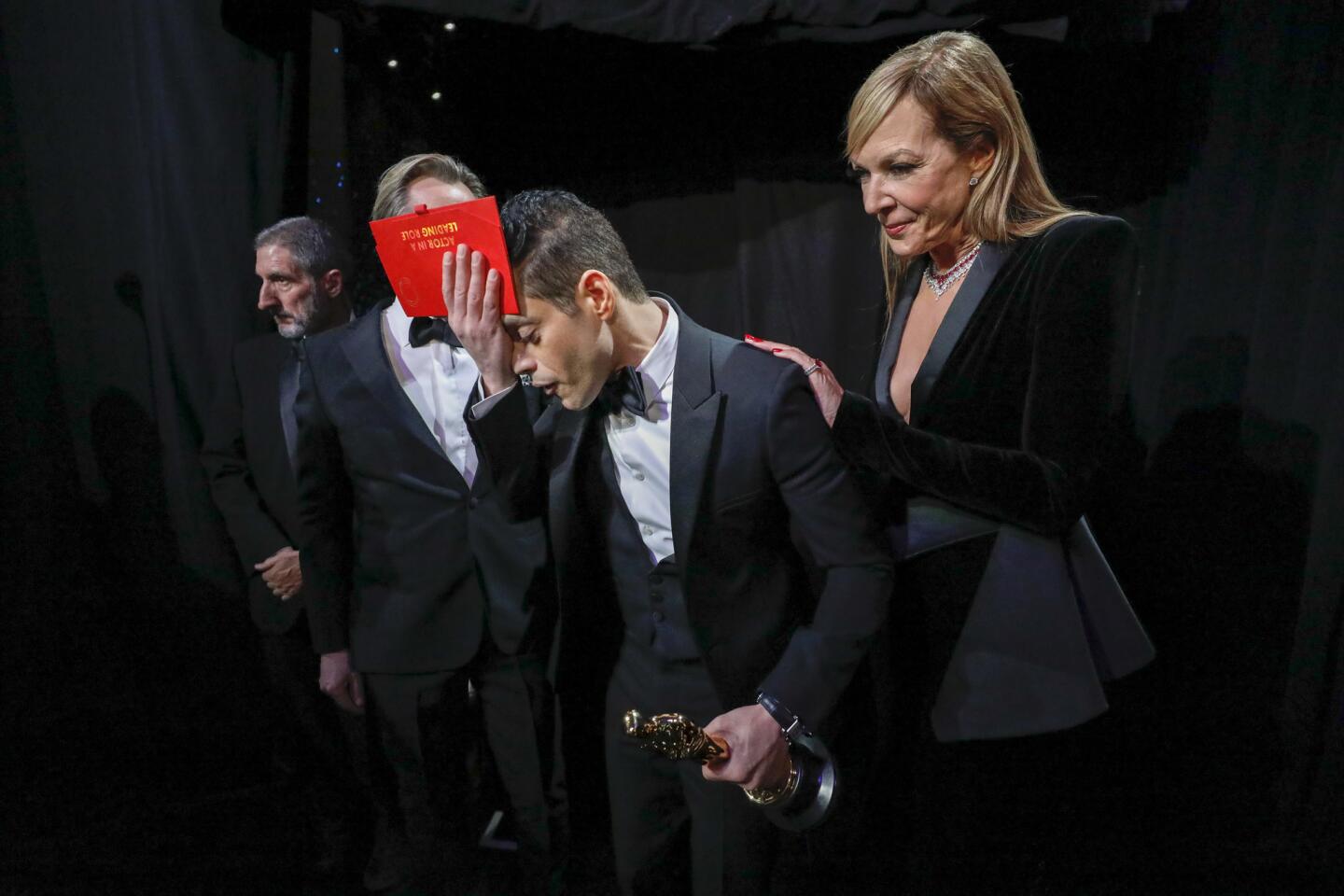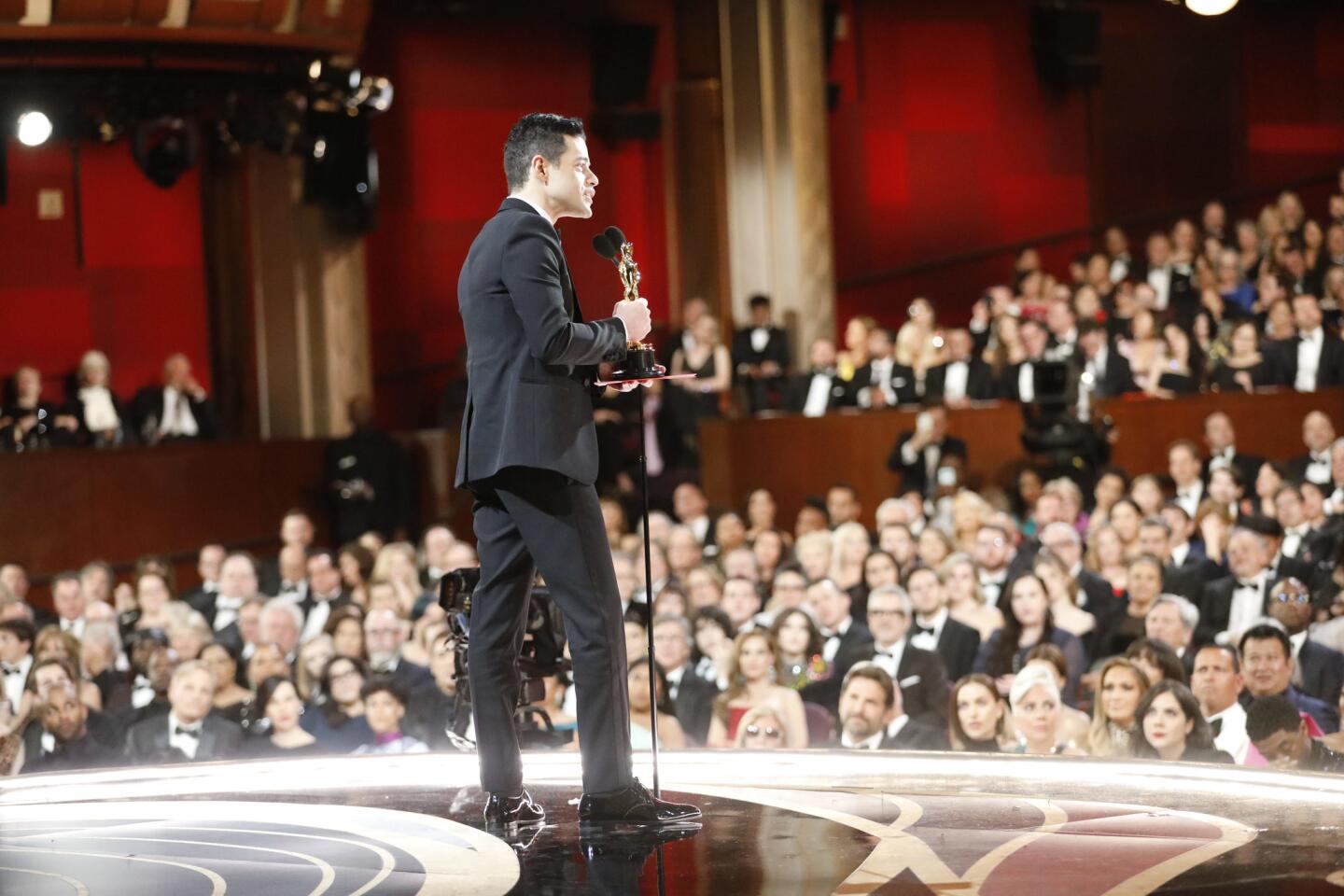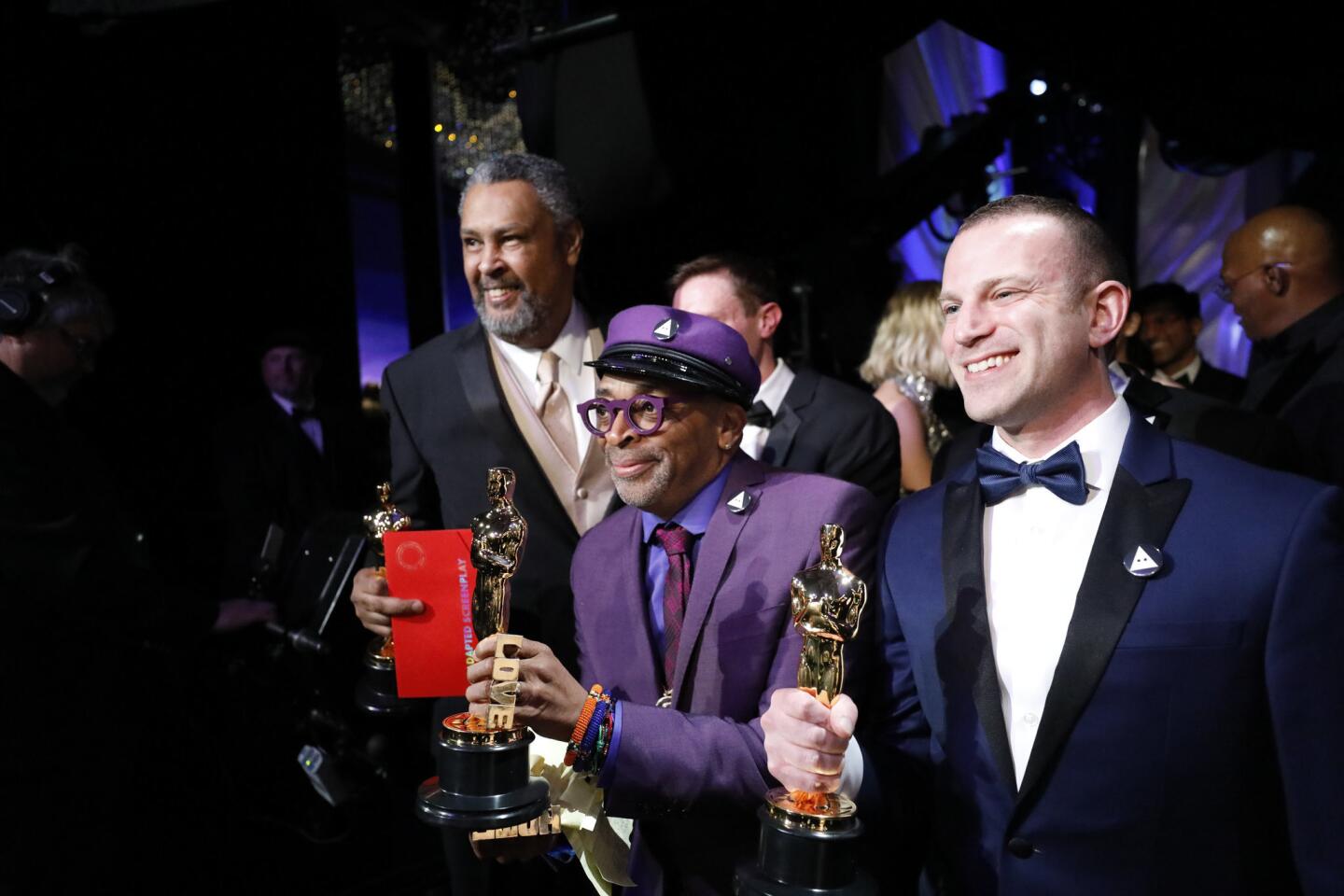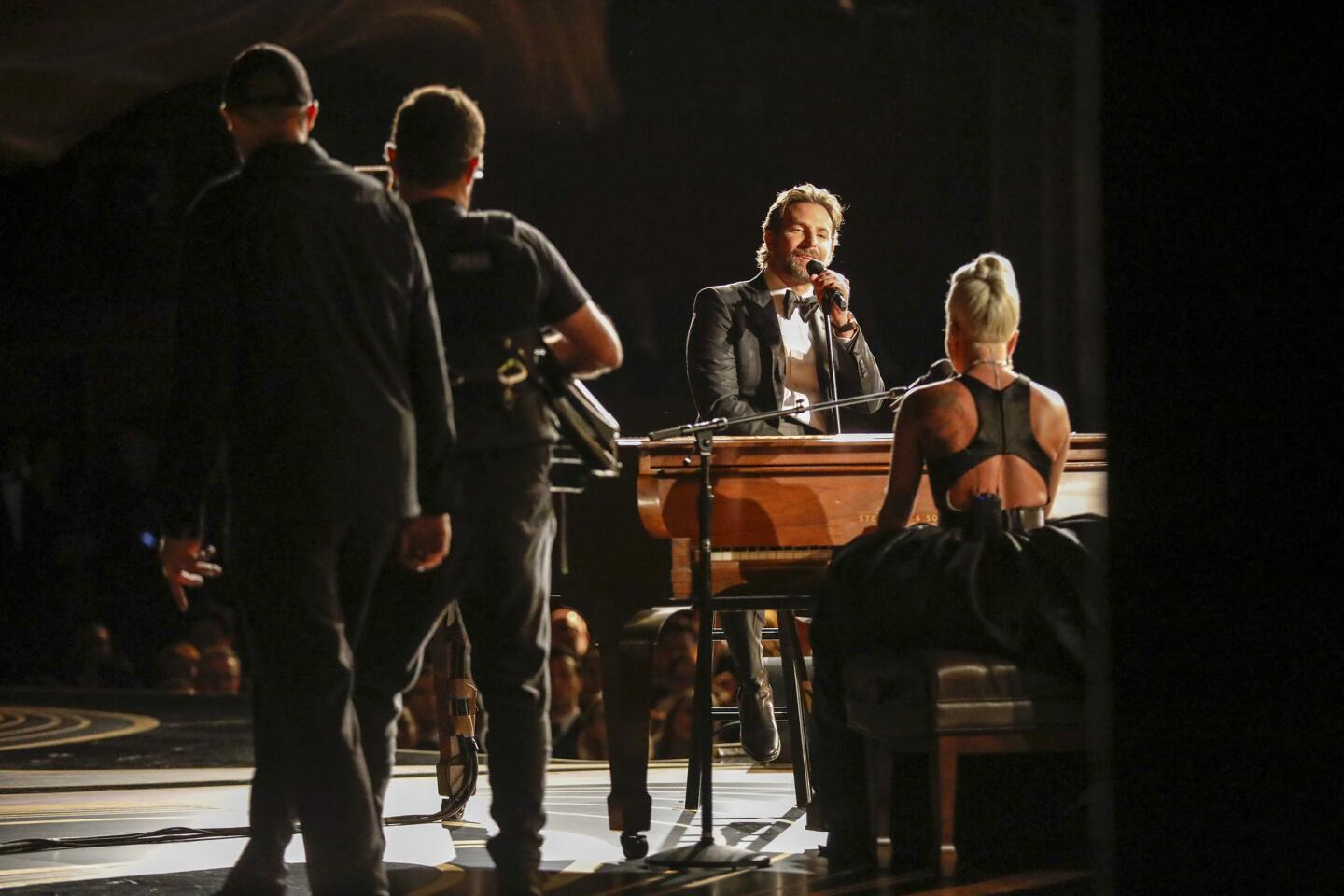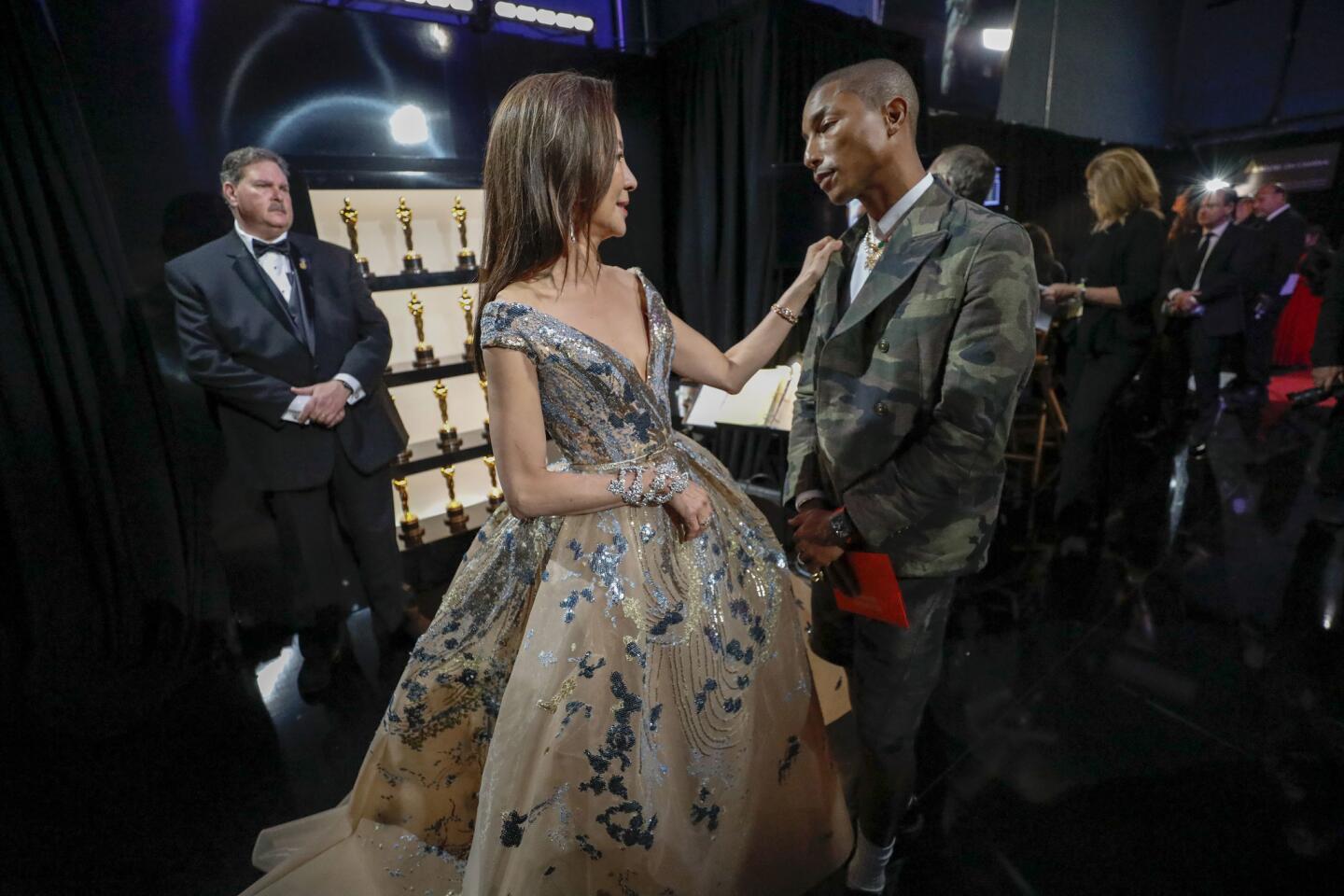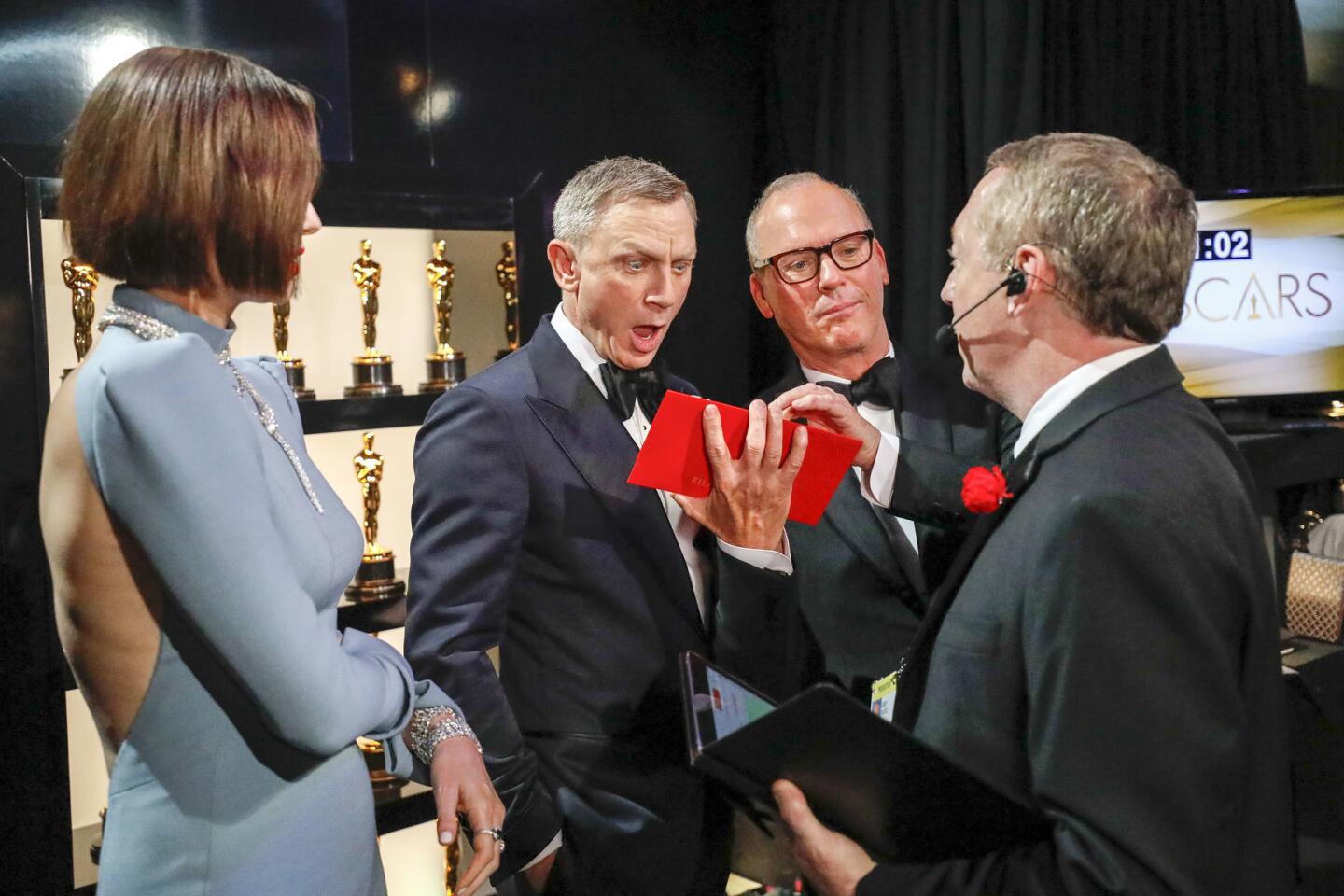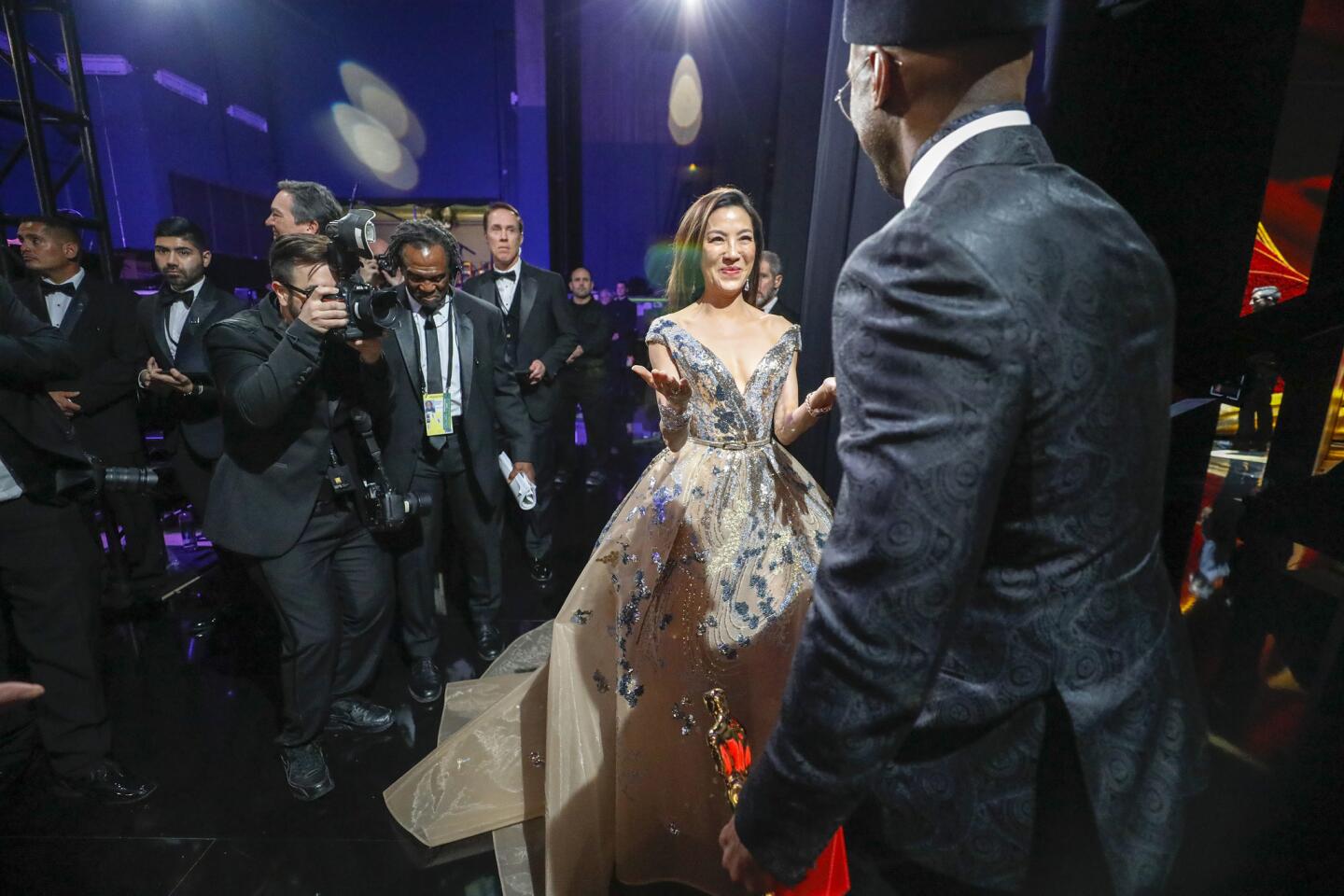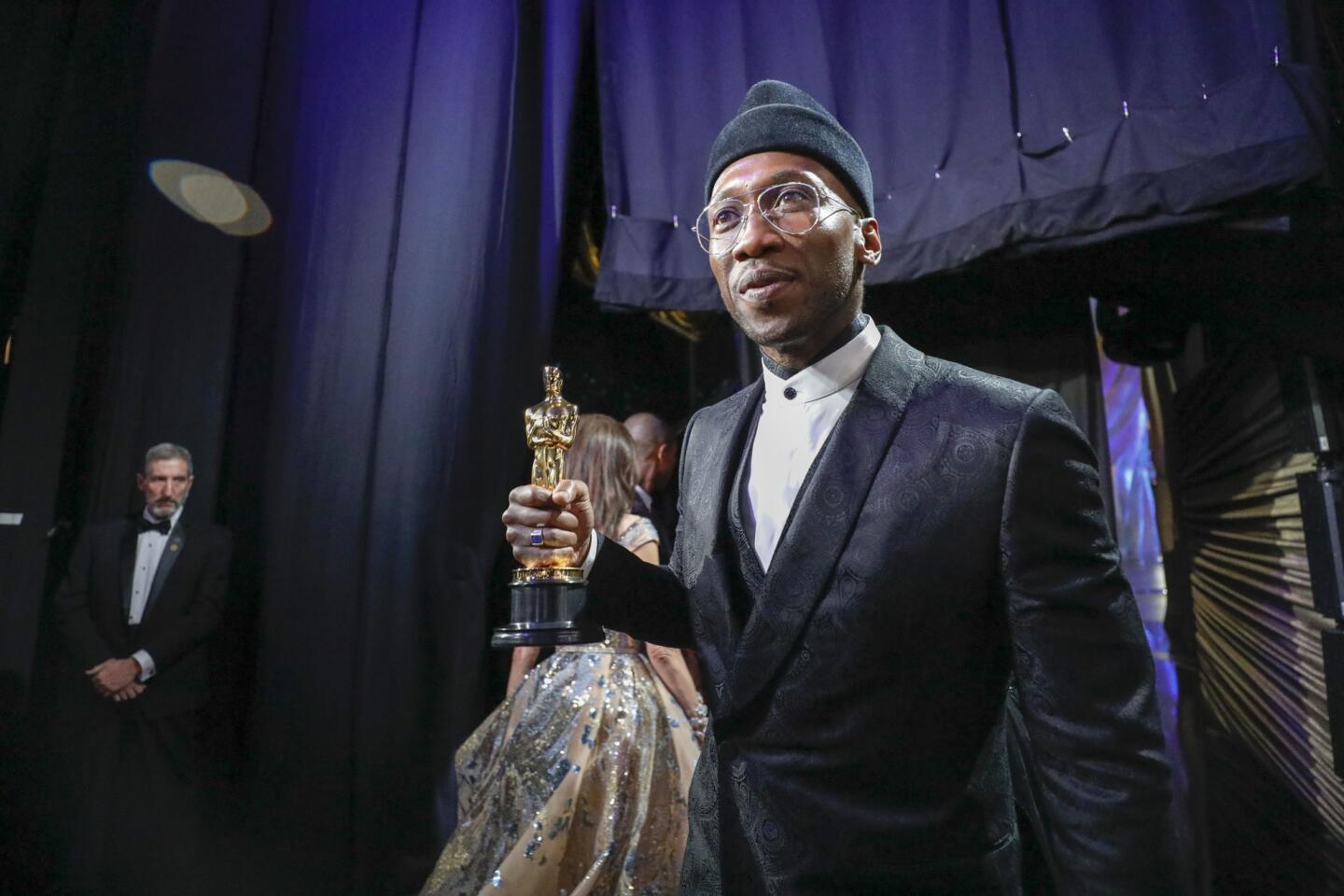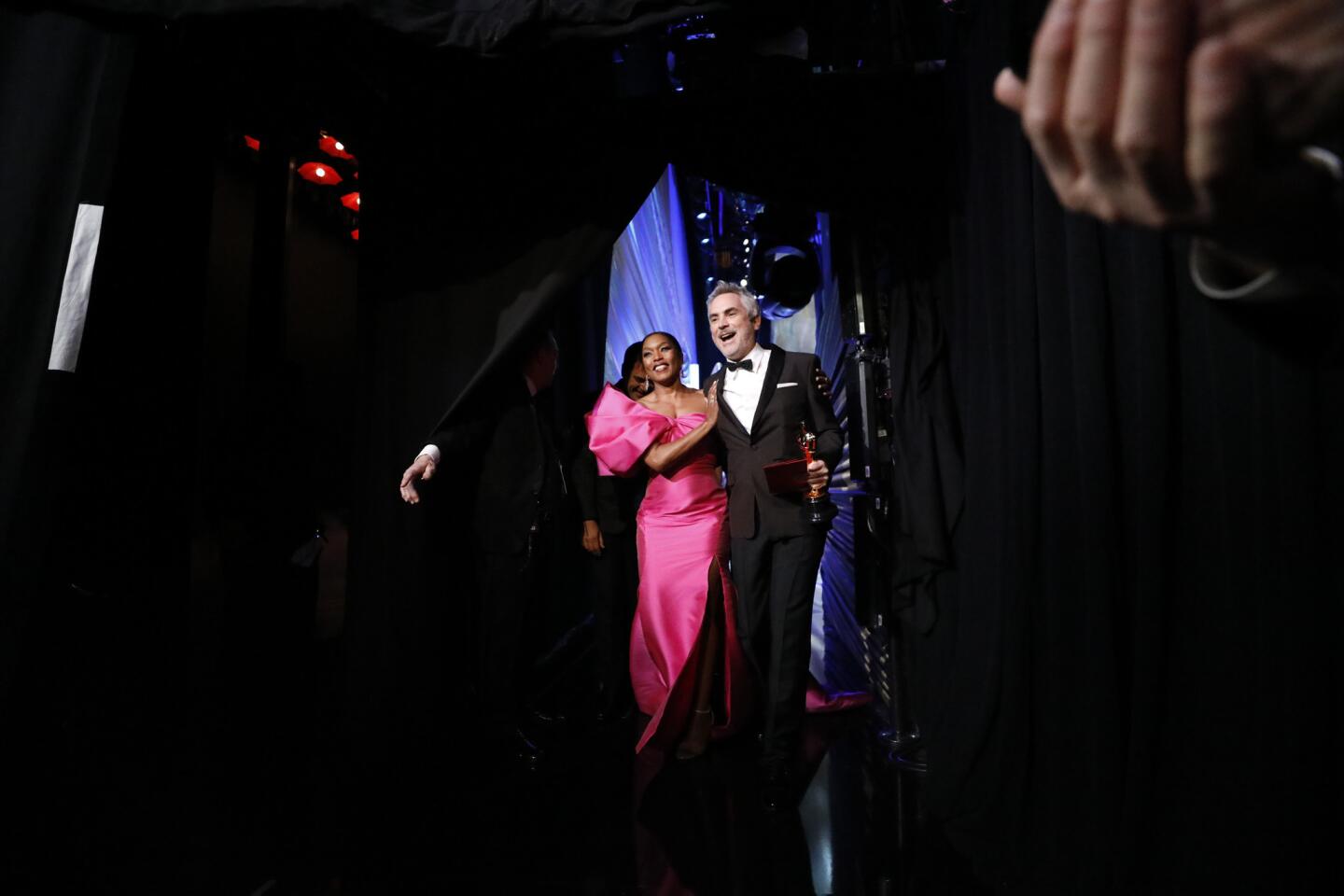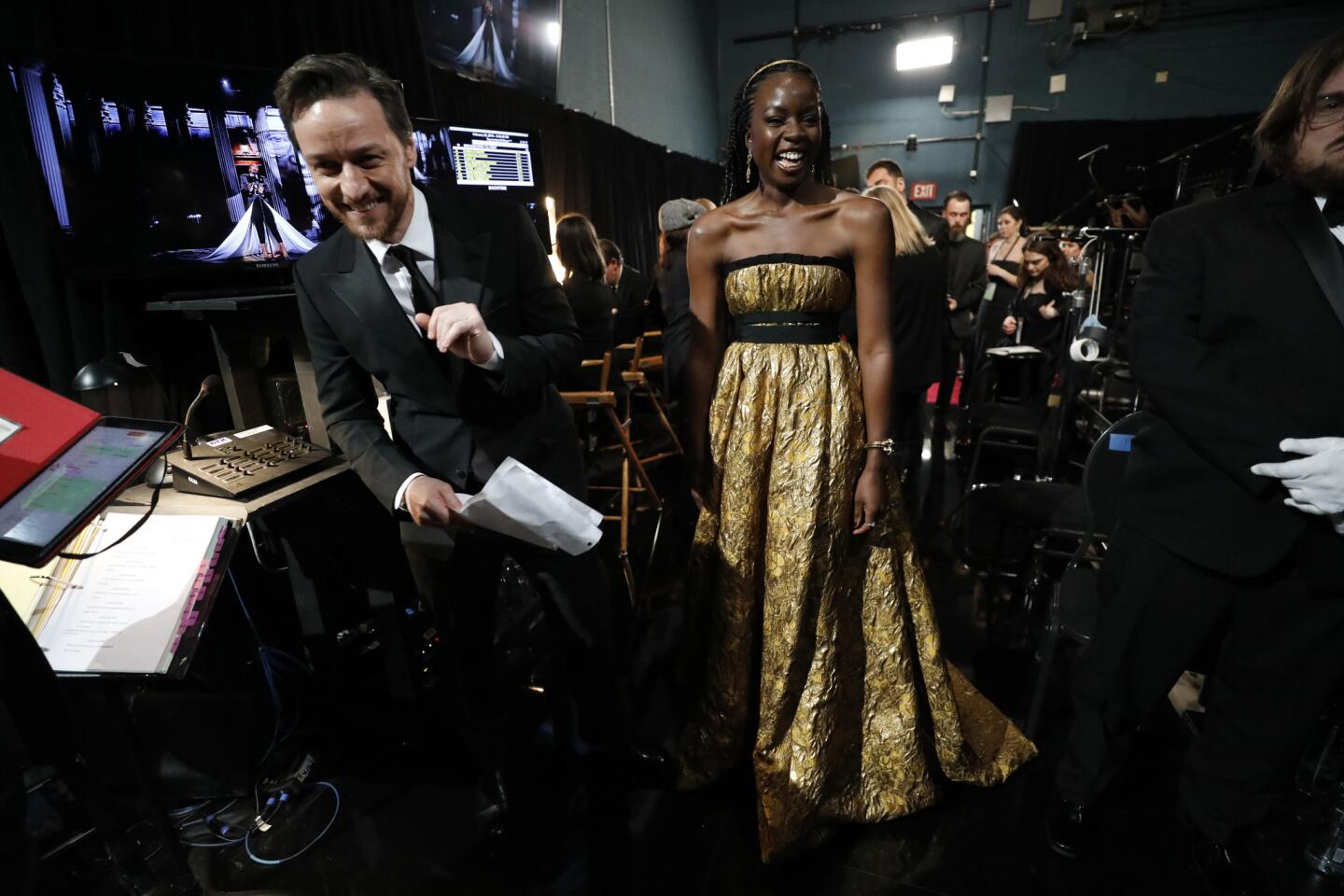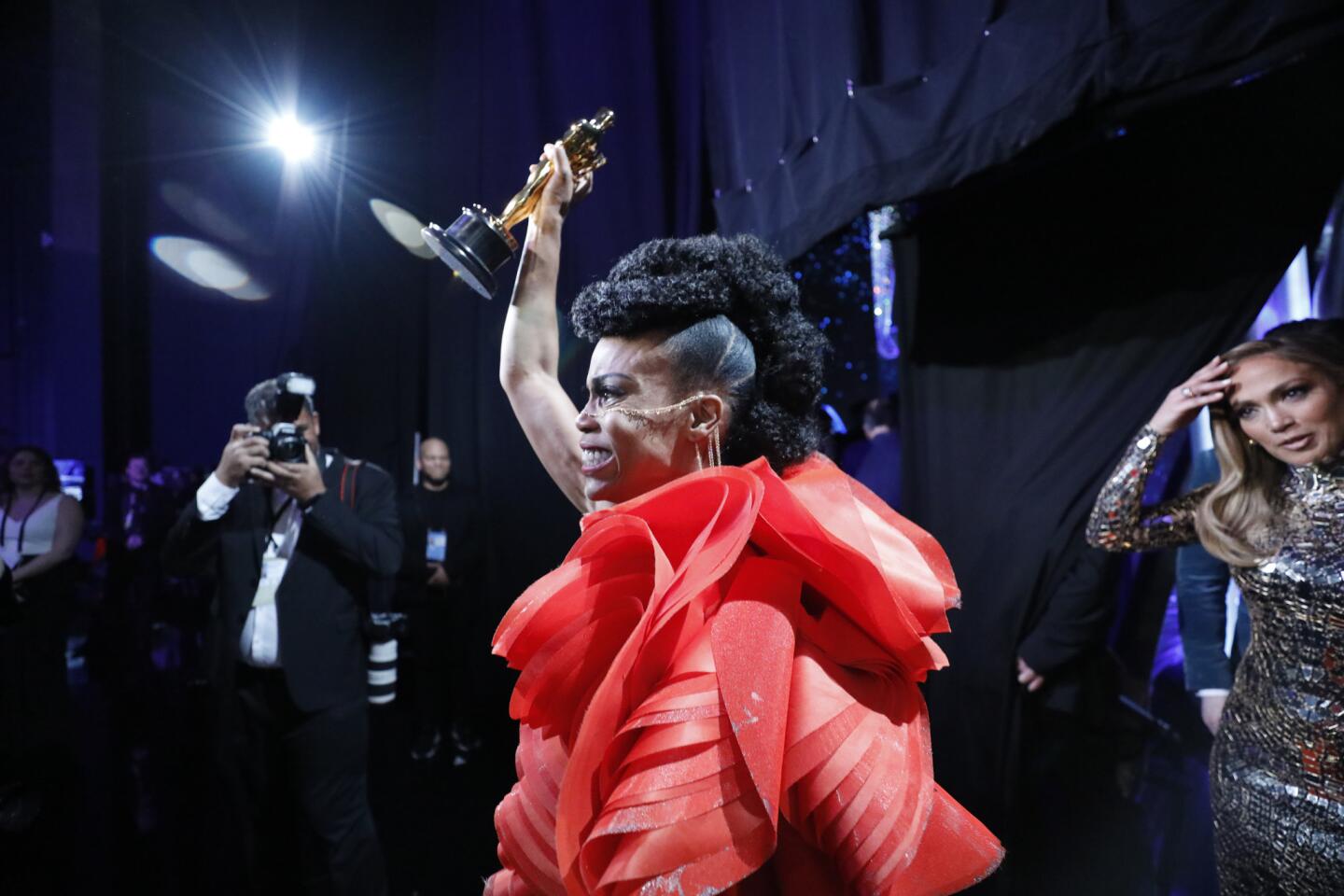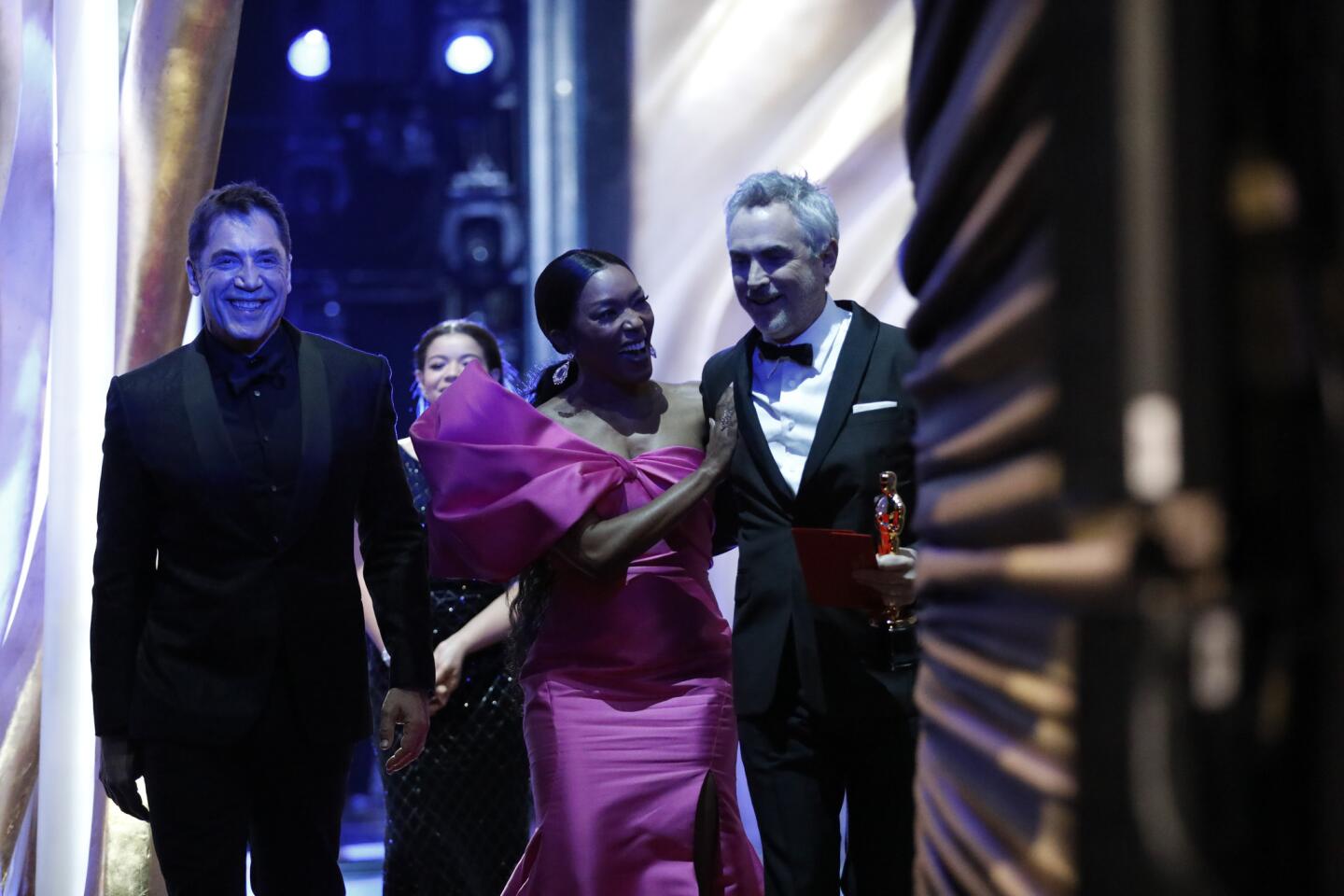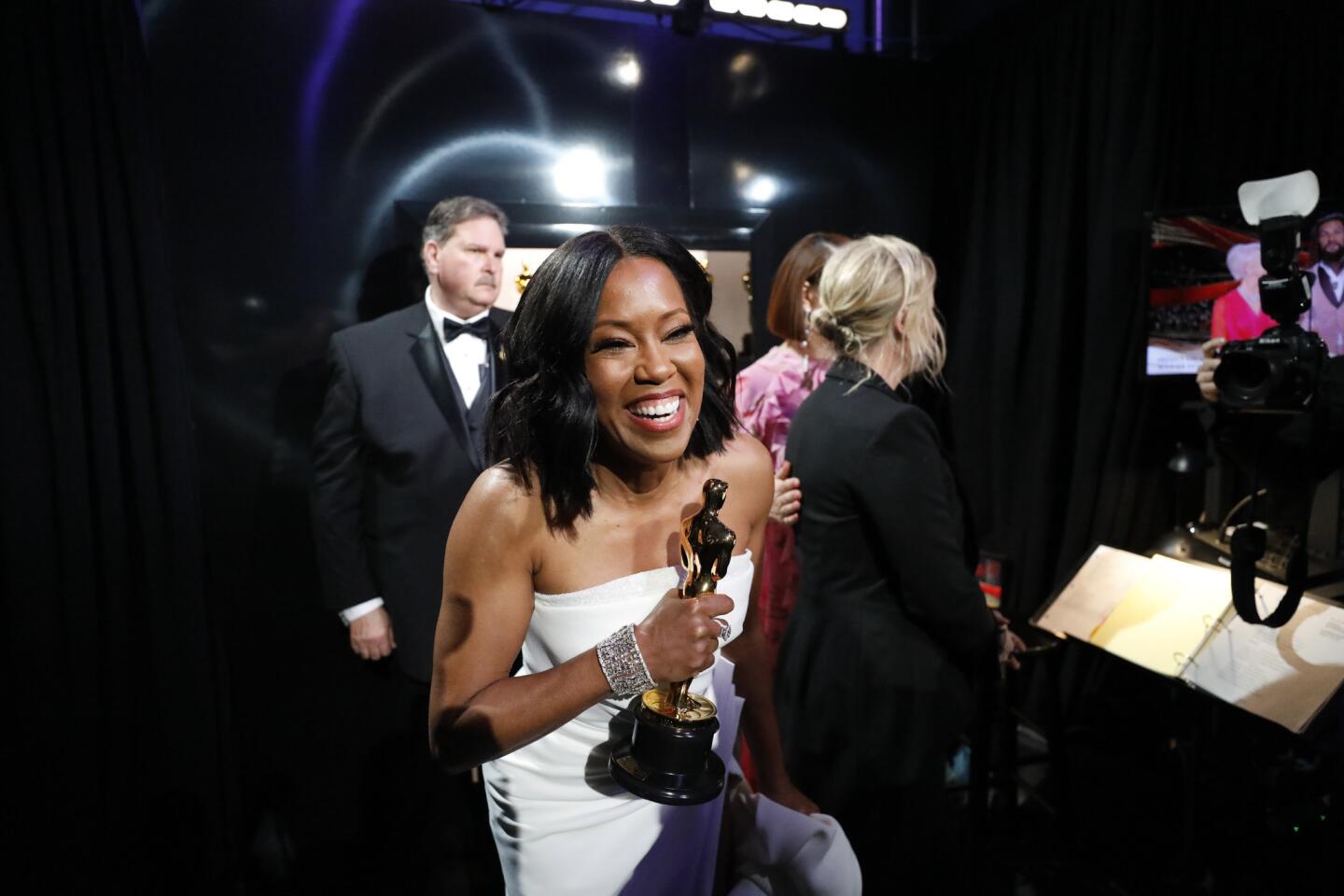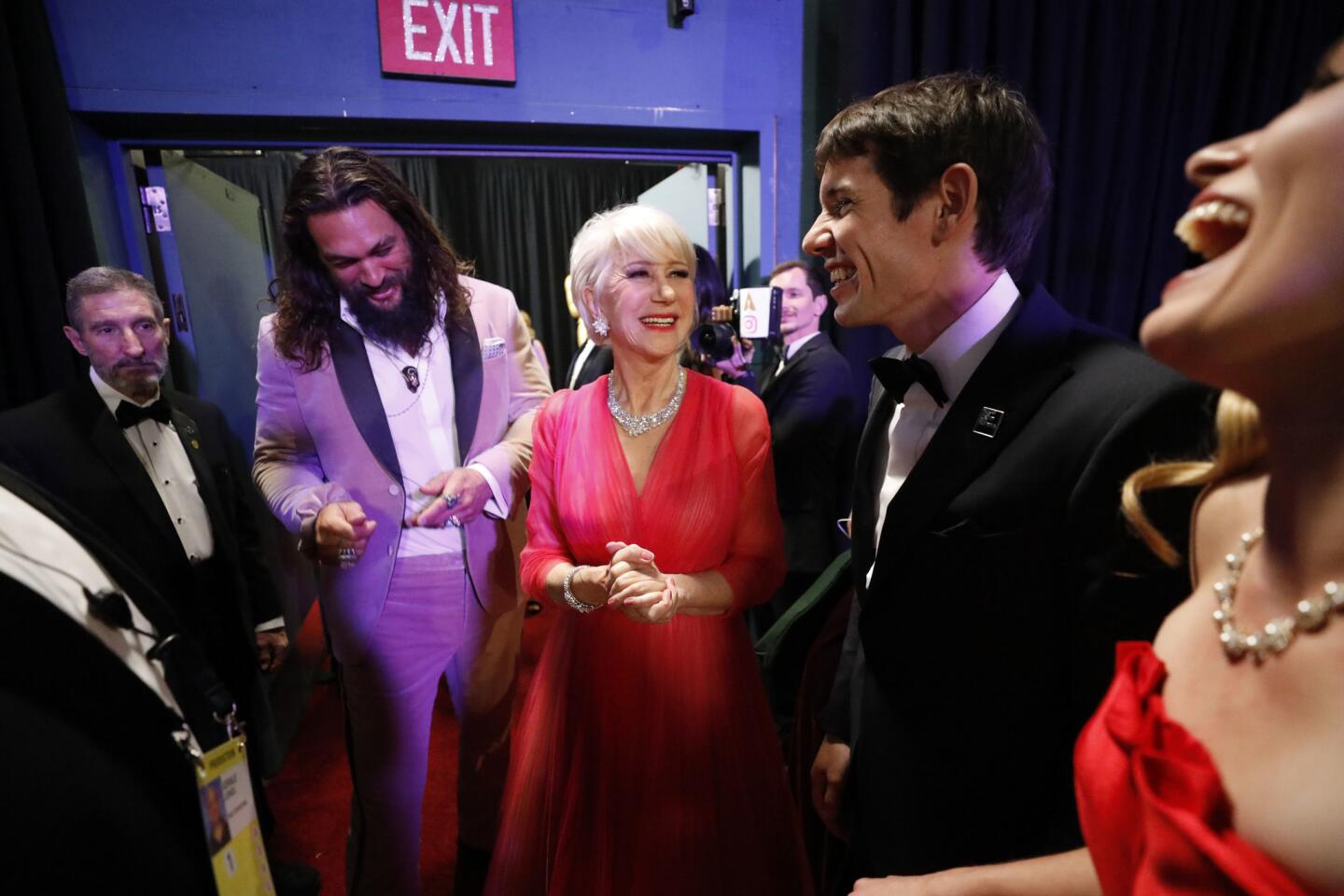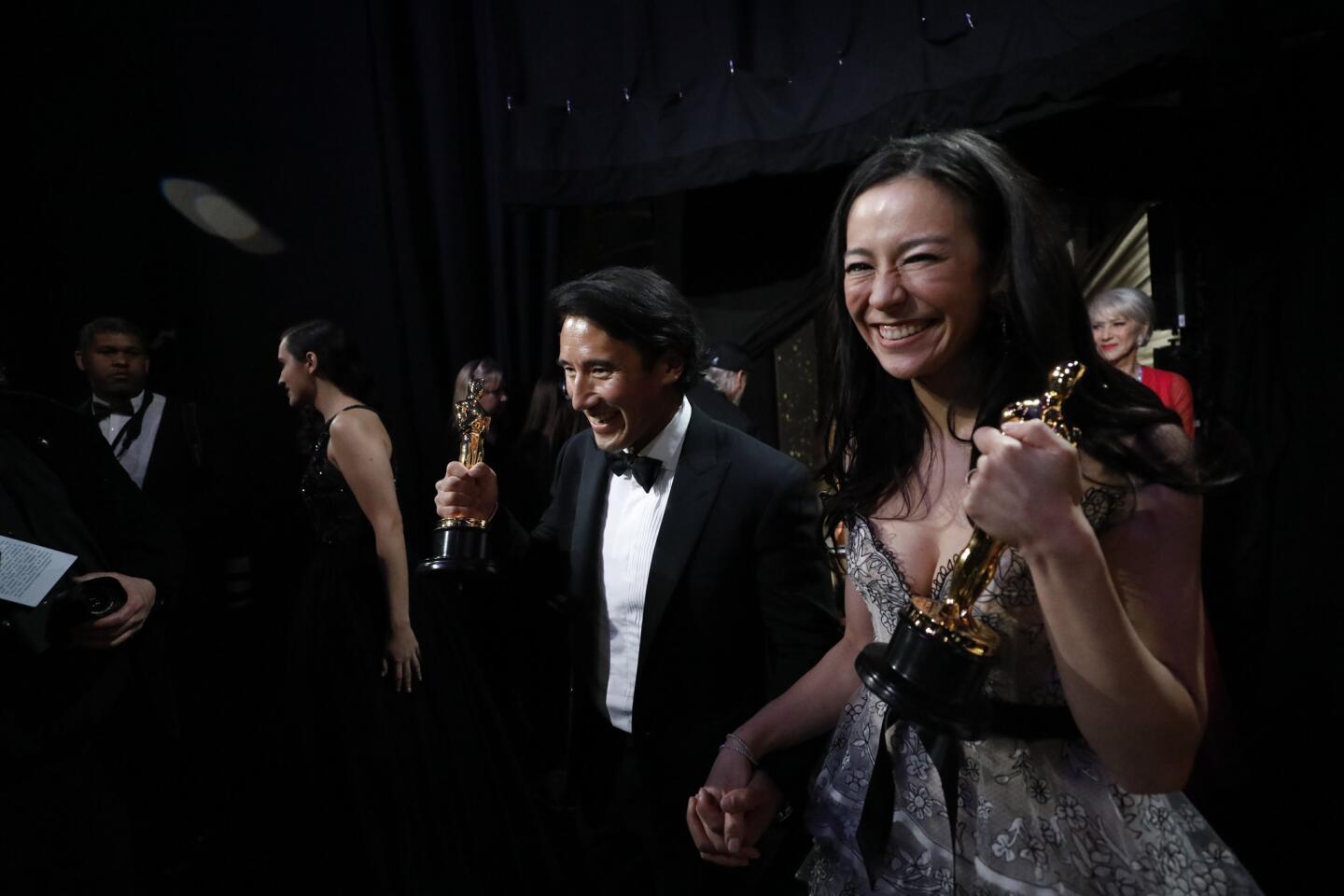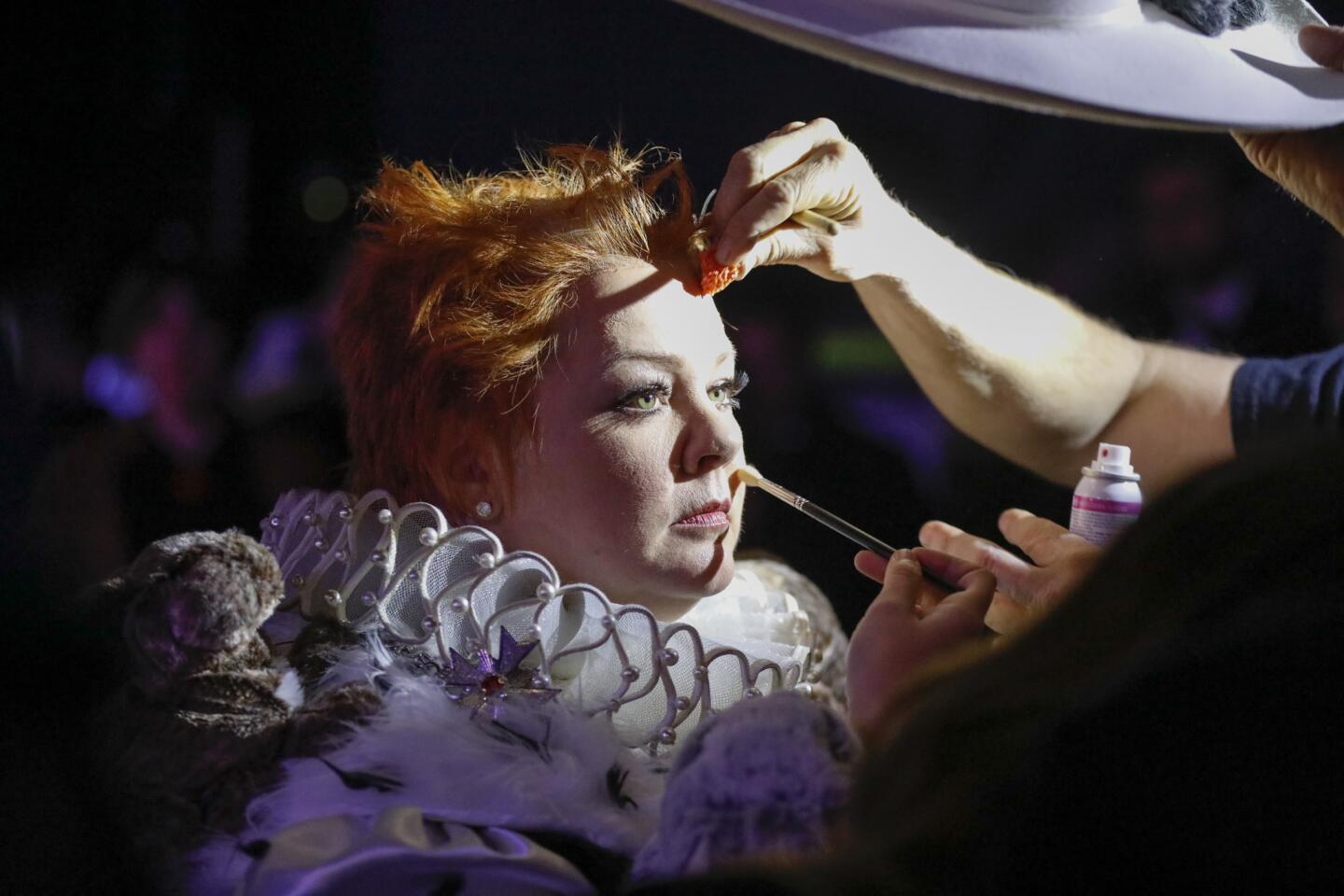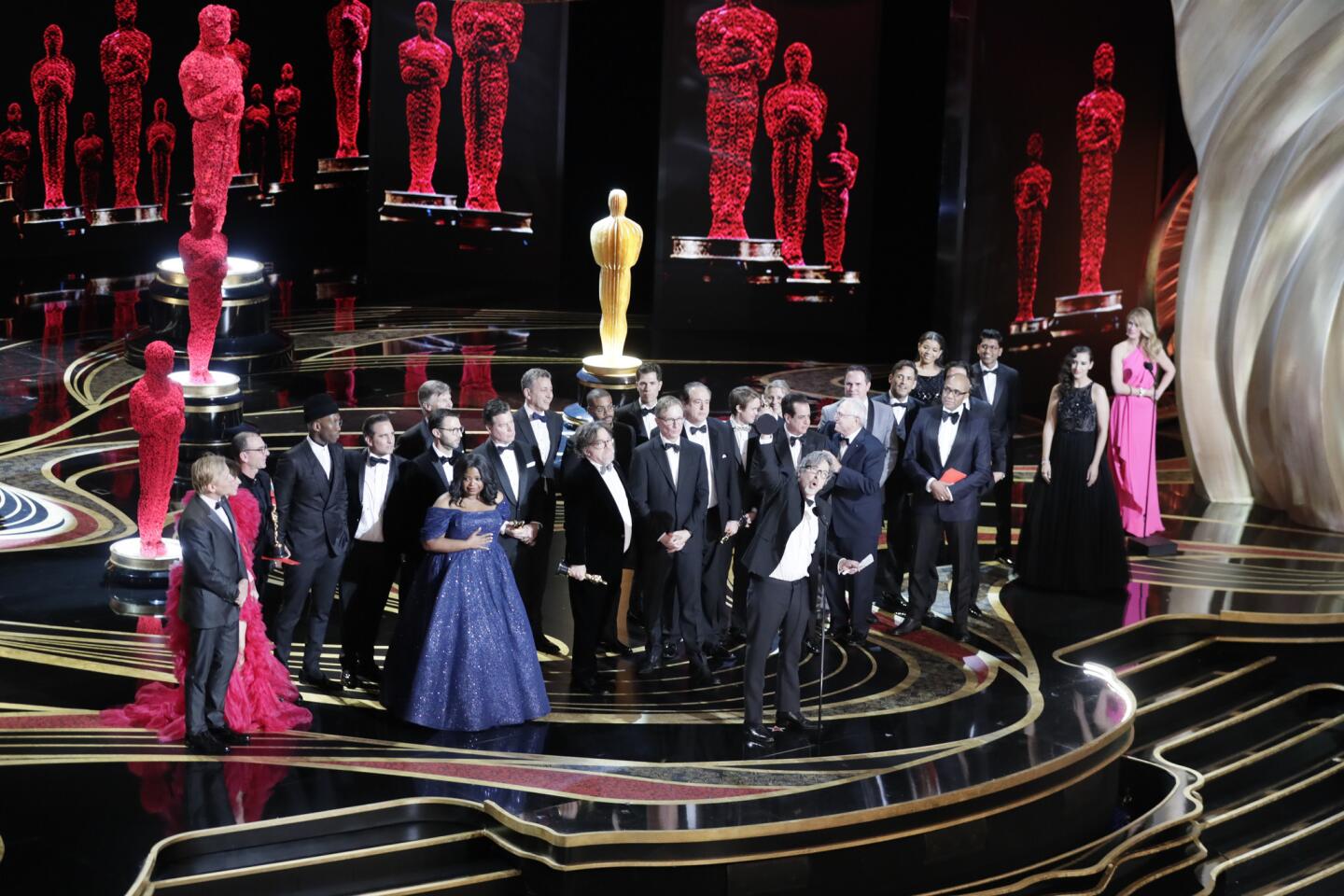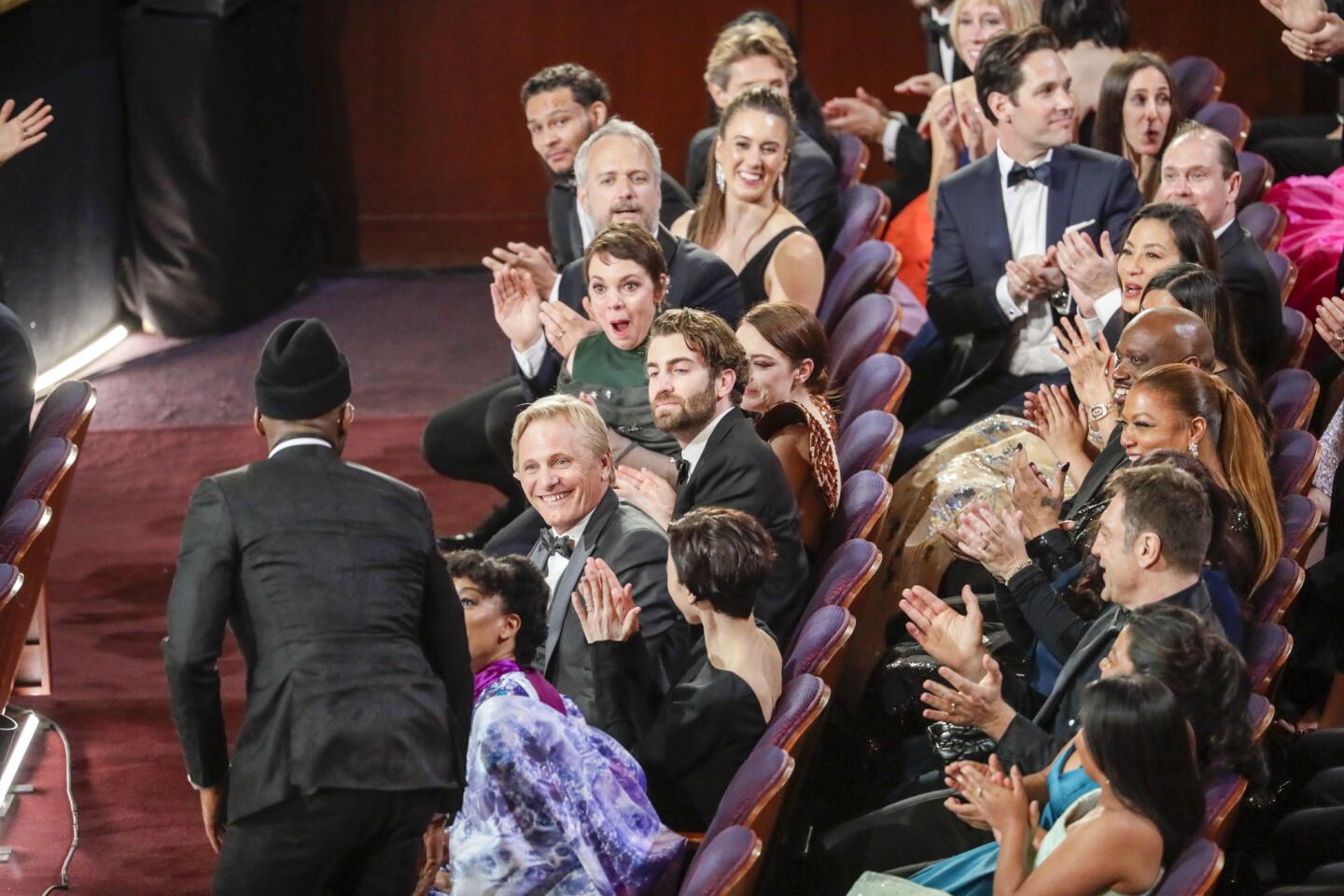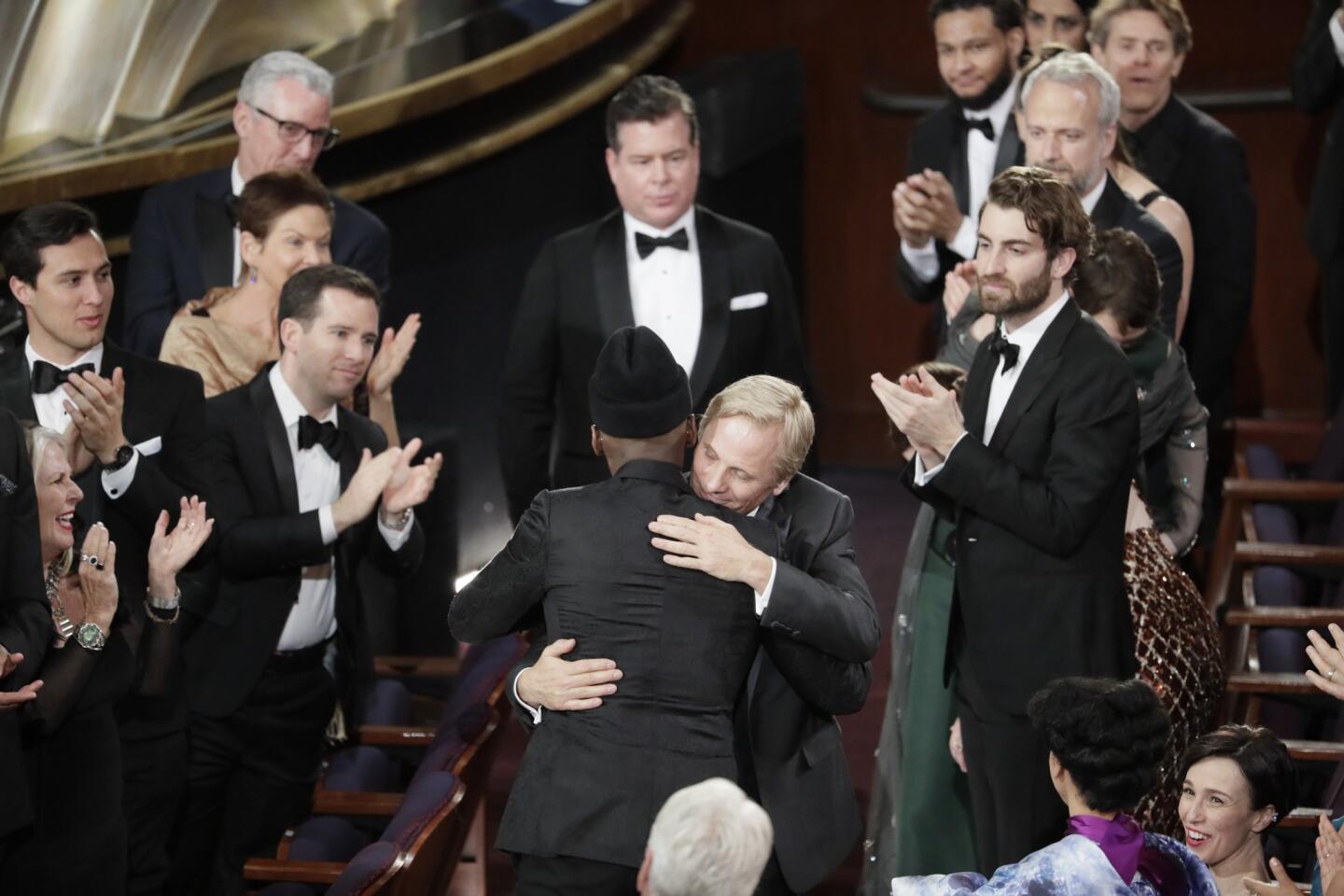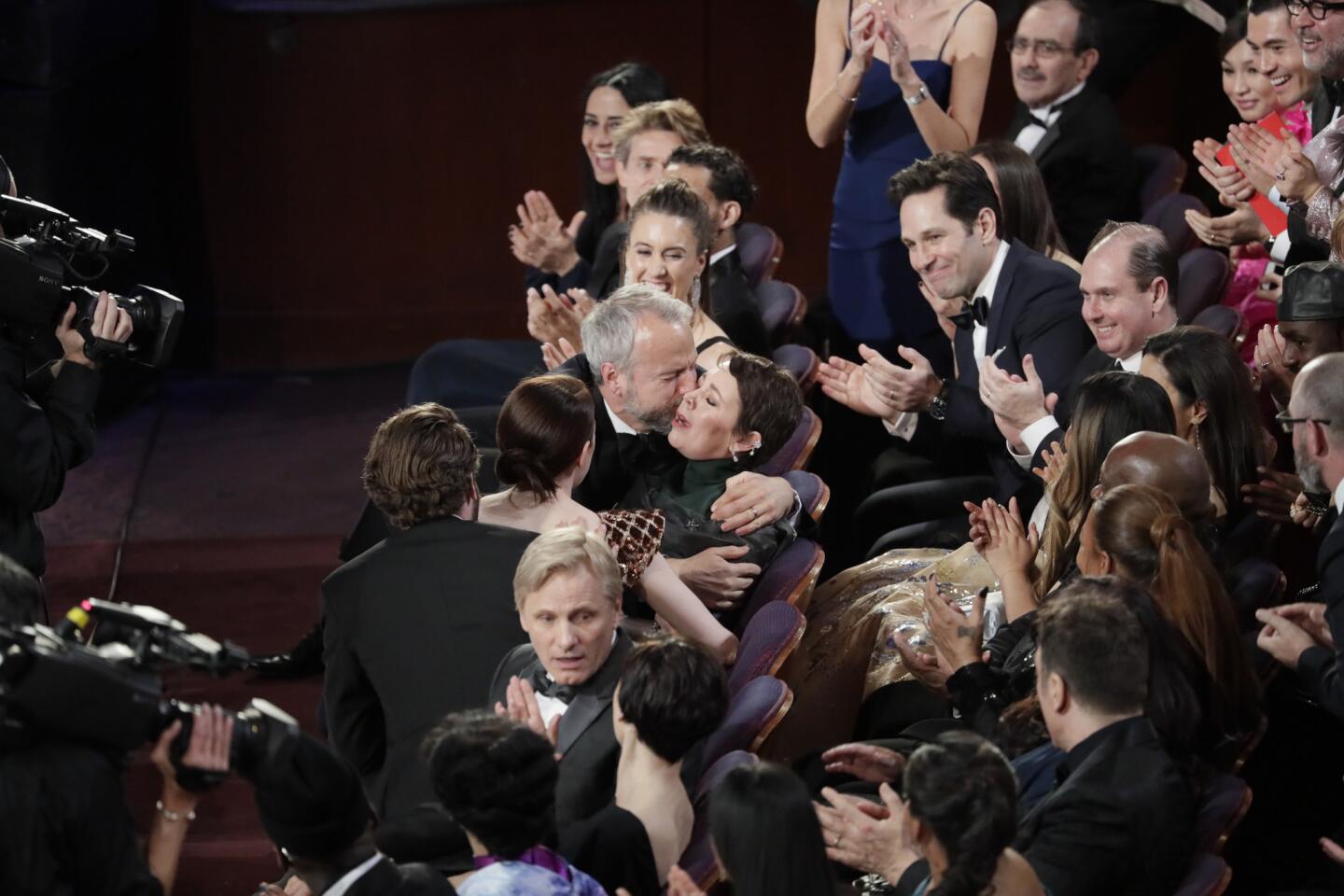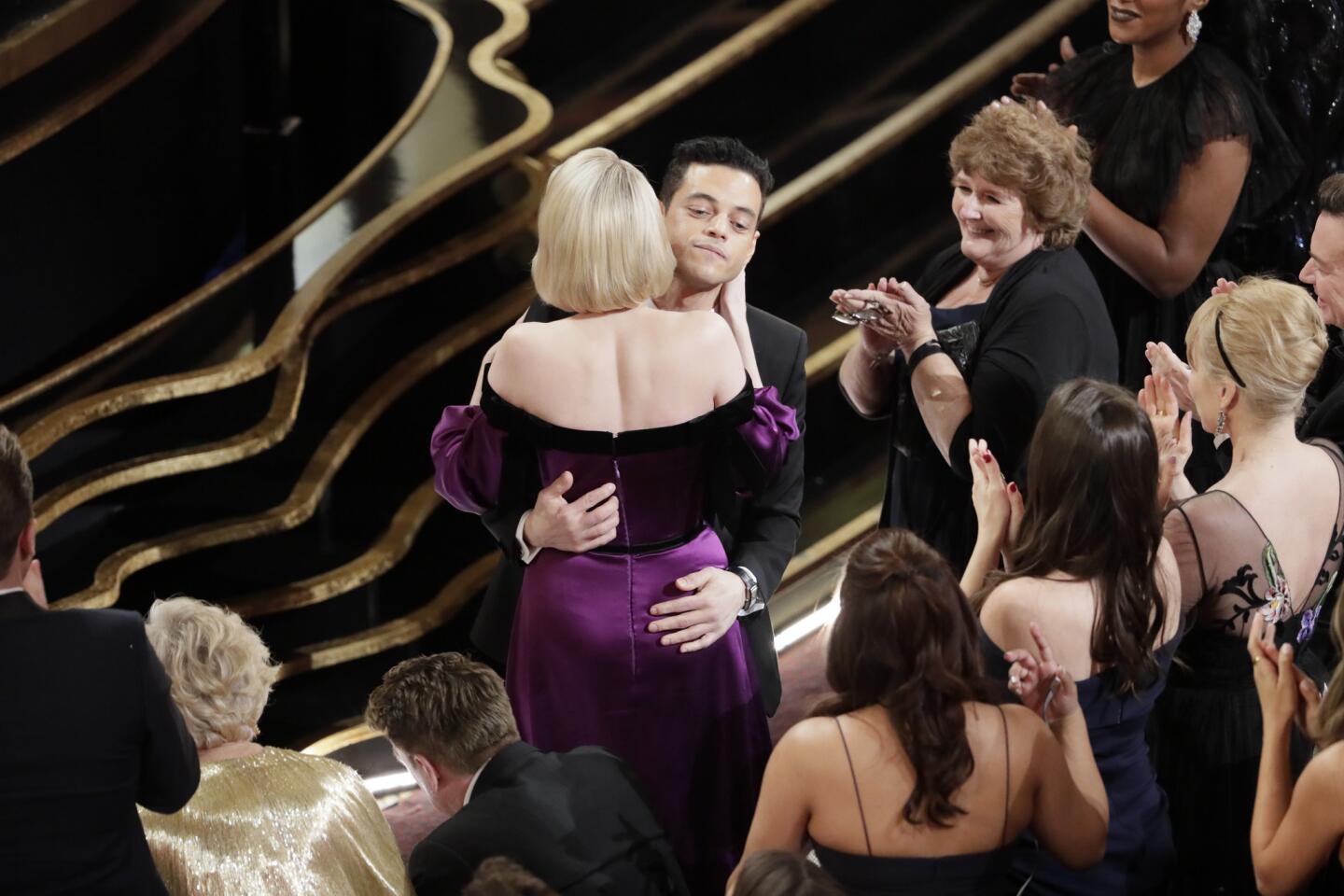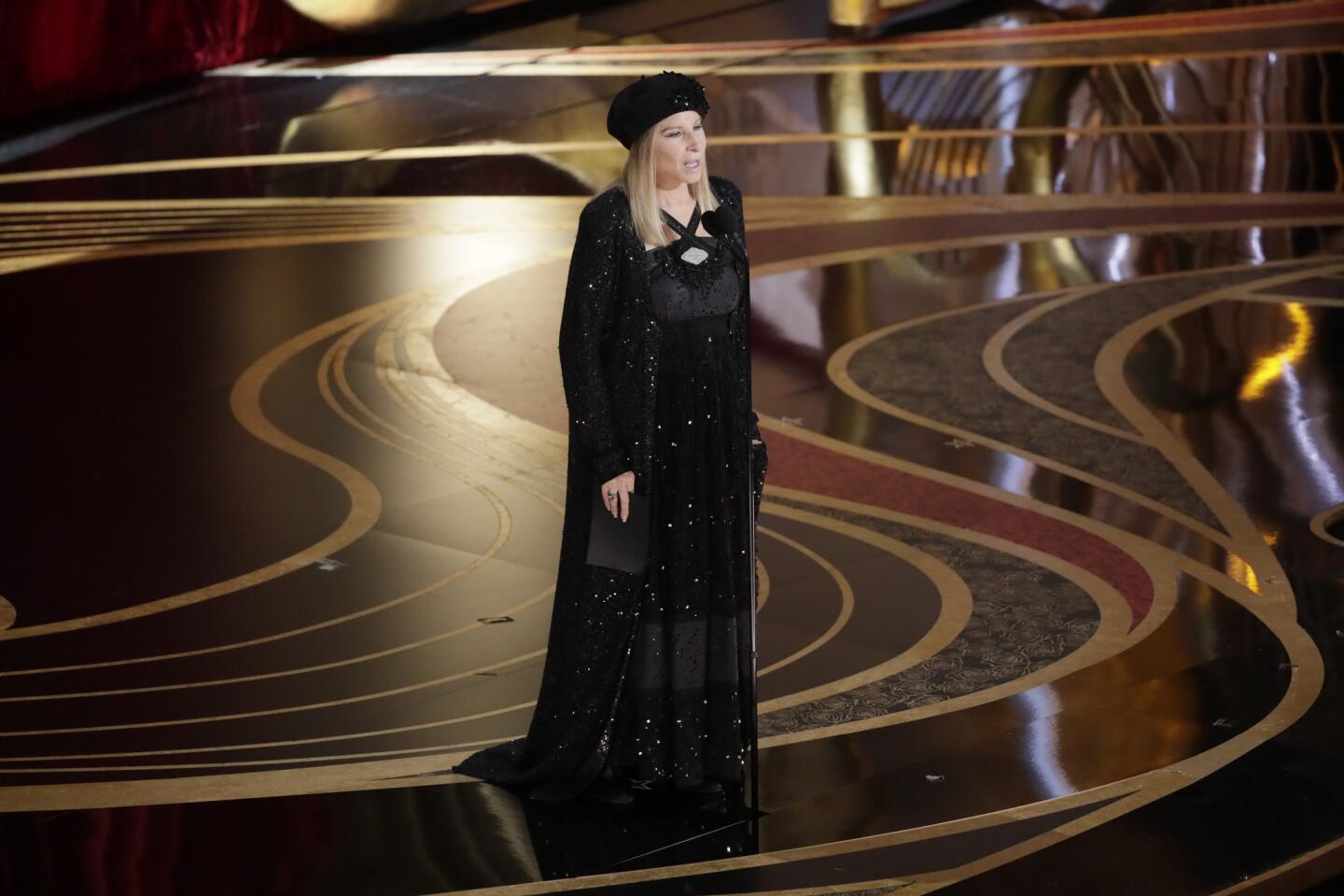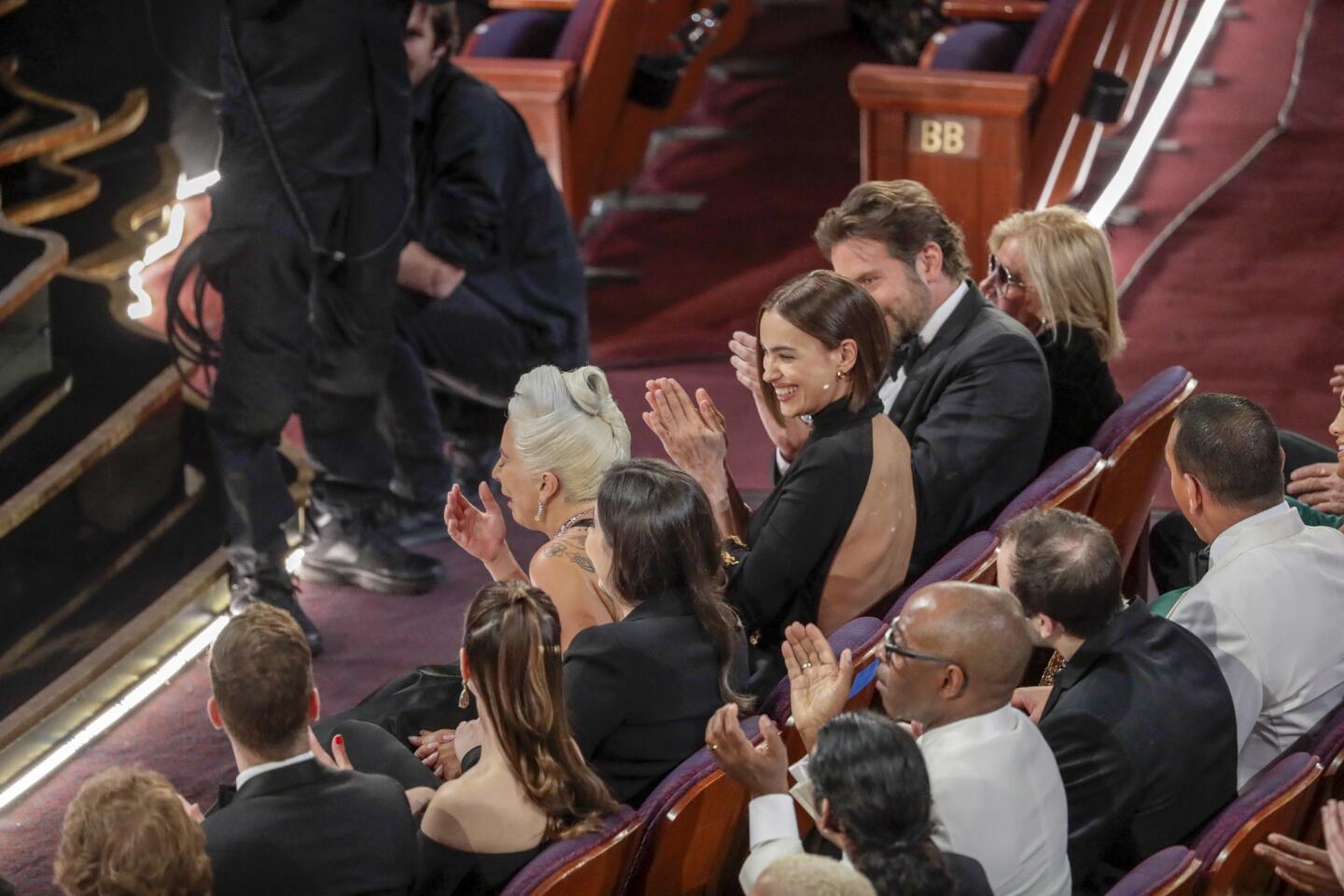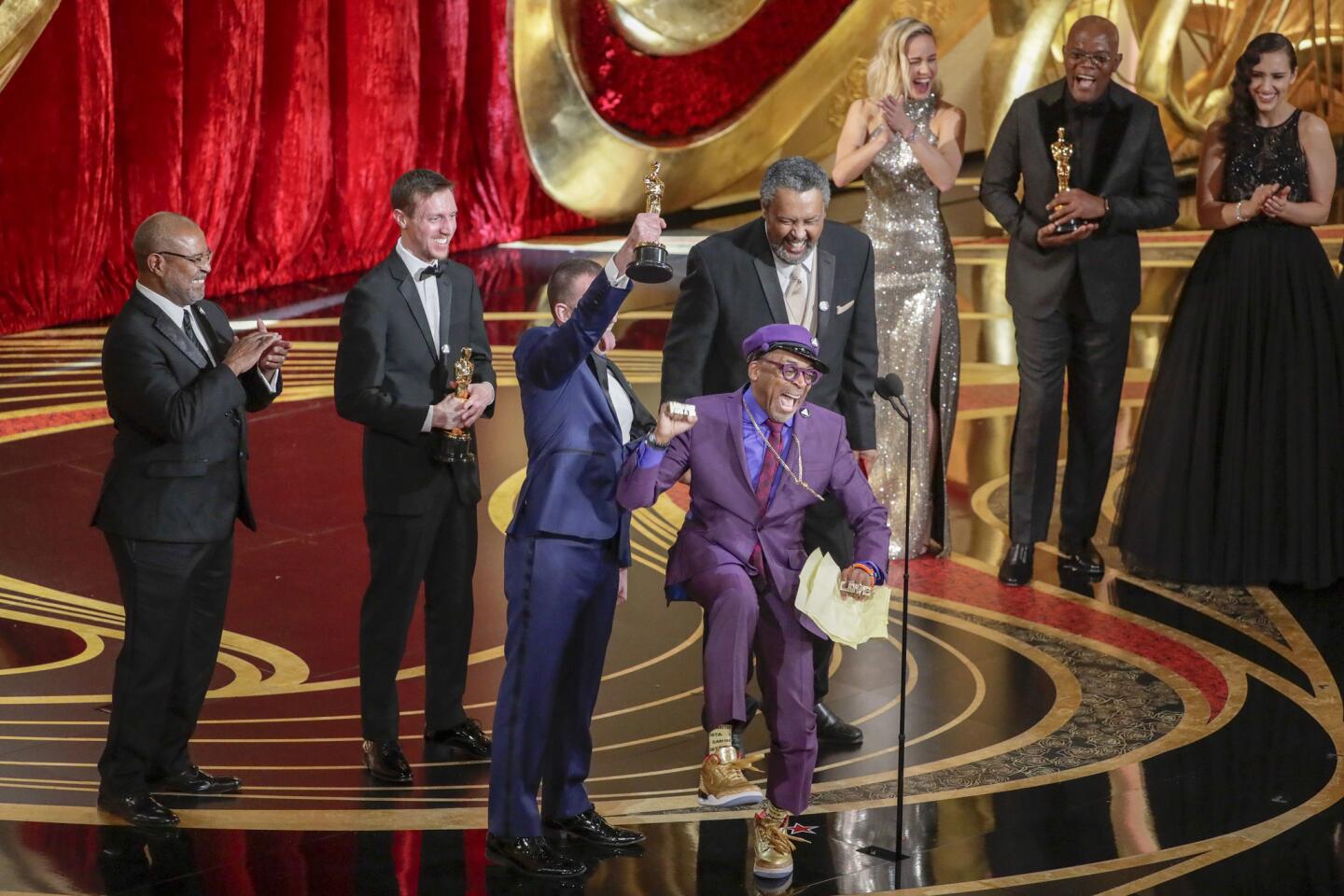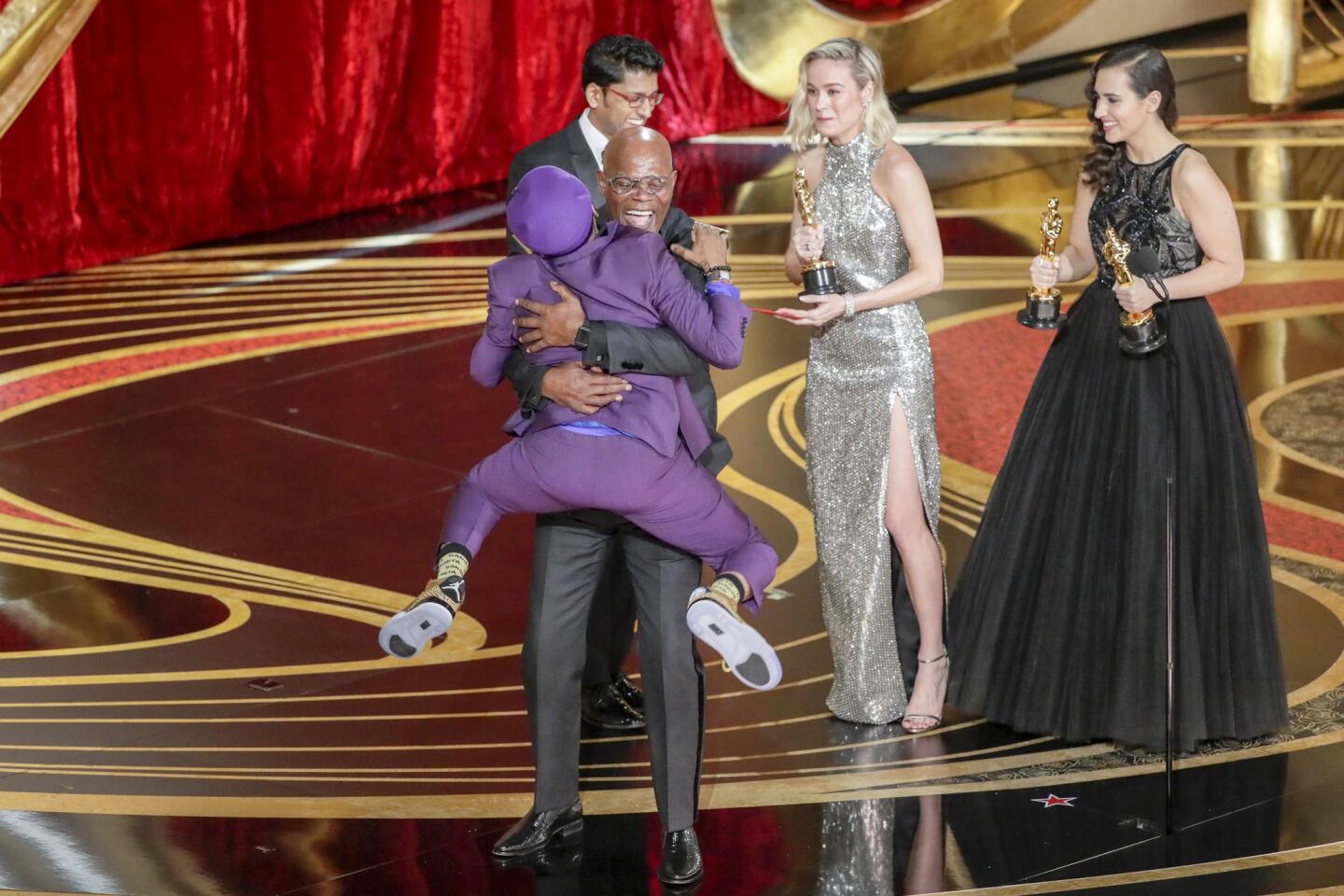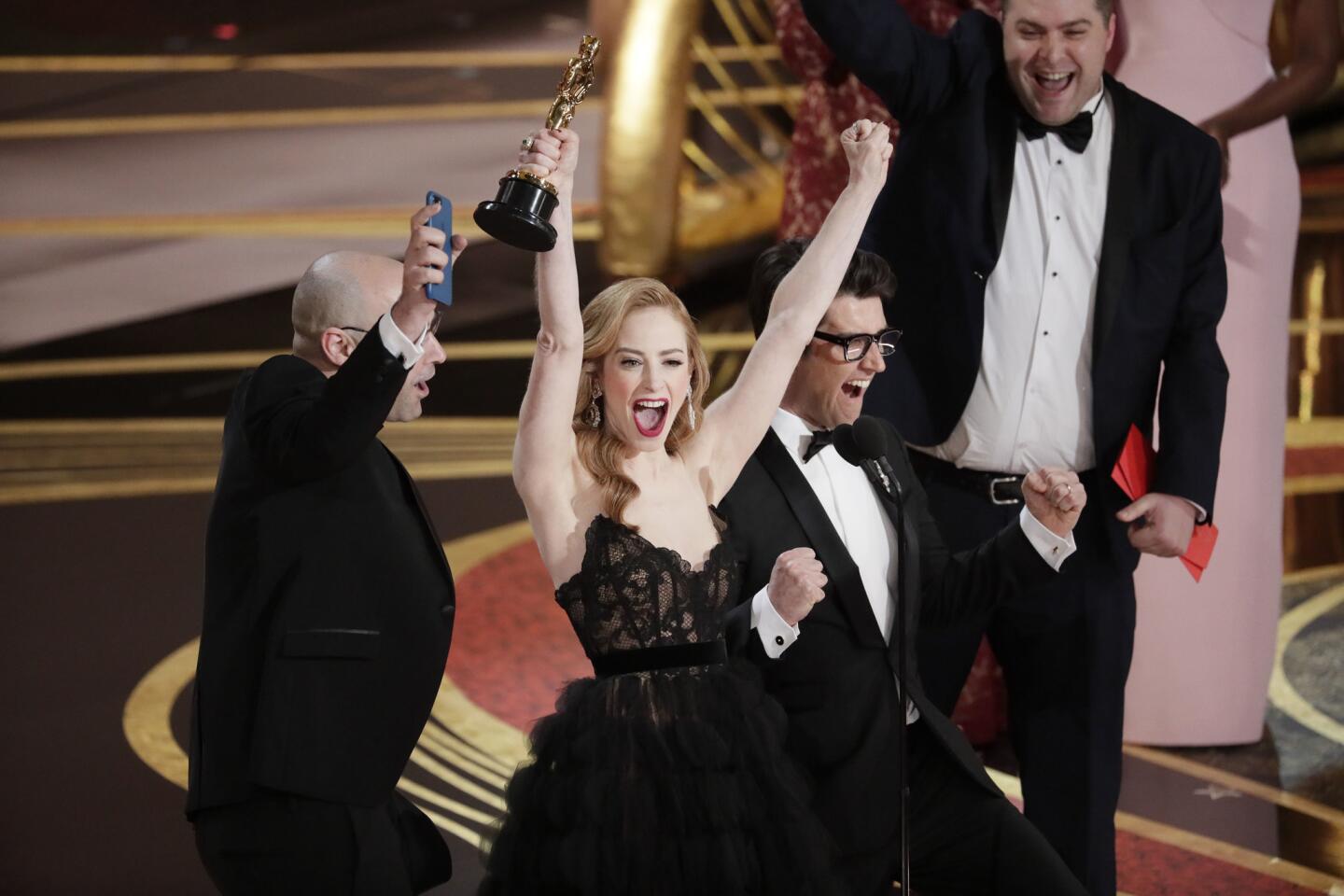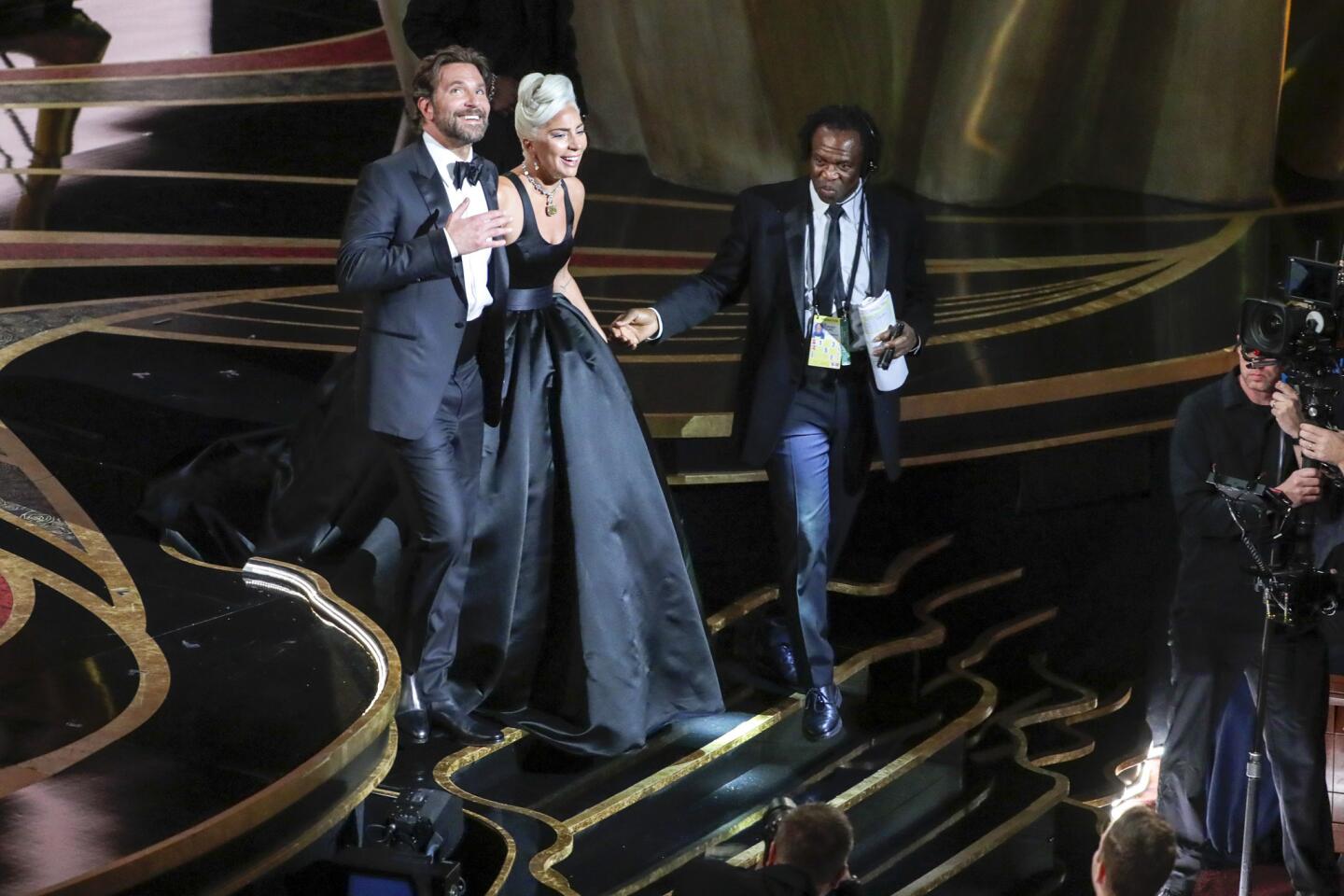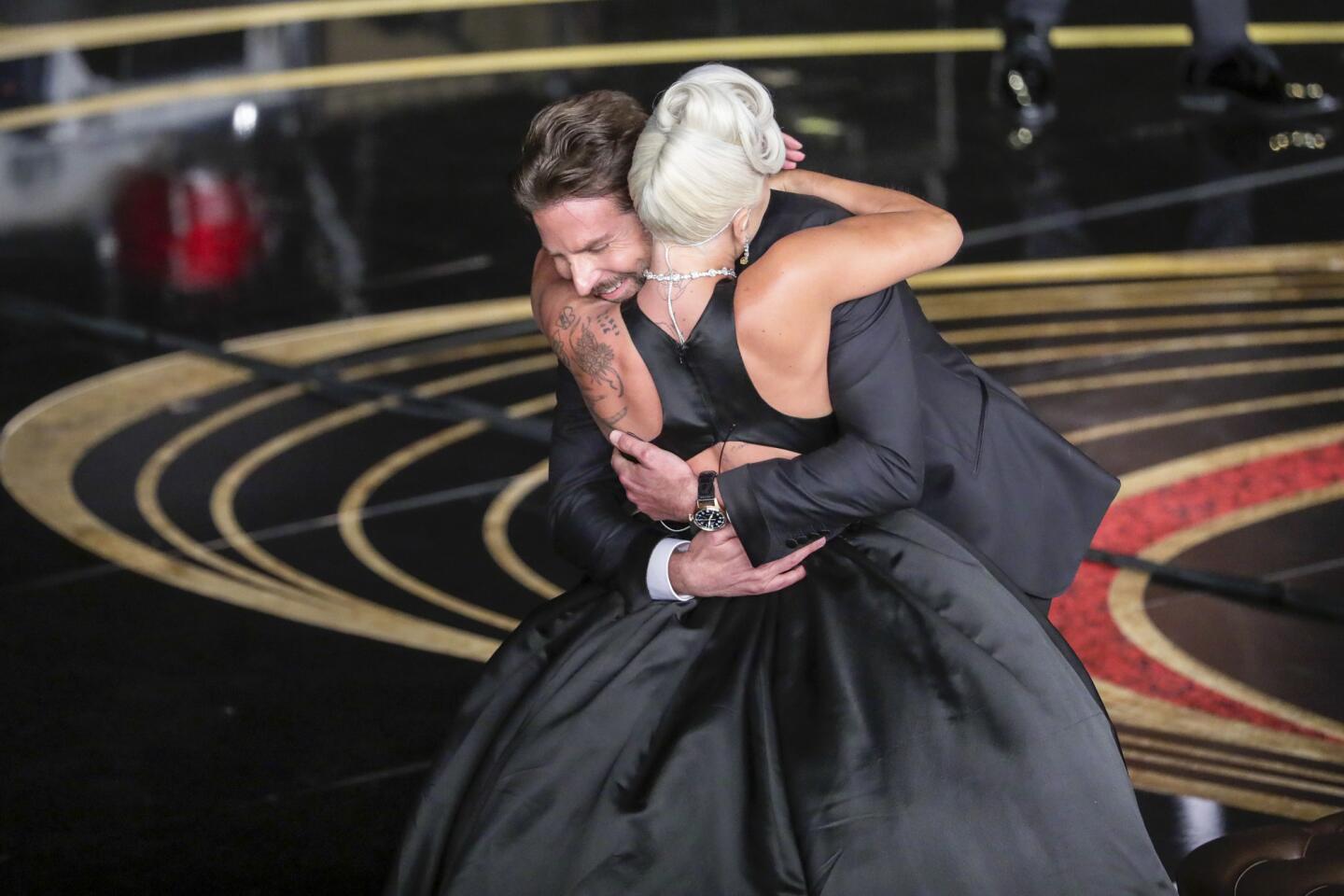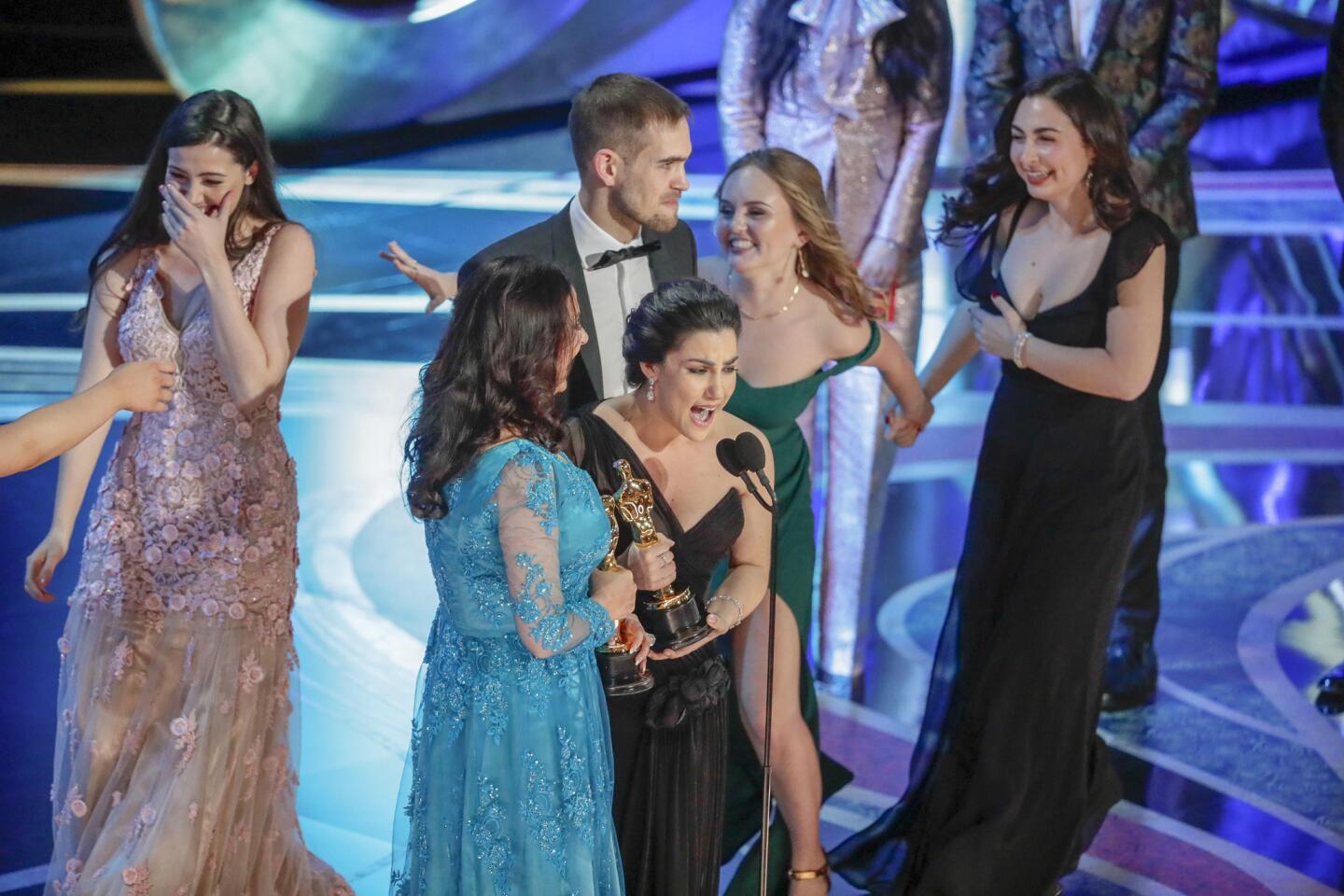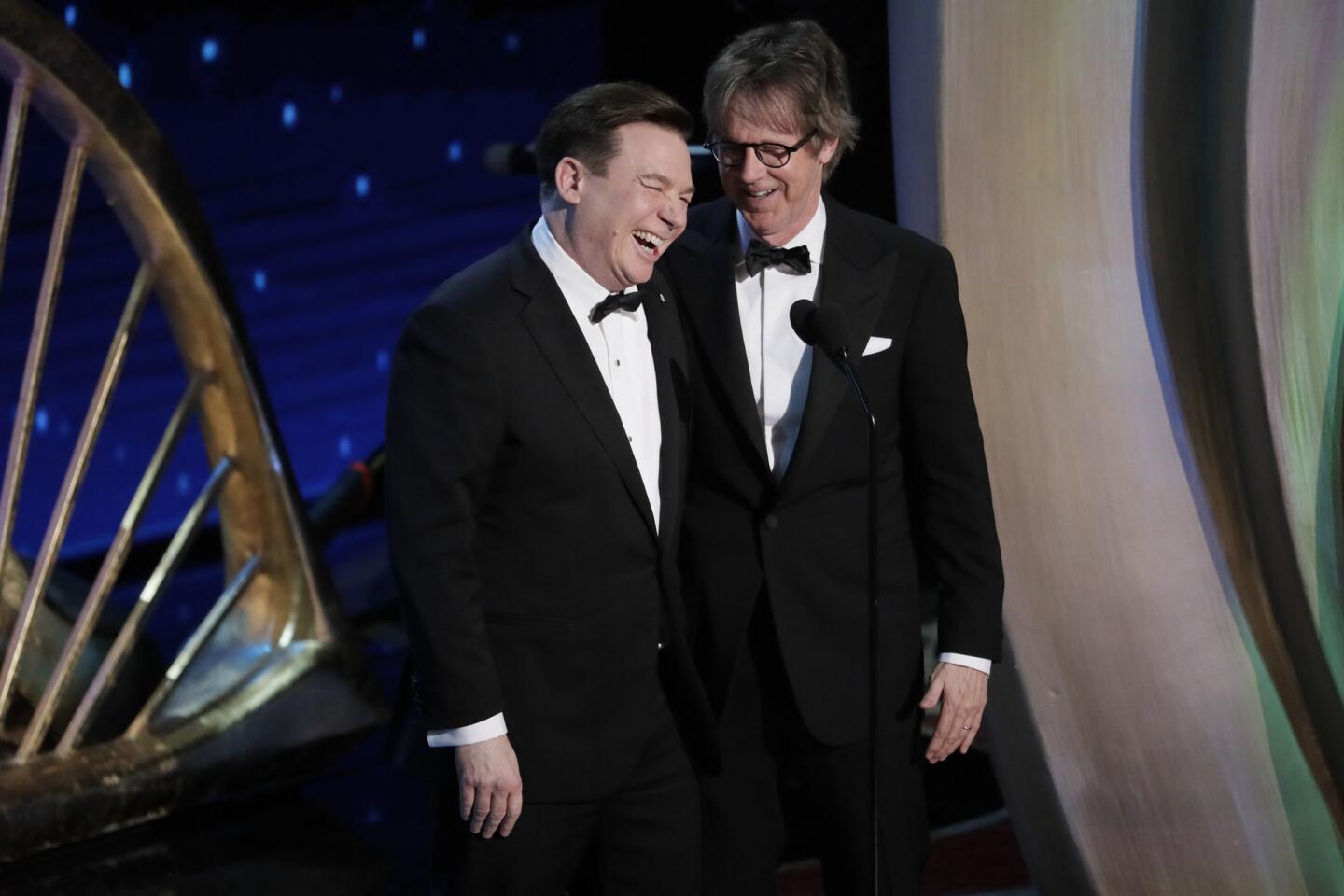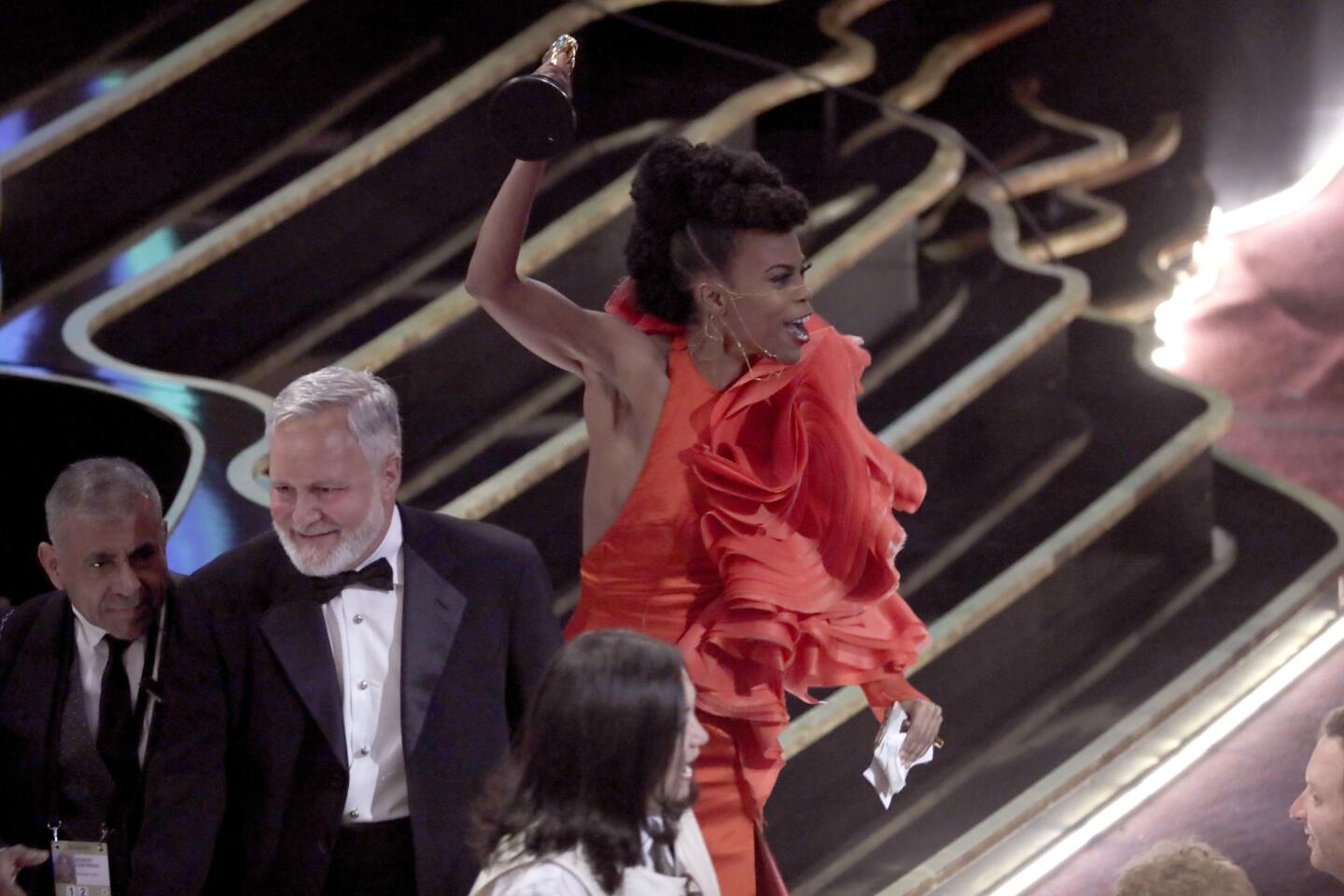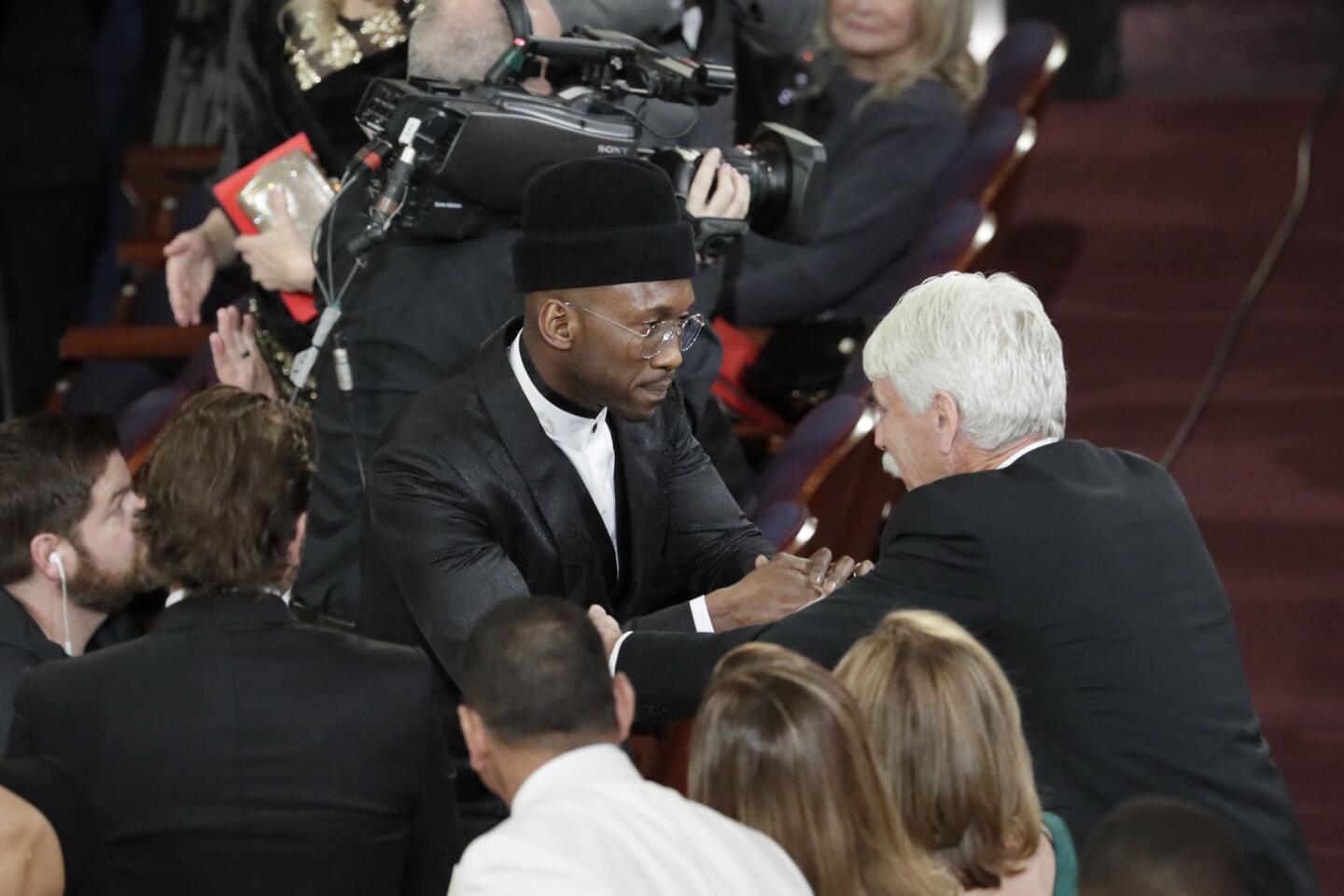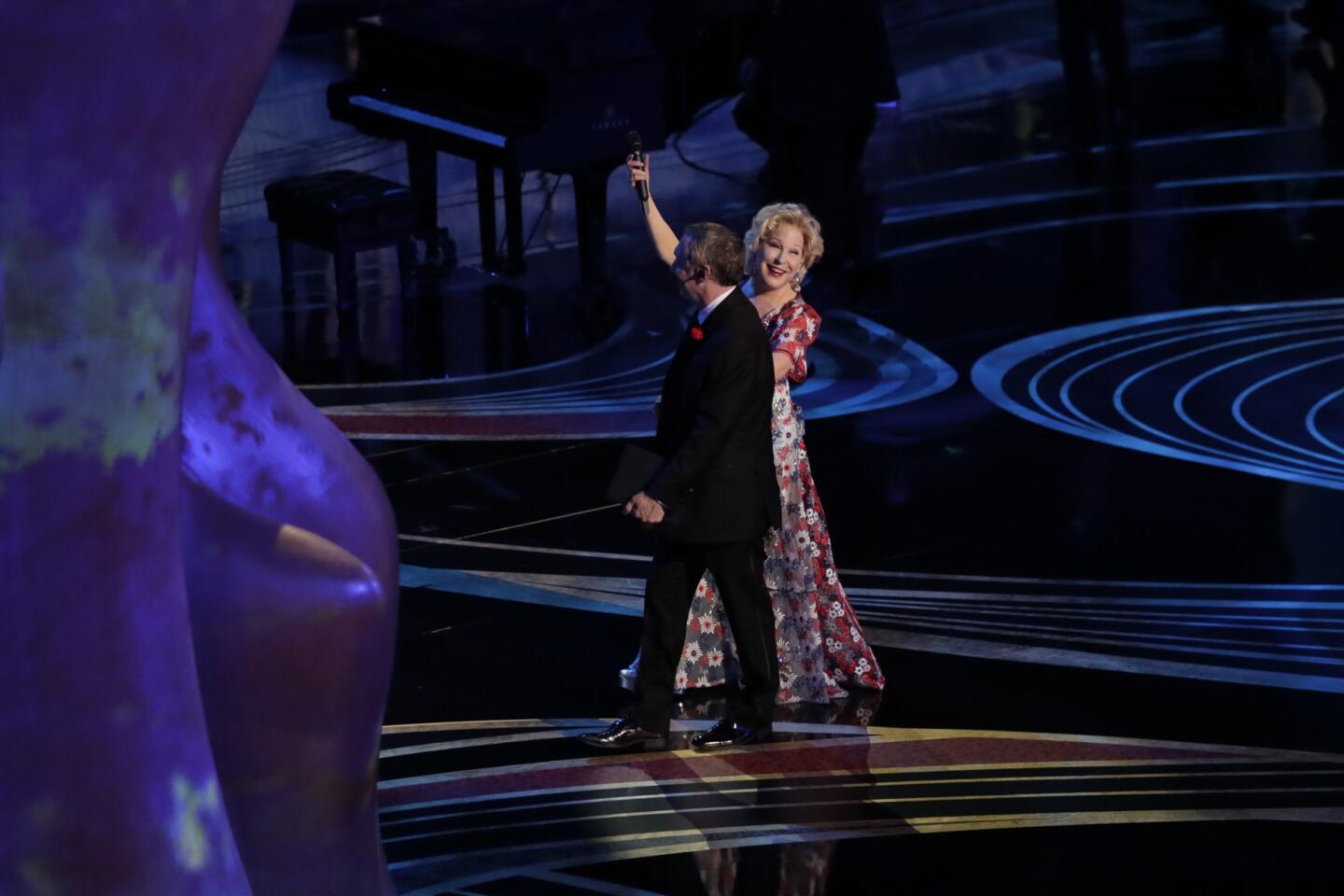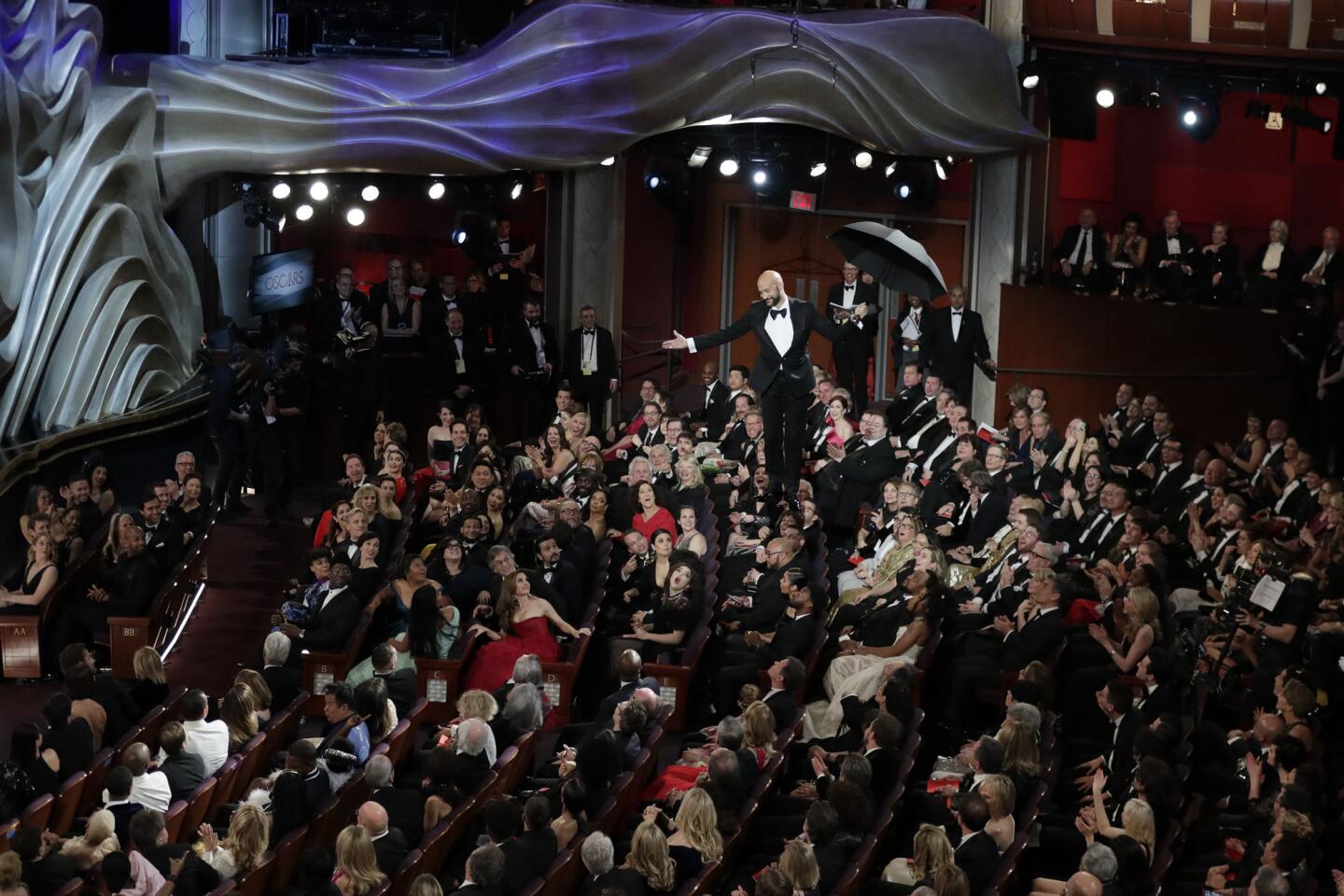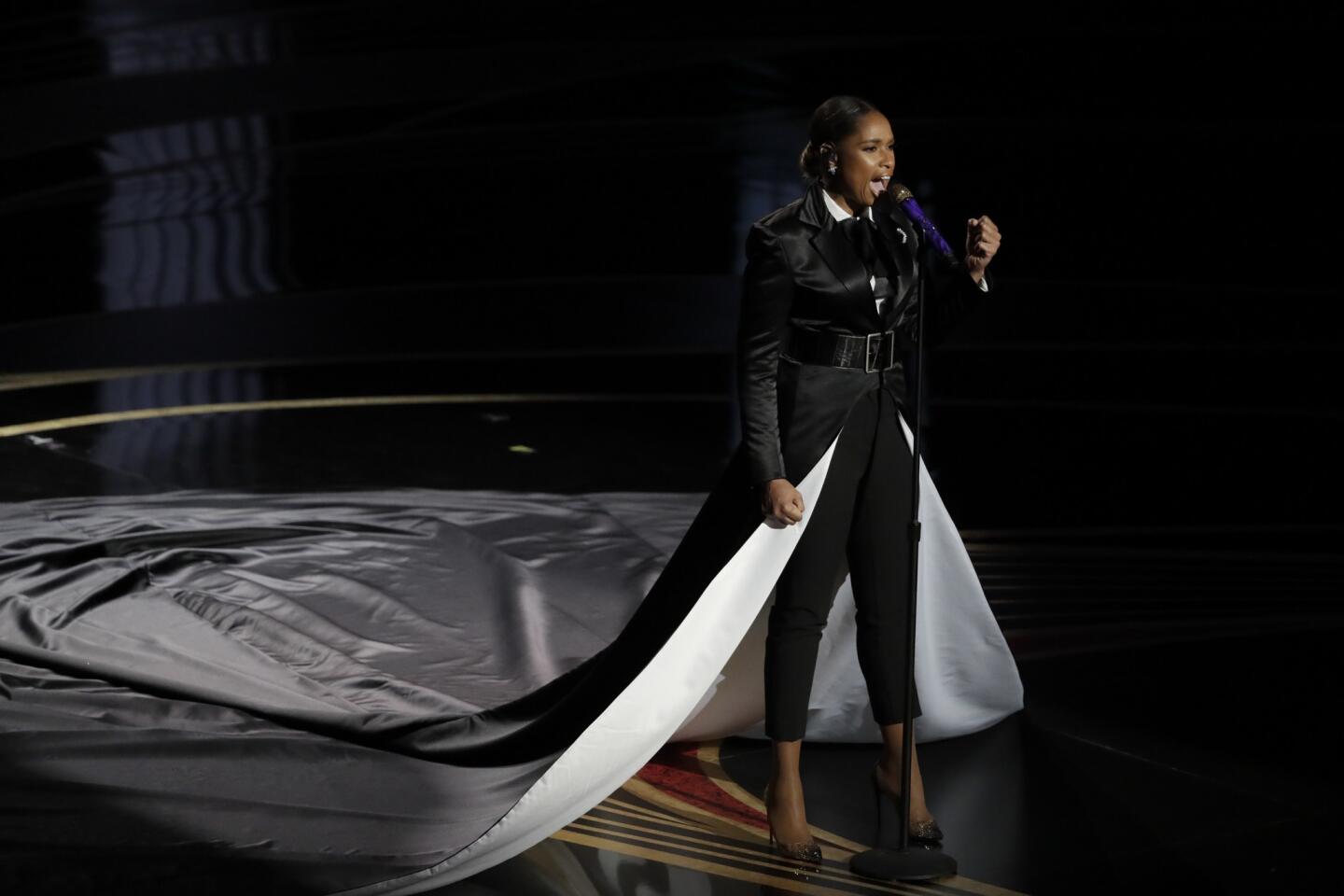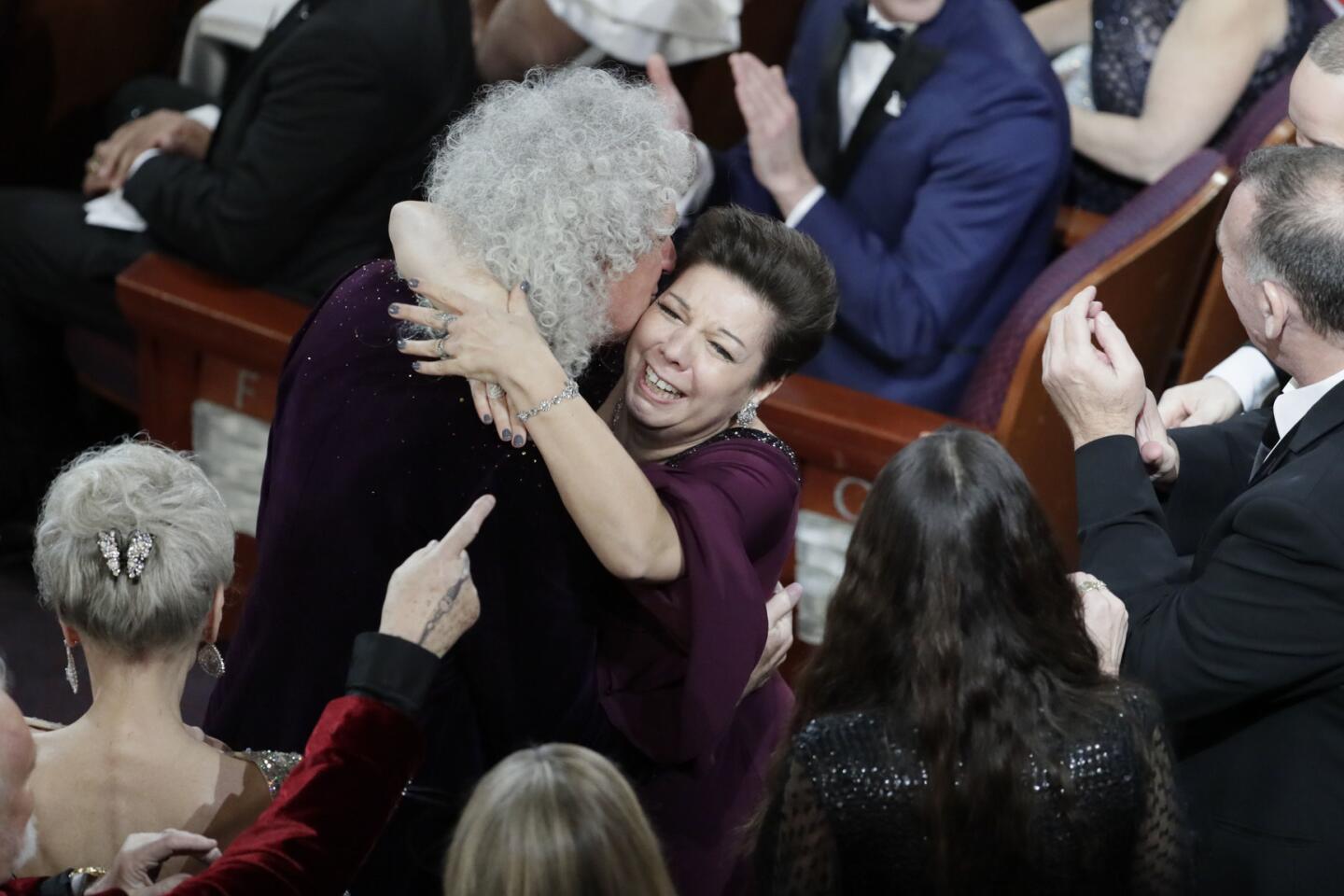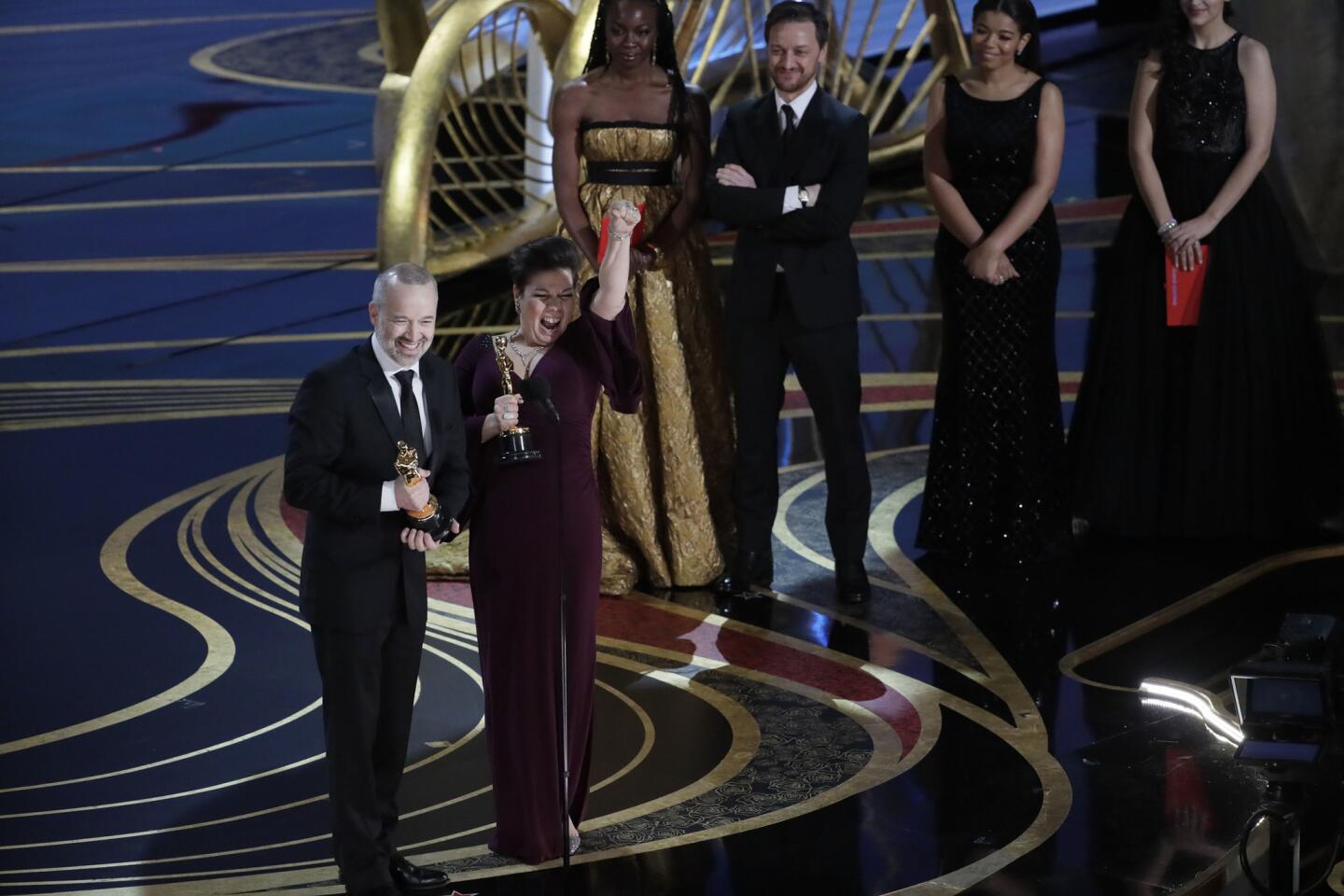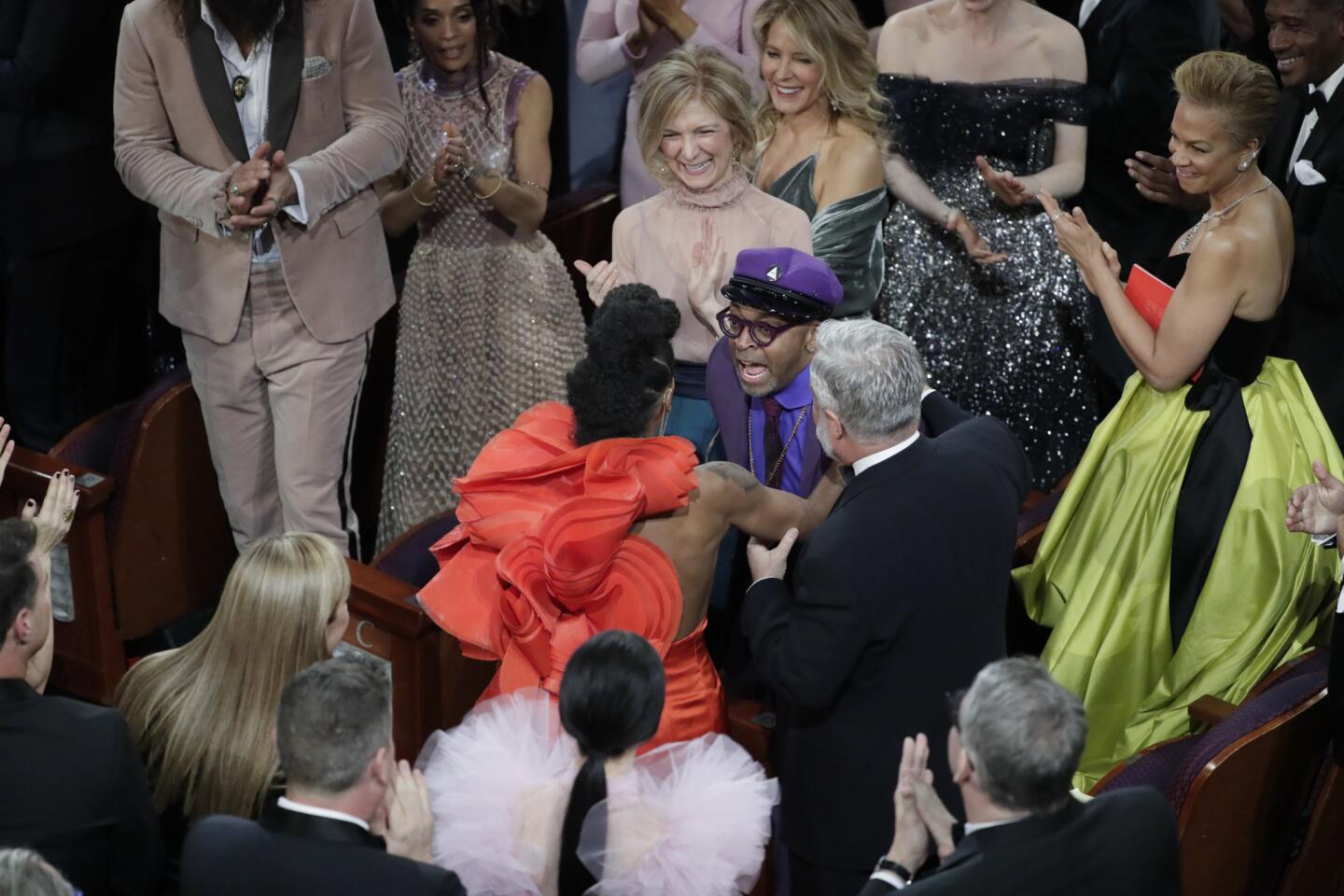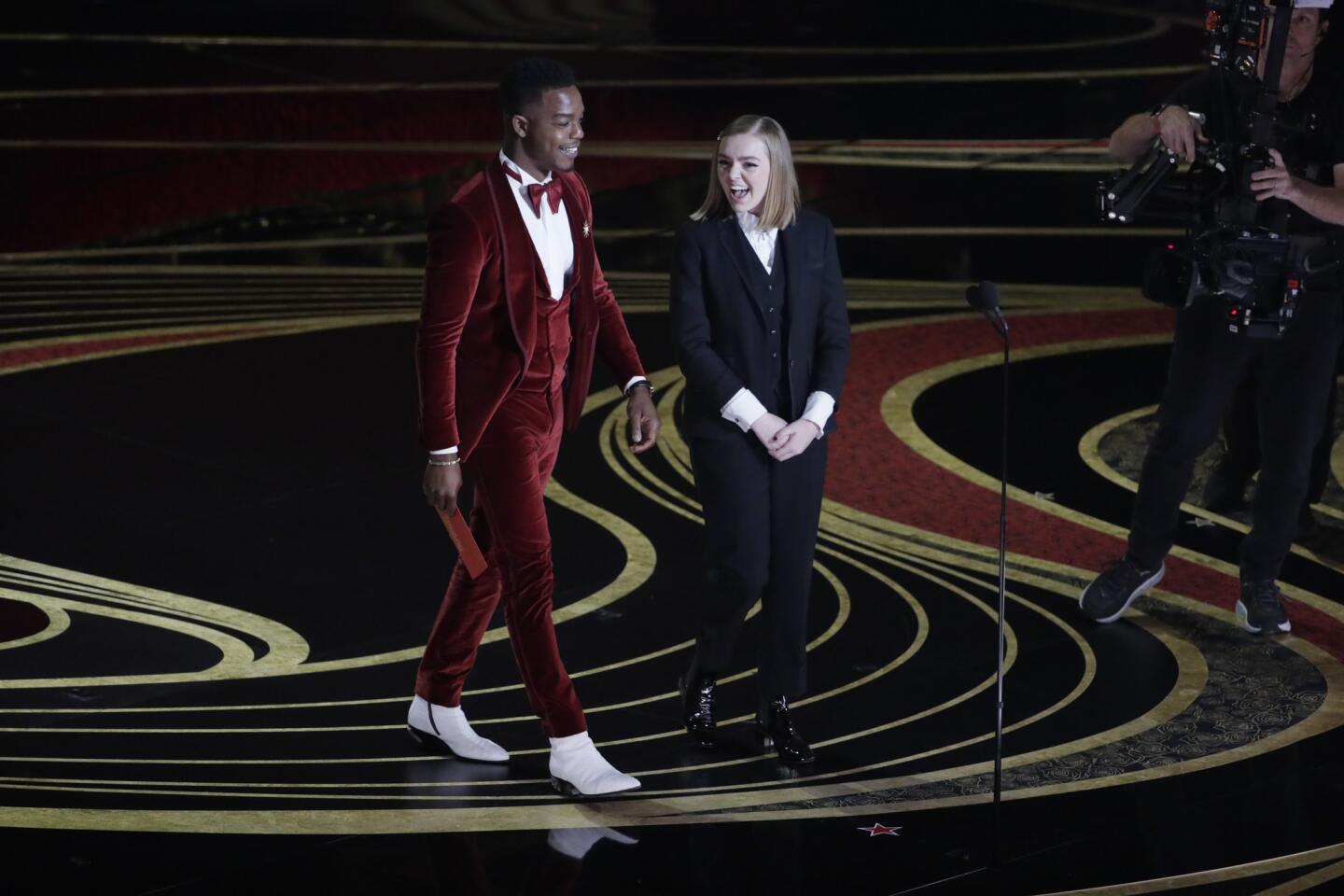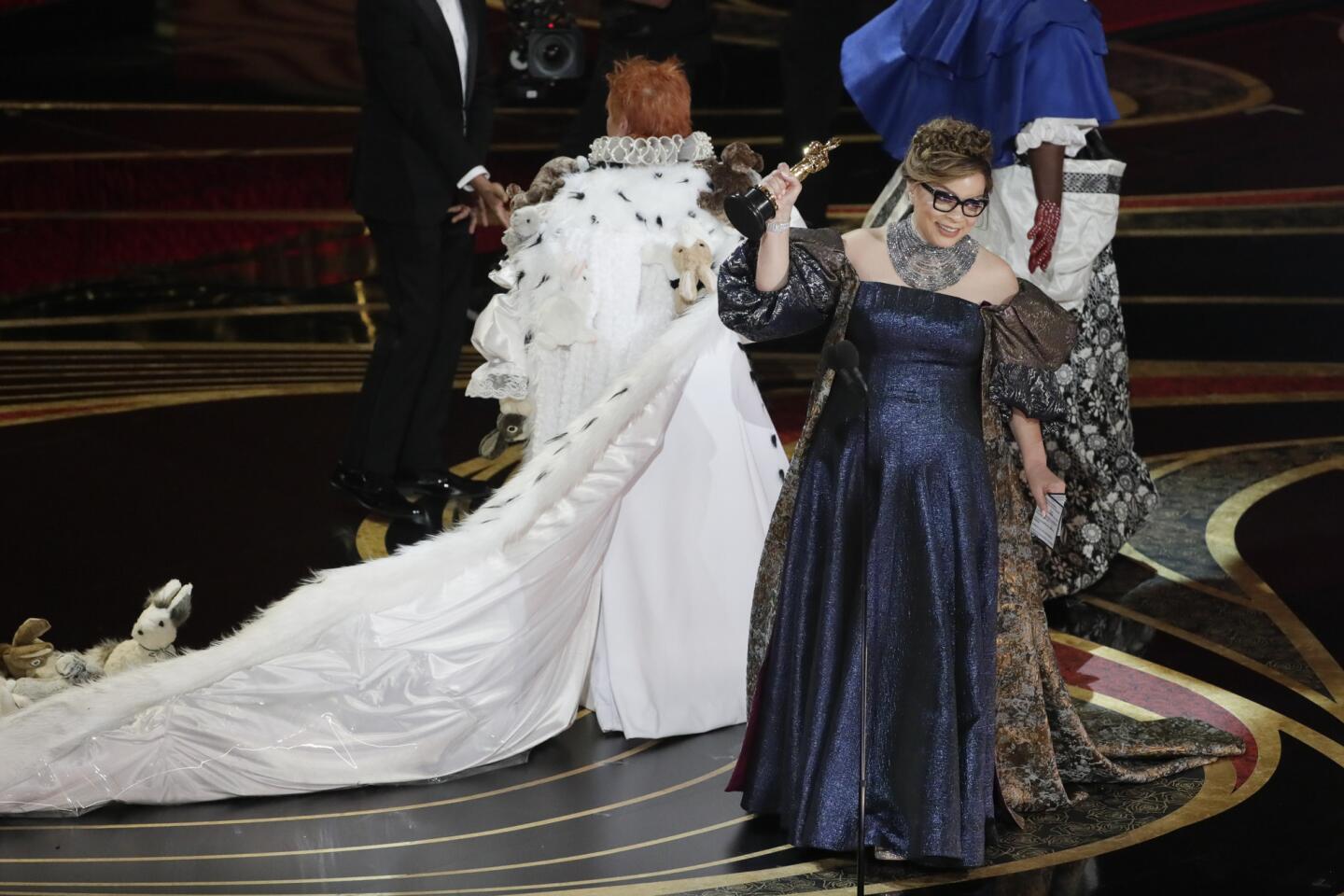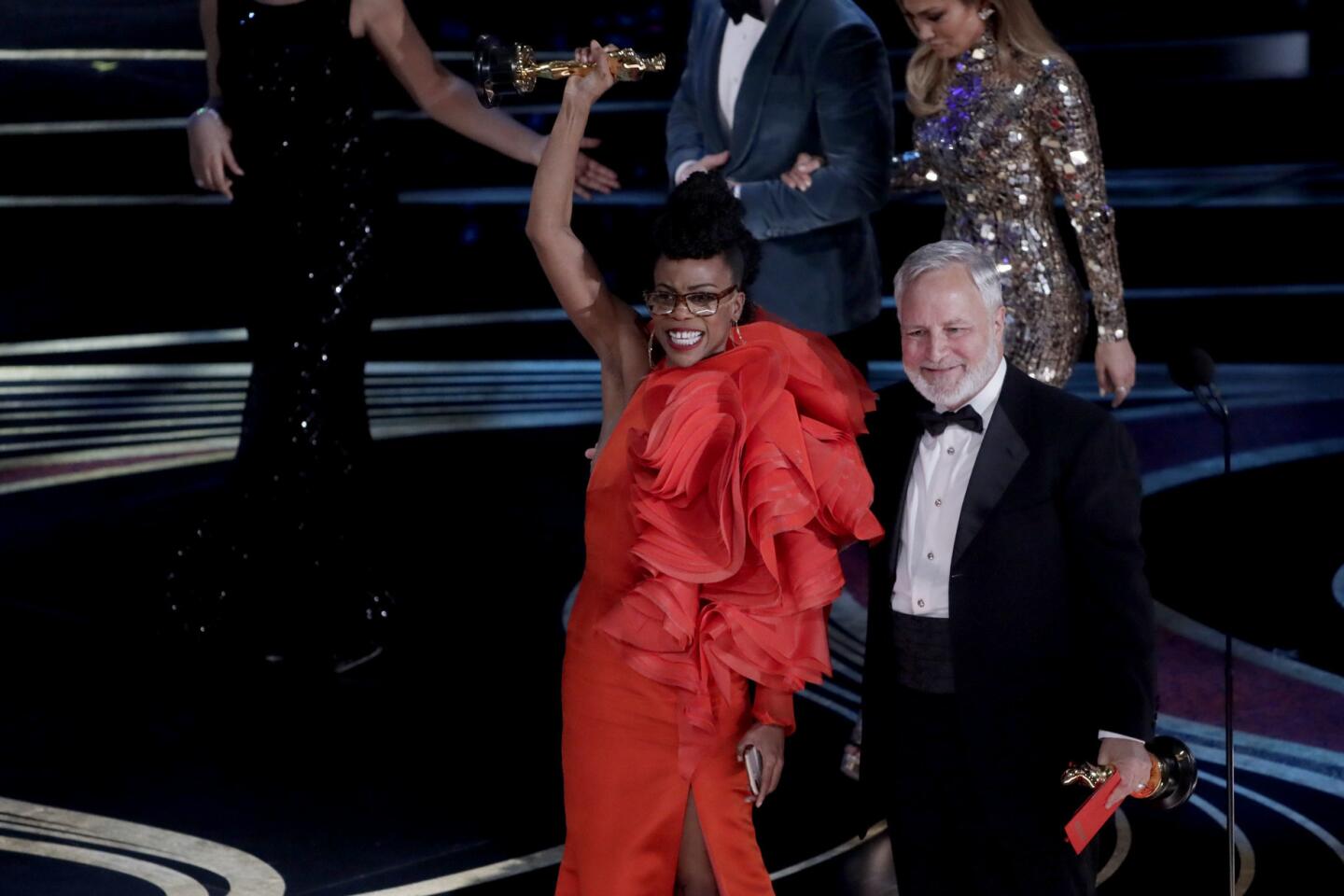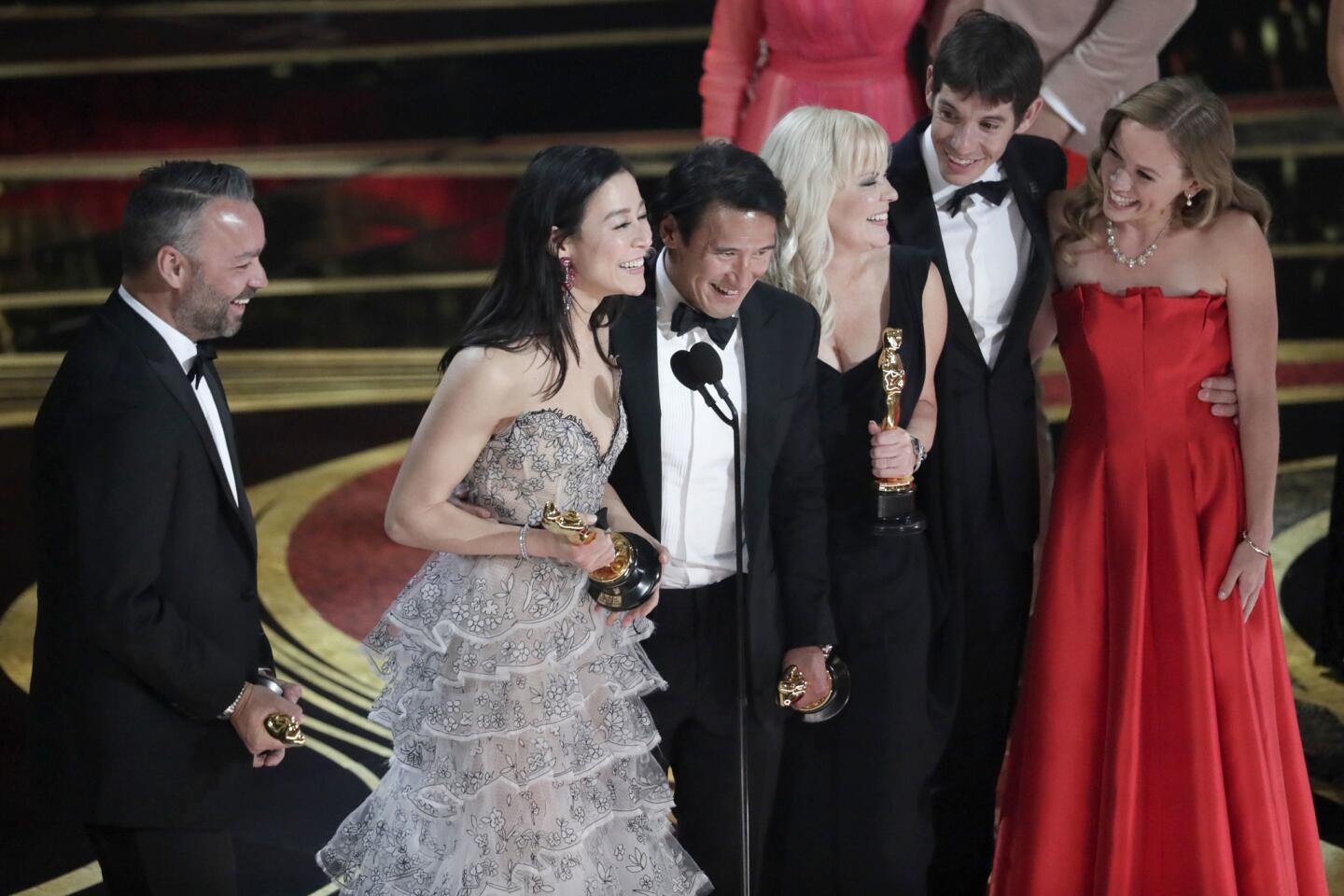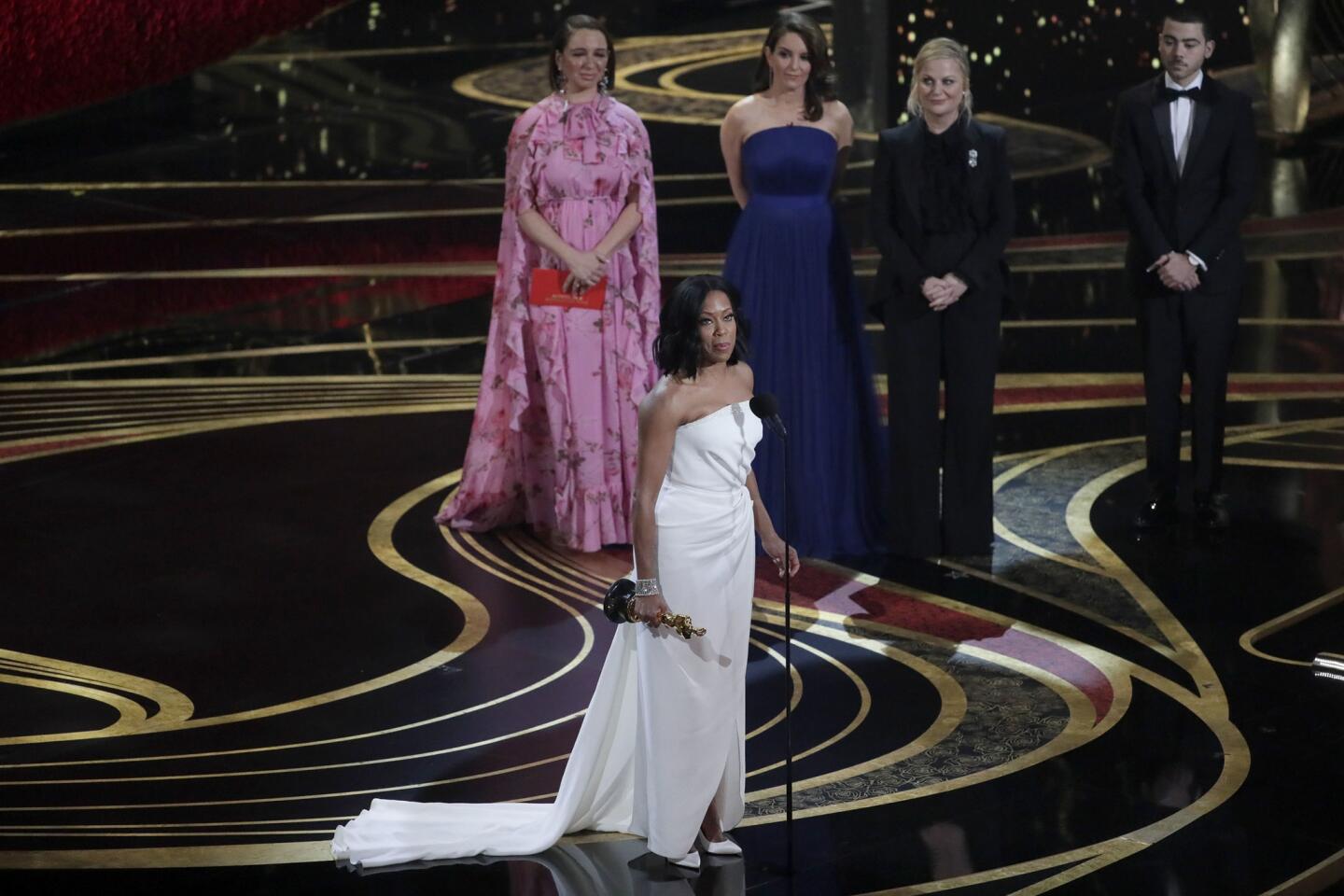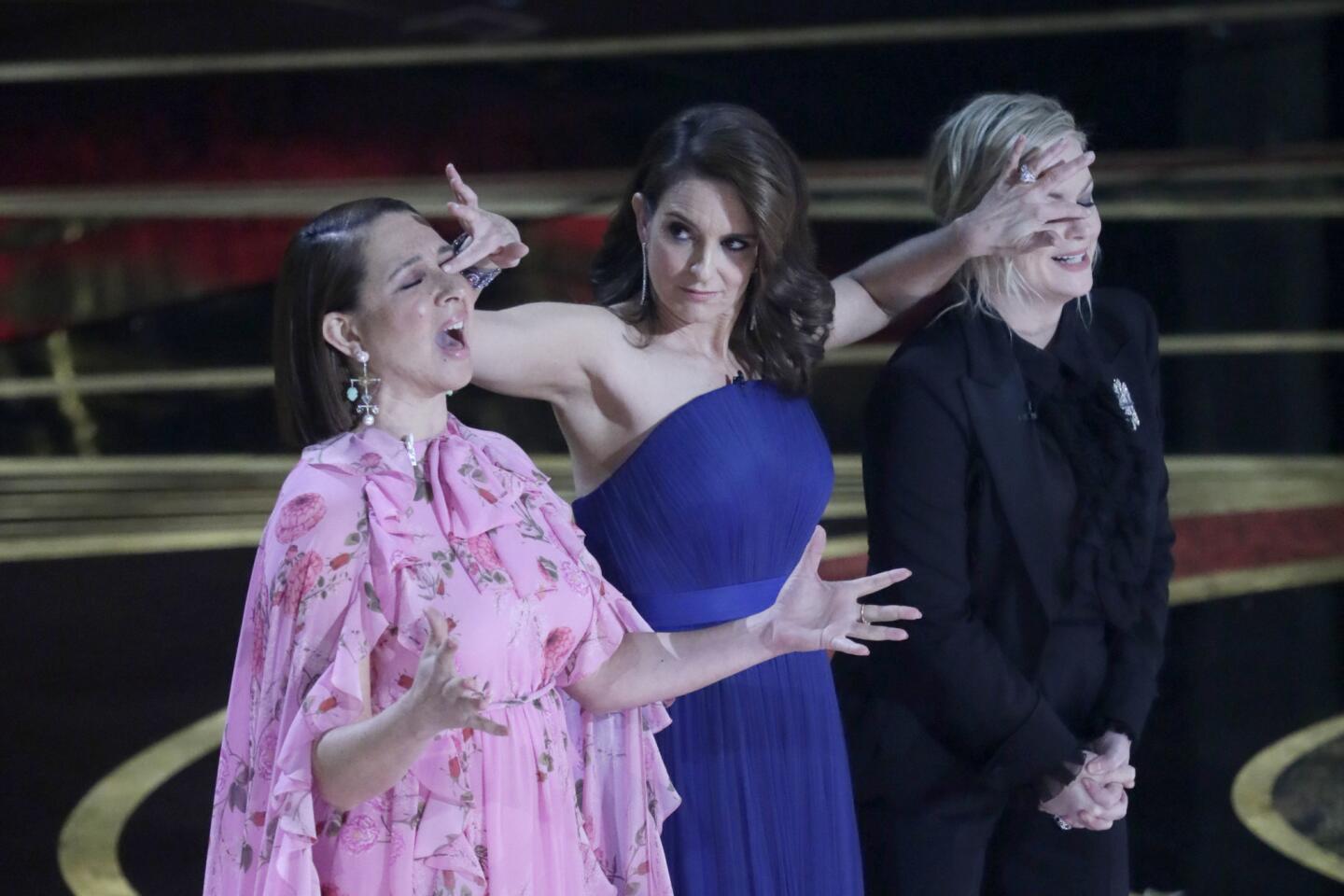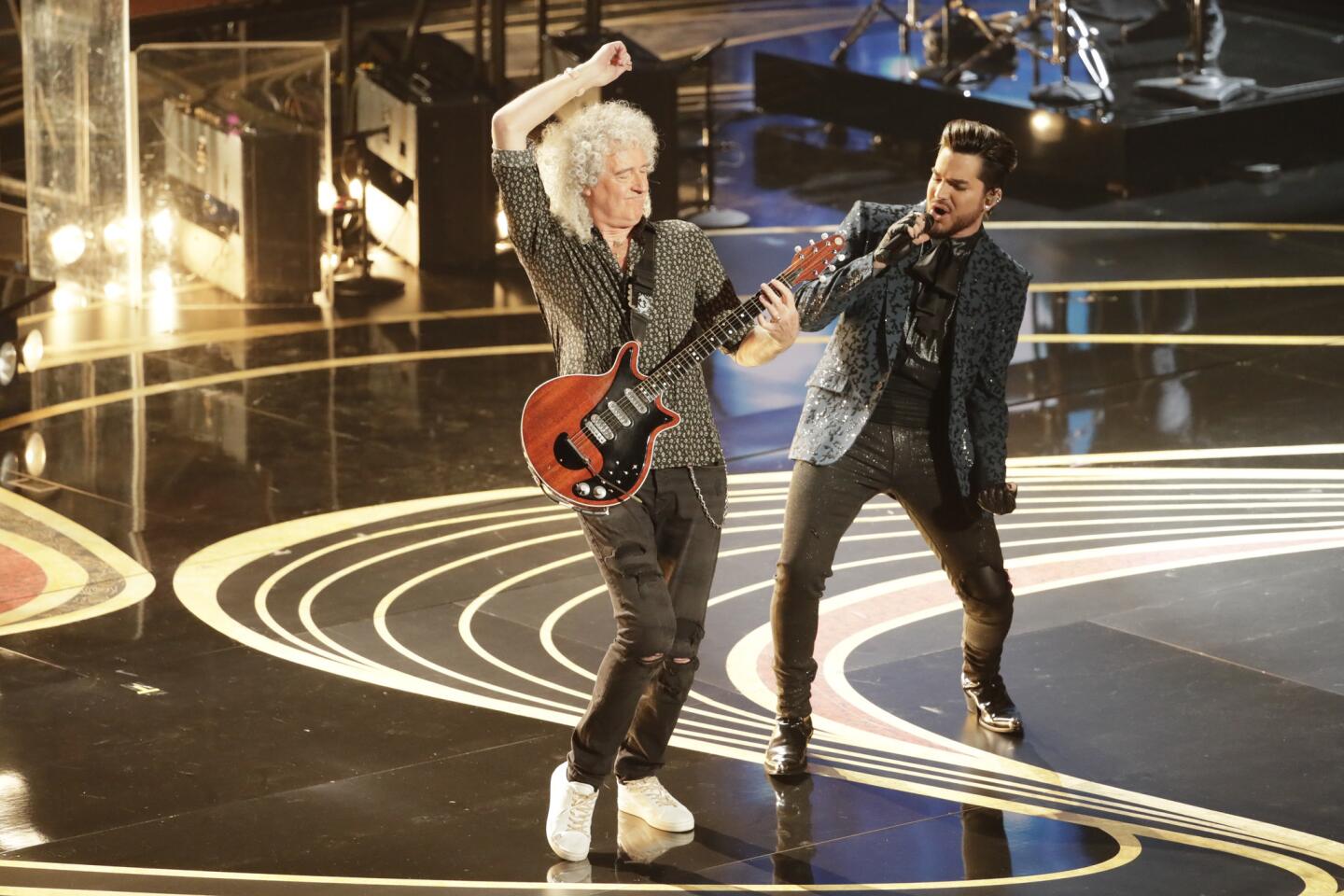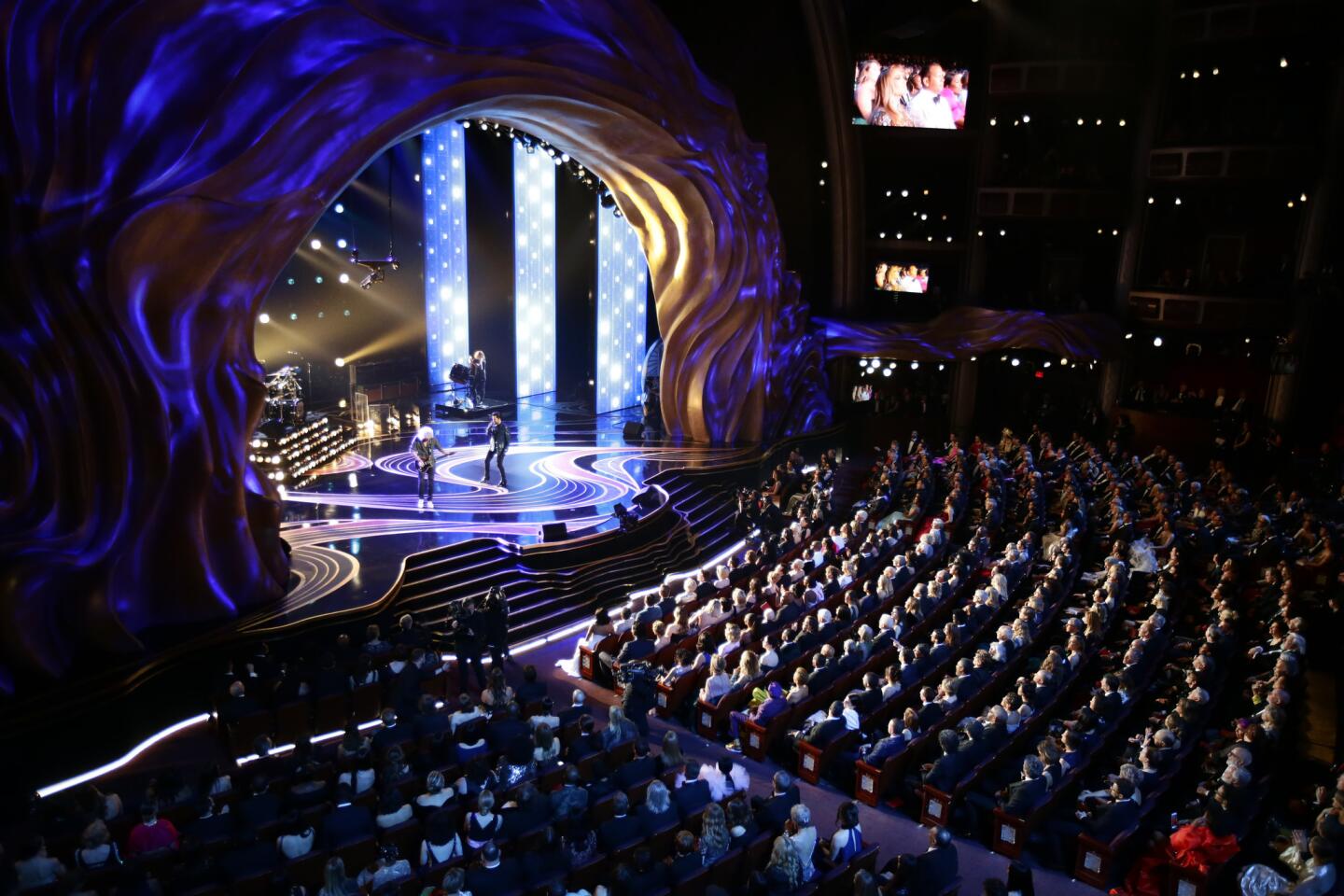Putting the final exclamation point on an unusually tumultuous and unpredictable Oscar season, “Green Book” — the period road movie about a black virtuoso pianist and his white chauffeur and bodyguard from director Peter Farrelly — claimed the top prize Sunday night at the 91st Academy Awards, beating out a diverse field of rivals ranging from the intimate, poetic “Roma” to the superhero smash “Black Panther” to the crowd-pleasing Freddie Mercury biopic “Bohemian Rhapsody.”
Heading into the night, the best picture race seemed unusually wide open, with no clear and sustained front-runner, and yet the win for “Green Book” was not entirely unexpected. In January, the film picked up the top prize at the Producers Guild Awards, an important bellwether, and in many ways, the feel-good movie had the trappings of an old-fashioned Oscar contender.
But on the way to its final victory, “Green Book” also had to overcome significant hurdles, including a sluggish start at the box office, dissent from some critics and moviegoers who found its racial politics outdated and simplistic as well as criticism from the family of pianist Don Shirley, who claimed the movie’s portrayal of him was “a symphony of lies.”
1/32
Jim Burke, Charles B. Wessler, Nick Vallelonga, Peter Farrelly and Brian Currie, winners of the best picture award for “Green Book.” (Allen J. Schaben / Los Angeles Times)
2/32
Rami Malek (lead actor), Olivia Coleman (lead actress), Regina King (supporting actress) and Mahershala Ali (supporting actor), winners in the Oscar acting categories. (Allen J. Schaben / Los Angeles Times)
3/32
Rami Malek, winner as lead actor for “Bohemian Rhapsody.” (Allen J. Schaben / Los Angeles Times)
4/32
Olivia Colman, winner of the lead actress Oscar for her role in “The Favourite.” (Allen J. Schaben / Los Angeles Times)
5/32
Nick Vallelonga, left, Peter Farrelly and Brian Currie, winners of the original screenplay award for “Green Book.” (Allen J. Schaben / Los Angeles Times)
6/32
Andrew Wyatt, left, Anthony Rossomando, Lady Gaga and Mark Ronson pose with the original song award for “Shallow” from the film “A Star Is Born.” (Allen J. Schaben / Los Angeles Times)
7/32
Andrew Wyatt, left, Anthony Rossomando, Lady Gaga and Mark Ronson, winners of the original song Oscar for “Shallow.” (Allen J. Schaben / Los Angeles Times)
8/32
An emotional Lady Gaga poses with the original song Oscar for “Shallow.” (Allen J. Schaben / Los Angeles Times)
9/32
Supporting actor winners Mahershala Ali and Regina King. (Allen J. Schaben / Los Angeles Times)
10/32
Producers David Rabinowitz, left, Kevin Willmott and Charlie Wachtel pose with the adapted screenplay award for “BlacKkKlansman.” (Allen J. Schaben / Los Angeles Times)
11/32
Alfonso Cuaron, winner of the director, foreign language film and cinematography Oscars for “Roma.” (Allen J. Schaben / Los Angeles Times)
12/32
Spike Lee, winner of the adapted screenplay award for “BlacKkKlansman.” (Allen J. Schaben / Los Angeles Times)
13/32
Mahershala Ali, winner of the supporting actor Oscar for “Green Book.” (Allen J. Schaben / Los Angeles Times)
14/32
Spike Lee, left, winner of the adapted screenplay Oscar, and Mahershala Ali, supporting actor winner for “Green Book.” (Allen J. Schaben / Los Angeles Times)
15/32
Ludwig Goransson, winner for the score in “Black Panther.” (Allen J. Schaben / Los Angeles Times)
16/32
Guy Nattiv and Jaime Ray Newman, winners of the Oscar for live action short film for “Skin.” (Allen J. Schaben / Los Angeles Times)
17/32
Guy Nattiv and Jaime Ray Newman, winners of the Oscar for live action short film for “Skin.” (Allen J. Schaben / Los Angeles Times)
18/32
Becky Neiman-Cobb, left, and Domee Shi, winners of the animated short film Oscar for “Bao.” (Allen J. Schaben / Los Angeles Times)
19/32
Melissa Berton, left, and Rayka Zehtabchi, winners of the live action short film award for “Period. End of Sentence.” (Allen J. Schaben / Los Angeles Times)
20/32
Ian Hunter, Tristan Myles, Paul Lambert and J.D. Schwalm, winners of of the visual effects award for “First Man.” (Allen J. Schaben / Los Angeles Times)
21/32
Ian Hunter, Tristan Myles, Paul Lambert and J.D. Schwalm, winners of of the visual rffects award for “First Man.” (Allen J. Schaben / Los Angeles Times)
22/32
Bob Persichetti, left, Peter Ramsey, Rodney Rothman, Phil Lord and Christopher Miller, winners of the animated feature film award for “Spider-Man: Into the Spider-Verse.” (Allen J. Schaben / Los Angeles Times)
23/32
Regina King, winner for supporting actress in “If Beale Street Could Talk.” (Allen J. Schaben / Los Angeles Times)
24/32
John Ottman, winner of the film editing Oscar for “Bohemian Rhapsody.” (Allen J. Schaben / Los Angeles Times)
25/32
Jay Hart and Hannah Beachler, winners in the production design category for “Black Panther.” (Allen J. Schaben / Los Angeles Times)
26/32
Jay Hart and Hannah Beachler, winners in the production design category for “Black Panther.” (Allen J. Schaben / Los Angeles Times)
27/32
Ruth Carter, winner of the costume design prize for “Black Panther.” (Allen J. Schaben / Los Angeles Times)
28/32
Ruth Carter, winner of the costume design prize for “Black Panther.” (Allen J. Schaben / Los Angeles Times)
29/32
Nina Hartstone and John Warhurst, winners of the sound editing award for “Bohemian Rhapsody.” (Allen J. Schaben / Los Angeles Times)
30/32
Paul Massey, from left, Tim Cavagin and John Casali, winners of the Oscar for sound mixing in “Bohemian Rhapsody.” (Allen J. Schaben / Los Angeles Times)
31/32
Greg Cannom, Kate Biscoe and Patricia Dehaney, winners of makeup and hairstyling for “Vice.” (Allen J. Schaben / Los Angeles Times)
32/32
Elizabeth Chai Vasarhelyi, Jimmy Chin, Evan Hayes and Shannon Dill, winners of the documentary feature prize for “Free Solo.” (Allen J. Schaben / Los Angeles Times)
FULL COVERAGE: 2019 Oscars »
In accepting the award, Farrelly said it was the film’s message of racial reconciliation that ultimately resonated with audiences and academy voters. “This whole story is about love,” Farrelly said. “It’s about loving each other despite our differences and finding out the truth about who we are: we’re the same people.”
In the run-up to the ceremony at the Dolby Theatre, many had expected Alfonso Cuarón’s “Roma” — which came into the night with 10 nominations, tied with the gonzo period dramedy “The Favourite” — to win Netflix its first ever best picture, a prize the streaming giant has long coveted. Netflix spent an estimated $25 million to $30 million promoting “Roma,” well in excess of the film’s $15 million production budget, blitzing Oscar voters with a carefully orchestrated campaign and breaking with precedent to give the film a three-week exclusive theatrical run.
But while “Roma” came away with three wins, including foreign language film and directing and cinematography for Cuarón, the first person ever to win in both categories, it ultimately fell short of the top prize — a sign perhaps of lingering resistance among academy voters to streaming, which many see as an existential threat to the traditional moviegoing experience.
“I want to thank the academy for recognizing a film centered around an indigenous woman, one of the 70 million domestic workers in the world … a character that historically had been relegated to the background in cinema,” Cuarón said, accepting the directing prize. “As artists, our job is to look where others don’t. This is much more important in times when we’re being encouraged to look away.”
1/21
Lady Gaga backstage at the 91st Academy Awards on Sunday. (Al Seib / Los Angeles Times)
2/21
Olivia Colman wins the best actress award for “The Favourite” and walks off stage with Frances McDormand and Sam Rockwell at the 91st Academy Awards on Sunday. (Al Seib / Los Angeles Times)
3/21
Composer Ludwig Göransson holds his award for original score for “Black Panther” backstage at the 91st Academy Awards on Sunday. (Al Seib / Los Angeles Times)
4/21
Lady Gaga backstage at the 91st Academy Awards on Sunday. (Al Seib / Los Angeles Times)
5/21
Rami Malek reacts after winning the lead actor award for “Bohemian Rhapsody” backstage at the 91st Academy Awards on Sunday. (Al Seib / Los Angeles Times)
6/21
Rami Malek wins best actor for “Bohemian Rhapsody” at the 91st Academy Awards on Sunday. (Al Seib / Los Angeles Times)
7/21
Spike Lee celebrates his adapted screenplay victory backstage at the 91st Academy Awards on Sunday. (Al Seib / Los Angeles Times)
8/21
Jaime Ray Newman is jubilant after winning the short film award for “Skin” at the 91st Academy Awards on Sunday. (Al Seib / Los Angeles Times)
9/21
A view from backstage of Bradley Cooper and Lady Gaga performing “Shallow” at the 91st Academy Awards on Sunday. (Al Seib / Los Angeles Times)
10/21
Presenters Michelle Yeoh and Pharrell Williams backstage. (Al Seib / Los Angeles Times)
11/21
Presenters Charlize Theron, Daniel Craig and Michael Keaton backstage at the Dolby Theatre. (Al Seib / Los Angeles Times)
12/21
Michelle Yeoh congratulates supporting actor winner Mahershala Ali backstage at the Academy Awards. (Al Seib / Los Angeles Times)
13/21
Supporting actor winner Mahershala Ali backstage at the 91st Academy Awards. (Al Seib / Los Angeles Times)
14/21
Alfonso Cuarón, after his win for foreign-language film, is accompanied offstage by presenter Angela Bassett. (Al Seib / Los Angeles Times)
15/21
Presenters James McAvoy and Danai Gurira backstage at the 91st Academy Awards. (Al Seib / Los Angeles Times)
16/21
Hannah Beachler, winner of the production design Oscar for “Black Panther,” arrives backstage at the Dolby Theatre. (Al Seib / Los Angeles Times)
17/21
Presenters Javier Bardem, left, and Angela Bassett accompany Alfonso Cuarón after his win for foreign-language film. (Al Seib / Los Angeles Times)
18/21
Regina King, supporting actress winner for “If Beale Street Could Talk,” arrives backstage at the 91st Academy Awards. (Al Seib / Los Angeles Times)
19/21
Presenters Jason Momoa and Helen Mirren chat with Alex Honnold, subject of the winning documentary feature, “Free Solo,” backstage at the Oscars. (Al Seib / Los Angeles Times)
20/21
Jimmy Chin and Elizabeth Chai Vasarhelyi, co-directors of the feature documentary “Free Solo,” carry their Oscars offstage at the 91st Academy Awards. (Al Seib / Los Angeles Times)
21/21
Presenter Melissa McCarthy gets a makeup touch-up backstage before heading onstage to hand out the award for costume design. (Al Seib / Los Angeles Times)
2019 Oscars: See the full list of winners and nominees »
In a year that saw each major guild award leading up to the Oscars go to a different film, Oscar voters seemed similarly torn in their affections, spreading major awards among different contenders.
Rami Malek, who swept virtually every major acting prize leading up to the Oscars, won the lead actor prize for his turn as Mercury in “Bohemian Rhapsody,” one of four awards earned by the hit biopic. (Neither Malek nor any of the film’s other honorees mentioned its disgraced credited director, Bryan Singer, who was fired from the project during production and has faced charges of sexual misconduct, which he has denied.)
“To anyone struggling with their [identity] and trying to discover their voice, we made a film about a gay man and immigrant who lived his life just unapologetically himself,” Malek said, nodding to the fact that he is the child of Egyptian immigrants. “The fact that I’m celebrating him and this story with you tonight is proof that we’re longing for stories like this.”
In one of the evening’s bigger surprises, Olivia Colman won the lead actress award for her turn as the insecure, demanding Queen Anne in “The Favourite,” coming out on top in a strong field that included seven-time nominee Glenn Close, who many expected to finally win her first Oscar for “The Wife.” “Glenn Close, you’ve been my idol for so long, and this is not how I wanted it to be, and I think you’re amazing,” Colman said.
Regina King won the prize for supporting actress for her role in the James Baldwin adaptation “If Beale Street Could Talk.” Mahershala Ali won his second supporting actor award for playing Shirley in “Green Book,” which also picked up the award for original screenplay.
“BlacKkKlansman” earned the adapted screenplay award, giving Spike Lee — who was also nominated for directing — his first competitive Oscar. (The Academy did present him with an honorary award in 2015.)
“The 2020 presidential election is around the corner,” Lee said in the night’s most pointedly political speech. “Let’s all mobilize. Let’s be on the right side of history, make the moral choice of love versus hate. Let’s do the right thing.”
Oscars: ‘Green Book’ is the worst best picture winner since ‘Crash’ »
Heading into this year’s ceremony, many longtime Oscar watchers felt a higher than usual degree of suspense, both because of the relatively wide-open best picture race and because, for the first time in 30 years, the telecast had no formal host. Kevin Hart dropped out in December just days after he was announced as host amid controversy over past homophobic jokes, leaving empty a gig that was once highly coveted but is now widely considered thankless.
Following an opening performance from Queen of their hits “We Will Rock You” and “We Are the Champions” and a montage of inspirational quotes from this year’s movies, Tina Fey, Amy Poehler and Maya Rudolph immediately addressed the elephant in the room, while also tweaking some of the other controversies that have loomed over this awards season, academy-generated and otherwise.
“Just a quick update, in case you’re confused: There is no host tonight,” Rudolph said. “There won’t be a popular movie category. And Mexico is not paying for the wall.” The three then trotted out jokes they would have made had they hosted the show. (“‘Roma’ is on Netflix? What’s next, my microwave makes a movie?” Fey cracked.)
Indeed, the host debacle was just one in a string of public-relations crises for the motion picture academy that roiled this entire awards season, much as the #OscarsSoWhite firestorm had in 2016.
In September, the academy’s leadership shelved a proposed “best popular film” Oscar amid criticism that it represented an act of pandering to boost the show’s steadily sagging ratings, which hit an all-time low last year. Then just days before the ceremony, following an intense outcry from many of the group’s most prominent members, the academy scrapped a plan to present four awards — cinematography, editing, live action short, hairstyling and makeup — during commercial breaks in a bid to shave precious minutes off the often bloated telecast.
1/30
Director Peter Farrelly, center, and the cast of “Green Book” as they win Best Picture during the telecast of the 91st Academy Awards on Sunday.
(Robert Gauthier / Los Angeles Times) 2/30
Viggo Mortensen and the cast of the Green Book react during the telecast of the 91st Academy Awards on Sunday.
(Robert Gauthier / Los Angeles Times) 3/30
Mahershala Ali, center-left, and Viggo Mortensen celebrate the best picture win for “Green Book” during the telecast of the 91st Academy Awards on Sunday.
(Robert Gauthier / Los Angeles Times) 4/30
Olivia Colman is kissed by her husband, Ed Sinclair, as she is announced as lead actress winner for “The Favourite” during the telecast of the 91st Academy Awards on Sunday.
(Robert Gauthier / Los Angeles Times) 5/30
Rami Malek embraces costar Lucy Boynton after winning the Oscar for actor in a leading role for “Bohemian Rhapsody.”
(Robert Gauthier / Los Angeles Times) 6/30
Barbra Streisand speaks onstage at the Dolby Theatre during the 91st Academy Awards on Sunday.
(Robert Gauthier / Los Angeles Times) 7/30
Lady Gaga reacts after winning the Oscar for best original song for “Shallow” from “A Star Is Born” at the 91st Academy Awards on Sunday.
(Robert Gauthier / Los Angeles Times) 8/30
Spike Lee accepts the adapted screenplay award for “BlacKkKlansman” during the telecast of the 91st Academy Awards on Sunday.
(Robert Gauthier / Los Angeles Times) 9/30
Spike Lee enthusiastically accepts the adapted screenplay award for “BlacKkKlansman” from Samuel L. Jackson and Brie Larson during the telecast of the 91st Academy Awards on Sunday.
(Robert Gauthier / Los Angeles Times) 10/30
Husband-and-wife team Jaime Ray Newman and Guy Native win the Oscar for live action short film at the 91st Academy Awards on Sunday.
(Robert Gauthier / Los Angeles Times) 11/30
Lady Gaga and Bradley Cooper perform “Shallow” from “A Star Is Born” during the 91st Academy Awards on Sunday.
(Robert Gauthier / Los Angeles Times) 12/30
Lady Gaga and Bradley Cooper perform “Shallow” from “A Star Is Born” during the 91st Academy Awards on Sunday.
(Robert Gauthier / Los Angeles Times) 13/30
Melissa Berton, center left, and Rayka Zehtabchi accept the award for documentary short for “Period. End Of Sentence” during the 91st Academy Awards on Sunday.
(Robert Gauthier / Los Angeles Times) 14/30
Mike Meyer and Dana Carvey introduce “Bohemian Rhapsody” during the telecast of the 91st Academy Awards on Sunday.
(Robert Gauthier / Los Angeles Times) 15/30
Hannah Beachler celebrates her win for production design during the 91st Academy Awards on Sunday.
(Robert Gauthier / Los Angeles Times) 16/30
Mahershala Ali, winner of the Oscar for actor in a supporting role, shakes hands with fellow nominee Sam Elliott during the 91st Academy Awards on Sunday.
(Robert Gauthier / Los Angeles Times) 17/30
Bette Midler waves to the crowd after performing “The Place Where Lost Things Go” during the 91st Academy Awards on Sunday.
(Robert Gauthier / Los Angeles Times) 18/30
Keegan-Michael Key drops in from above during the telecast of the 91st Academy Awards on Sunday.
(Robert Gauthier / Los Angeles Times) 19/30
Jennifer Hudson performs original song nominee “I’ll Fight” during the telecast of the 91st Academy Awards.
(Robert Gauthier / Los Angeles Times) 20/30
Nina Hartstone, Oscar winner for sound editing, embraces Queen guitarist Brian May during the 91st Academy Awards at the Dolby Theatre.
(Robert Gauthier / Los Angeles Times) 21/30
John Warhurst and Nina Hartstone accept the Oscar for sound editing for “Bohemian Rhapsody” during the 91st Academy Awards.
(Robert Gauthier / Los Angeles Times) 22/30
Hannah Beachler greets Spike Lee, center, during the 91st Academy Awards on Sunday in the Dolby Theatre.
(Robert Gauthier / Los Angeles Times) 23/30
Stephan James and Elsie Fisher during the telecast of the 91st Academy Awards.
(Robert Gauthier / Los Angeles Times) 24/30
Ruth E. Carter accepts the Oscar for costume design for “Black Panther” during the 91st Academy Awards.
(Robert Gauthier / Los Angeles Times) 25/30
Hannah Beachler and Jay R. Hart accept the Oscar for production design for “Black Panther” at the 91st Academy Awards.
(Robert Gauthier / Los Angeles Times) 26/30
Evan Hayes, left, Elizabeth Chai Vasarhelyi, Jimmy Chin, Shannon Dill, Alex Honnold and Sanni McCandless onstage to accept the Oscar for documentary feature for “Free Solo” at the 91st Academy Awards.
(Robert Gauthier / Los Angeles Times) 27/30
Regina King, front, accepts the Oscar for actress in a supporting role as presenters Maya Rudolph, Tina Fey and Amy Poehler watch onstage at the Dolby Theatre.
(Robert Gauthier / Los Angeles Times) 28/30
Maya Rudolph, Tina Fey and Amy Poehler during the telecast of the 91st Academy Awards on Sunday.
(Robert Gauthier / Los Angeles Times) 29/30
Brian May and Adam Lambert during Queen’s performance to open the telecast of the 91st Academy Awards on Sunday.
(Robert Gauthier / Los Angeles Times) 30/30
Queen performs to open the telecast of the 91st Academy Awards.
(Robert Gauthier / Los Angeles Times) “We won’t be doing awards during the commercials, but we will be presenting commercials during the awards,” Poehler joked. “So if all the winners could please say, ‘Hellmann’s mayonnaise: We’re on the side of food,’ instead of speeches, that would be great.”
The last time the Oscars went without a host, in 1989, the show was widely regarded as a debacle, featuring infamous musical numbers including one pairing Rob Lowe and an actress dressed as Snow White. But while some may have tuned in to this year’s show anticipating a similar sort of train wreck, the ceremony unfolded without any major hiccups and at what seemed to be a determinedly brisk pace.
Though the academy had vowed in August to hold the show to three hours, it ultimately clocked in at three hours and 17 minutes — far less than the nearly four hours that last year’s show ran.
In the absence of a formal host, the ceremony leaned into the star power of unexpected presenters such as Serena Williams and Trevor Noah, who introduced “A Star Is Born” and “Black Panther,” respectively, and performances of the original song nominees from the likes of Jennifer Hudson, Bette Midler and Lady Gaga, who shared the best song prize for “Shallow” in what would be the night’s only win for “A Star Is Born.”
The kind of comedy shtick that would have normally come from a host was delivered instead by presenters such as Keegan-Michael Key, who descended from the rafters holding an umbrella a la Mary Poppins, and Melissa McCarthy and Brian Tyree Henry, who introduced the costume category wearing absurdly over-the-top outfits stuffed with references to the nominated films.
Along with the academy’s stumbles, issues of representation once again loomed large over this year’s awards season, and on that score, this year’s Oscars presented a number of firsts. Hannah Beachler and Ruth Carter became the first African Americans to win the awards for production design and costume design, respectively, for their work in “Black Panther.” “Spider-Man: Into the Spider-Verse” co-director Peter Ramsey became the first African American to win an Oscar for animated feature film.
Though no women were nominated this year in the directing category — a stark contrast with Film Independent’s Spirit Awards, in which three of the five directing nominees were women — female filmmakers made a strong showing in the animated short (“Bao”), documentary short subject (“Period. End of Sentence.”), live-action short (“Skin”) and documentary feature (“Free Solo”) categories.
Accepting her award with one of the night’s more emotional speeches, Beachler offered encouragement to those who would come after her — and, in a way, delivered what could have been a summation for this year’s Oscars as a whole, with all the bumps along the road leading up to it.
“I give this strength to all of those who come next,” Beachler said. “To keep going and never give up, and when you think it’s impossible, just remember to say this piece of advice I got from a very wise woman: ‘I did my best, and my best is good enough.’”
From Lady Gaga and Bradley Cooper singing to a ‘Wayne’s World’ reunion, these are the highlights from the 2019 Academy Awards.
[email protected]
Twitter: @joshrottenberg


